
- Career Advice
- Salary Guide
- Dockwalk Presents
- Digital Dockwalk

How to Get a Job as a Yacht Captain

Kate got her start in the yachting industry working as crew. She spent five years cruising the Bahamas, Caribbean, New England, and Central America, then segued that experience into a career in marine journalism, including stints as editor of Dockwalk and ShowBoats International .
The role of a captain is cut out for those with a deep love of the sea and who don't shy away from responsibility. If you’re an experienced first mate or a bosun itching to take the helm, here’s everything you will need to become a yacht captain...
The most common path to a yacht’s wheelhouse is by rising through the ranks in the yachting industry, starting on deck and building sea time, gaining boat handling and geographical experience, and accruing licenses. But even after the golden ticket is earned — that 500GT or 3,000GT Master license — you’ll find there is more to getting the job than the piece of paper. Most rising crew will get the ticket before they are ready to assume the responsibility. Here is what crew agents and yacht owners have to say about what it takes to be a superyacht captain...
What is a Yacht Captain?
Simply put, a captain runs the vessel, in some ways like a CEO runs a business. He or she shoulders all the responsibility on board and reports directly to the owner or their representative. “The successful captains are all excellent leaders, able to set a common goal for their crew, and ensure motivation despite arduous seasons and long hours,” says Deborah Blazy, who, as general manager of Lighthouse Careers in Valbonne, France (near Antibes), specializes in placing captains. “Important character traits are to remain calm at all times but also to have the right sprinkle of charisma to keep crew morale and standards high.”
What Does a Yacht Captain do?
Driving the boat is just a small part of a captain’s job — many say the easiest part. Captains also hire and manage all other crew on board, plan and execute voyages around the owner’s and charter guests’ expectations, organize repairs and maintenance, control costs, and adhere to all international, flag, and port state regulations — all while providing personable, first-class service, and maintaining the highest levels of safety.
So the role requires a captain to be much more than a navigator; he or she is also part project manager, accountant, mechanic, human resources manager, concierge, and, most of all, chief problem solver. As Blazy puts it, they should have knowledge of the perfect anchorage, but also “have a direct dial to the most prestigious restaurants and be able to book the prime tables last minute.”
On smaller vessels, the captain will pitch in to assist in all roles on board, from changing the oil to washing the dishes. On larger yachts it is much more of an administrative position.
- M/Y Artefact: On Board with Capt. Aaron Clark
What Qualifications Do I Need to Become a Yacht Captain?
The captain must hold a license that is commensurate with the gross tonnage of the vessel and approved by the flag state. In addition, the yacht’s insurance company needs to be comfortable with the candidate’s experience and license and approve the hire. This is understandable when you consider that the underwriter is the biggest financial stakeholder in the vessel — on the hook for the cost of repairs or settlement if the captain makes a mistake.
Here are the licenses you will need to hold to become a yacht captain:
Vessels < 200GT
- RYA Yachtmaster Offshore (with Commercial Endorsement)
- or RYA Ocean Certificate of Competence (with Commercial Endorsement)
- or IYT Master of Yachts < 200T
- or MCA STCW Master (Yachts) < 200GT
- or USCG Operator Uninspected Passenger Vessel License (OUPV/Six-Pack) < 100GT (U.S. Green Card holders can apply)
- or USCG Master Inland/Near Coastal < 100GT (U.S. citizens only)
- or USCG Master 200 Ton Oceans (U.S. citizens only)
Vessels < 500GT
- MCA STCW Master (Yachts) < 500GT Certificate of Competence
- or USCG Master 500 Oceans or Near Coastal (U.S. citizens only)
Vessels < 3000GT
- MCA STCW Master (Yachts) < 3000GT Certificate of Competence
- or MCA Merchant Navy STCW Master < 3000GT
- or USCG Master 1600GT (U.S. citizens only)
- or USCG Master 3000GT (U.S. citizens only)
Vessels > 3000GT
- MCA STCW Master (Unlimited)
- or USCG Master Unlimited Oceans or Near Coastal (U.S. citizens only)
- or Marshall Islands Master of Yachts Unlimited
When it comes to the USCG licensing, Capt. Ted Morley, chief operations officer of Maritime Professional Training (MPT) , notes that it’s “important to make the distinction regarding charter vessels, ocean routes versus coastal, and the number of passengers on board. The waters get murky when you talk about some of the other requirements — such as PSCRB for yachts with lifeboats, DP for vessels that are equipped, ECDIS, ARPA, and a host of other specialty requirements that many Flag and Port states will require of masters on vessels in particular service, areas, or equipment.”
What Experience Do I Need?
“I think a lot of mates with about five years of demanding sea experience and good work habits have the ability to be great captains,” says one owner, who has three large yachts.
The most important experience is time on yachts, as opposed to other types of vessels. “We have very little luck with a captain looking to join a yacht with zero yachting experience,” says Ian Pelham, director of Preferred Crew, a crew agency in Fort Lauderdale.
The yachting industry is quirky and far removed from the predictability of the commercial world. Pelham gives the example of a cruise ship, as he once ran a fleet personnel department for a cruise line: “A captain on a cruise ship has a number of perks, including a cabin steward who cleans the personal space of the captain, there will be mess stewards who will serve and clean up the crew areas for the officers. Generally there is solid rotation — you know exactly when you are to join and when you heading on vacation. When on vacation you do not get calls from the owner asking where you put the ‘good’ whisky when the cousins were aboard. On a yacht, even the big ones, the captain has to be ready to step in at any level, including cleaning up, to make sure the owner has a great time. Most commercial captains just have not had that kind of experience.”
Blazy adds, “[A commercial captain’s] experience is often best suited to the Passenger Code vessels over 3,000GT, where the duties and working conditions in terms of rotation are often similar. There is, however, a huge learning curve in terms of standards and customer expectations.” She recommends these captains gain experience on yachts before assuming the top role. “For the more junior candidates who are happy to start again from the lower ranks on board the yachts there is a big advantage; often they are bringing great transferable skills and relatively high tickets for the deck teams, and so are able to climb the ranks rapidly. Those with the ability to be flexible in terms of outlook and approach will always do well,” she says.
- The Best Superyacht Wheelhouses in the Business
What Do Owners Want?
“Owners are generally looking for someone who will give them the ultimate holiday experience while making them feel safe on board,” Blazy says.
When it comes to specifics though, each owner will want a captain that precisely fits with their vessel size and itinerary. “Different programs call for different personalities,” Pelham says. “I have seen captains who are extroverts, introverts, confrontational, compromising, joyful, serious, etc., who have each been very successful in their individual programs. I also believe that this is part of what makes a captain a fantastic fit for one program and a complete miss on another.”
Despite being some of the wealthiest people on the planet, most yacht owners care deeply about the costs, so financial accountability is a big part of being a successful captain.
“It’s a big responsibility for the captain to take care of the owner’s large asset. Good common sense is required,” says one large-yacht owner. “Fuel costs and dockage fees need constant awareness. Transiting the yacht at 12 knots instead of 22 knots from Nassau to Lauderdale protects the owner’s assets. Of course there are some owners who just don’t care about costs, but a majority do!”
This owner also expects his captain to spend time in the yard with the yacht, not consider it vacation time, in order to keep track of the yard’s billable hours, and to have some good mechanical knowledge so they can “withstand the salesmen/ consultants suggestions about replacing everything on your yacht.”
- M/Y Florentia: On Board with Capt. Andrea Franci
How Much Does a Captain Earn?
With the stress of responsibility comes monetary reward. A captain can earn an excellent salary, with longevity and vessel size generally having the biggest influence on just how excellent that salary is. But just as the yachting industry is unique, so is each boat and what it pays.
“(There is) no such thing as average, or industry standard,” maintains Pelham. “My team has placed a captain on a 35-meter paying more than $20,000 per month, day one, and on a 100-meter paying about $8,000 per month, day one. I know of captains earning around $4,000 per month and I know of at least one couple earning $30,000. The pay of the captain is completely dependent on what the owner and the captain both believe it is worth.”
Dockwalk’s Salary Survey does give some good guidelines though. In its most recent 2021 survey, crew agencies provided a range of salaries, from the low end on vessels below 80 feet: $5,000 to $10,000 per month; to the largest vessels over 280 feet: $23,000 to $28,000 per month. Numerous captains working on yachts from 60 to 179 feet also shared their salaries and the average from their responses in each vessel size category fell right in the middle of the range given by the agencies.
What is the Best Way to Land that First Position?
“Finding your first captain role is no easy task. There is always the stigma attached that you have not done it before and so are you capable?” Blazy says.
Pelham seconds this: “Our clients love to see that the captain has already done what they want them to do next. If the yacht is 50 meters, they want to see 50 meters on the CV. If they are planning a circumnavigation, they want to see a circumnavigation in their history,” he says.
- Where Next? Career Advancement for Yacht Captains
Of course, that isn’t good news for anyone looking for his or her first captain role. Pelham recommends emphasizing the experience on your resume that matches where you want to be. “Think about what you did as a mate on your previous yachts. Then pick those things that you will be doing as a captain on your next yacht, and highlight those aspects,” he says.
Blazy says the most common path on the bigger yachts is when the chief officer grows into the junior captain role, “moving forward steadily in terms of drive time and responsibility, covering for the senior captain while he is away. There is a mix of confidence and humility that is at play, and the timing will depend on the individual person and the owner’s expectations.”
- Join the Captains' Club
More from Dockwalk
Most popular on dockwalk.

How to Get Your Captain’s License –A Step-by-Step Guide
From captain requirements to the coast guard application process – how to navigate the process of becoming an official boat captain.

Like all other areas of professional endeavor, getting a Captain’s license is an essential and non-trivial process. Despite the years between my earliest thoughts on having one and actually applying…or perhaps because of that time…I am quite proud to call myself Captain !
From the time I was Quartermaster aboard the Chesapeake Lightship back when she was berthed in Washington, DC, I had wanted to get my Captain’s license. We in her crew had plenty of sea time. The late Capt. Joe Murray, John Hart, and particularly Chris Krusa saw to it that each of us developed our skills and knowledge beyond the minimum that we needed for our jobs. We met collectively with a Coast Guard officer to explore the options for us all getting licensed; however, the wind was taken out of our sails so to speak when he told us that since most of us were not 18, we were not entitled to take the written exam.
I left that session crestfallen but I put it all behind me as I moved on with a career in research physics. Later, I learned that what the officer SHOULD have said is that if we had just waited (a few months) until we turned 18, we could have taken the exams. Years later, my problem was that I could not meet the requirement to have 90 days of sea time in the last 3 years. My employer would have more than frowned on my having been gone so often. And all of us had not even bothered to ask for sea service forms or letters to document our time on the Chesapeake.
Fast forward 34 years and serendipitous events led to my being able to get signed sea service forms for my time on the Lightship. Shortly thereafter, I became a boat owner WITH vacation time afforded to a very senior engineer in the company.
Long story short, I am Capt. Rob Chichester – 200 Ton Master with Auxiliary Sail and Assistance Towing Endorsements.
Navigating the path to a Captain’s license can be full of the brambles of regulations, forms, and oddly worded requirements. In this article, I will try to clarify the process and help interested skippers decide what type of license, scope, and tonnage they should pursue. Then I will discuss the application process and all the elements needed to assemble a successful license application package.
More Resources: If you would like a one-on-one consultation to have your specific questions answered on this topic or others related to boating, please sign up for 30 minute video consultation with me!
Trending Now: Custom Boat Life Gear
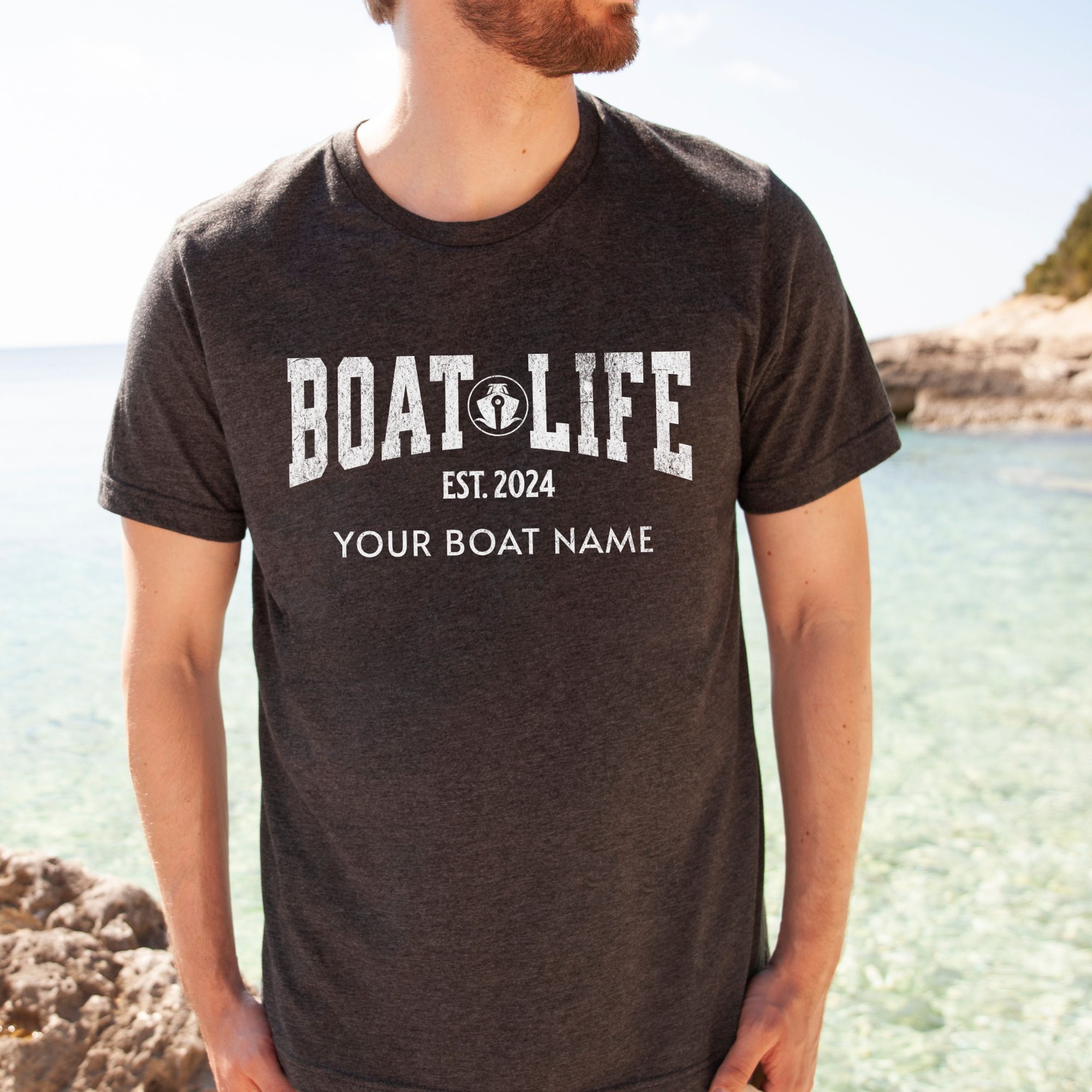
Boat Life Custom Boat Name & Est Year T-Shirt
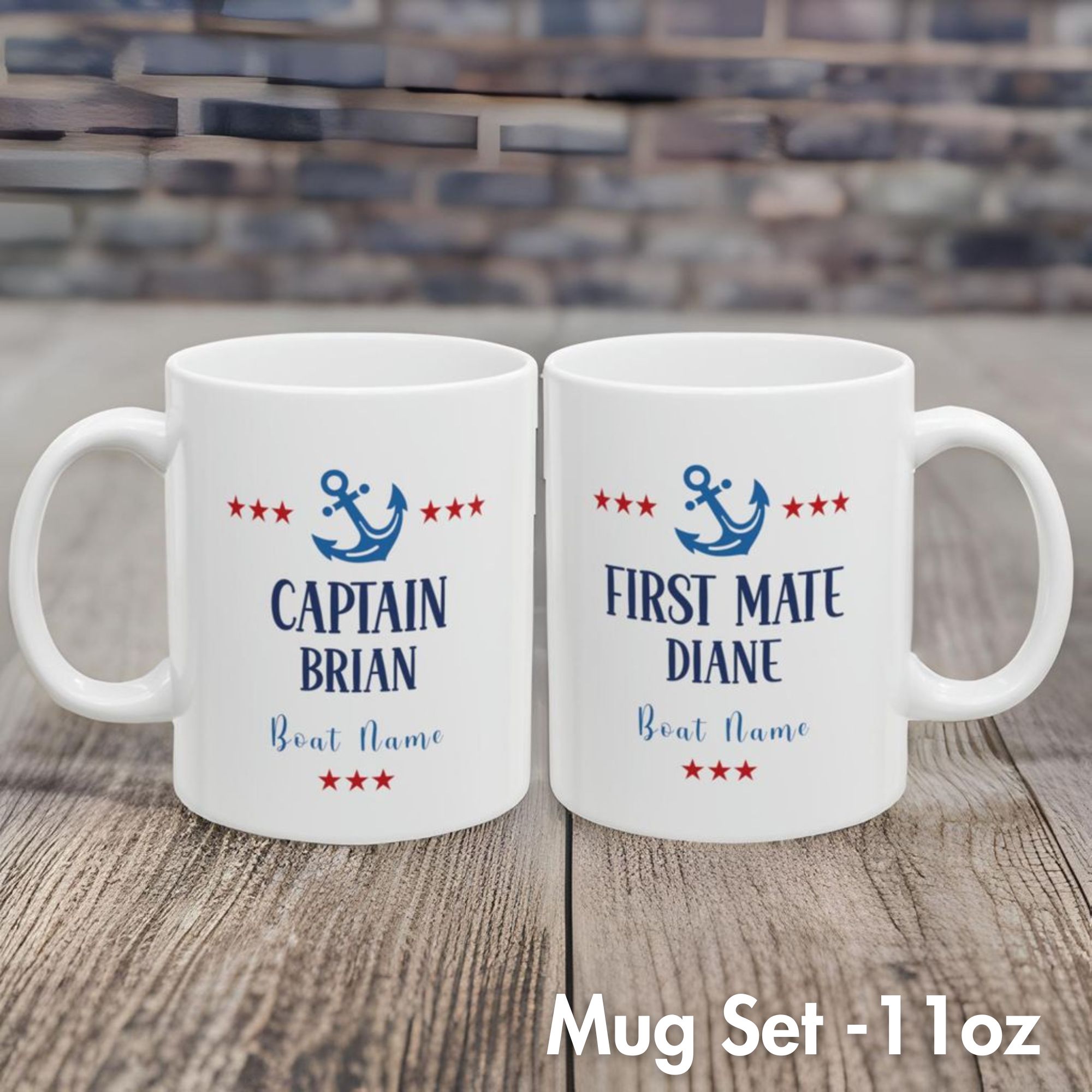
Custom Captain & First Mate Boat Name Mugs
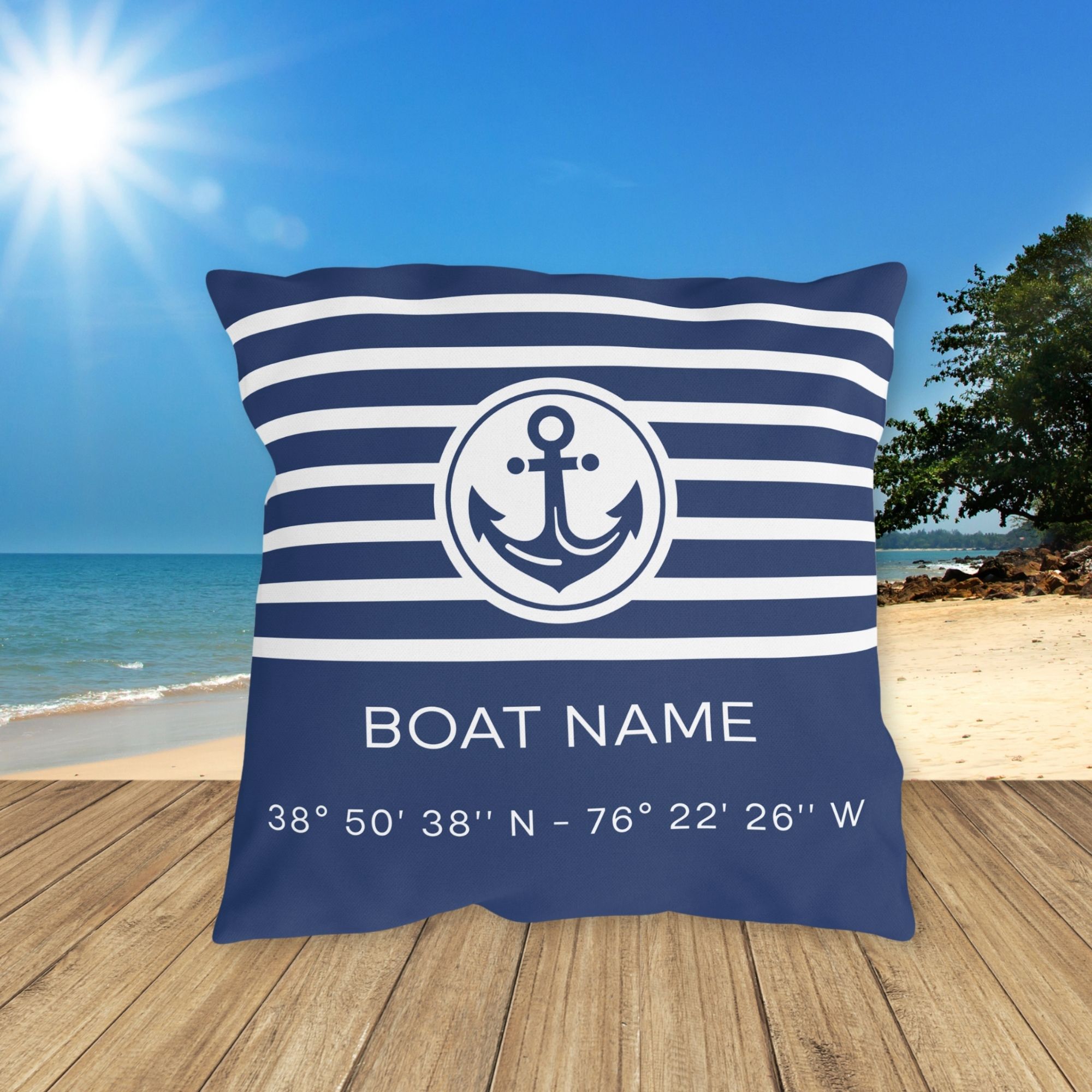
Boat Pillow with Boat Name & LAT LONG Coordinates
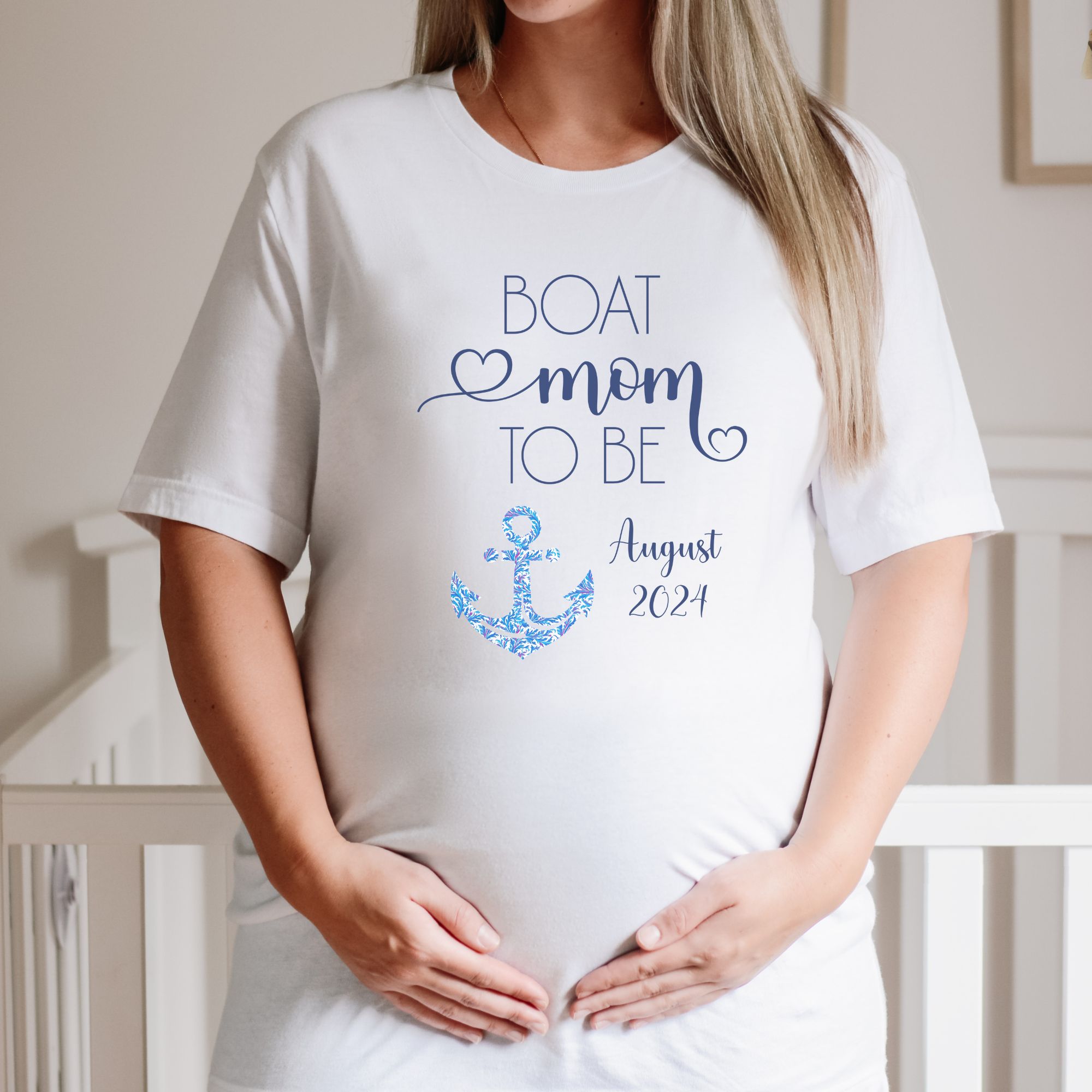
Pregnant Boat Mom To-Be Custom Shirt
The basics of a captain’s license.
A first time applicant will need to decide while type of license to pursue. There are two types available to one applying for a new license.
- You may apply for a license to be an Operator of Uninspected Passenger Vessel (OUPV) or the more familiar “Six Pack” license. It is so called because the holder of this license is limited to carrying no more than 6 paying passengers on any vessel within his tonnage rating regardless of the maximum capacity rating for the vessel.
- The other option is a Master’s license which allows you to carry up to the maximum number of passengers indicated for the vessel in question. Whereas a Master’s license requires US Citizenship, an OUPV license holder can be non-US citizen. Clearly holding a Master’s license offers more opportunities; however as I will explain later, the knowledge requirements are appropriately greater.
The scope or route for one’s license is the waters in which you are authorized to function in your licensed capacity.
There are effectively three such areas defined:
- The first is Inland which covers all inland rivers and bays not otherwise outside the demarcation line for the high seas. This may also include portions of the Great Lakes up to the International boundary line. (I will not explicitly discuss the Great Lakes or Western Rivers in this article but those waters are also covered by an Inland scope with a specific endorsement for each.)
- The second route is near-coastal which means ocean waters not more than 200 miles offshore. By extension, a near-coastal route endorsement includes inland waters as well.
- Lastly, Oceans refers to all waters seaward of the Boundary Lines as described in 46 Code of Federal Regulations (CFR) Part 7.
Tonnage rating is determined by the size vessels upon which an applicant has served. The tonnage is not simply the weight or displacement of a given vessel. It is not how much stuff you had loaded on a boat. It is a calculation of theoretical displacement if the complete available interior volume of a ship were filled with material of density 1 (i.e., water).
There are formulas available to estimate that based on the dimensions and type of boat. The calculations are necessarily different for a sailboat and a power boat. On a very rough order of magnitude, a 100 Ton powerboat would be about 80 feet long and a 100 Ton sailboat would be about 100 feet long. The tonnage rating is a not to exceed limitation.
One need not necessarily serve on a 50 ton or 100 ton vessel to earn the equivalent tonnage rating (see the table below for specifics on that). One cannot be granted more than a 100 Ton rating on an initial license because higher tonnage requires that one has served in a licensed capacity before applying for the higher tonnage. When I renewed my license in November, I applied for a 200 Ton rating which was granted conditional to my successfully passing the mandated written test. By the time you read this, I expect to have taken that exam.
Tonnage and route are determined by one’s documented experience. While you may apply for a 100 ton rating, you may only be granted 50 tons (or less) if your experience does not justify the higher rating. Additionally, the greater the scope, the more sea time is required to qualify for the rating.
For example, while an Inland scope needs 360 days of total sea time with 90 days in the last 3 years, a near-coastal scope requires 720 days and again the 90-day recency requirement. The take-away here is that experience is a big determinant and should NOT be discounted in any way. Note that there is no path to being granted an Ocean scope except by being a licensed mate or master for at least 2 years with documented service on those waters. That is, it is impossible to apply for an Oceans scope on a first application.
It should be noted that an OUPV license is automatically issued with a 100 Ton rating. As coarse as this may sound, the reason is that it is assumed that with an OUPV license, the most damage one can do is to 6 people. Therefore, there is no particular benefit to issuing OUPV with varying tonnage ratings. New Master’s licenses are issued with ratings of 25, 50, or 100 tons. Discussions of ratings over 100 tons or Ocean routes are beyond the scope of this article. You may contact the author if you wish more information on those specific topics.
The table below is a guide to determining for what rating one may qualify.
Your Sea Time Experience
For a Near Coastal route, ideally, all of your time will be on Near-Coastal waters; however, you are allowed to substitute up to half of the 720 days required minimum with Inland route service. For the purposes of documenting sea time for a Near Coastal route, any time served beyond the 3-mile limit counts for that purpose. So if you charter in the Caribbean or crew on an offshore fishing trip, that time counts.
Just to be clear, sea time is not counted unless you are a working member of the crew of the vessel named on the sea service form. That is to say, just being a passenger is not sufficient.
To keep things on the up and up, the applicant is required to get the signature of the owner, manager, or master of the vessel on the sea service form. If the applicant owns the identified vessel, proof of ownership must accompany the form. Proof might be a Bill of Sale, vessel document, or a state registration.
Sea time is not counted unless you spend at least 4 hours of a given day underway . Being onboard the boat at the dock swabbing the decks does not count. Time underway is counted whether it is in route or adrift. Being anchored or moored also does not count. It can be tedious to collect and collate all of your sea service forms, especially after the fact. My best advice is even if you are only thinking about getting a license, keep blank sea service forms with you for the vessel operator to sign at the end of a trip. Note that the forms are not per trip but per vessel. There is room to document up to 5 years of sea time on any given vessel. There is room for five years of data because your license will be up for renewal every 5 years .
Technically, vessels over 200 gross tons now require a Service Letter from the employer or vessel manager. However at the time I applied for my original license, I submitted my time on the Chesapeake Lightship on a Sea Service form (CG-719S). That form was accepted for that as well as again when I renewed and requested an upgrade to 200 Tons. I may have been grandfathered so new applicants should verify their individual situations with the National Maritime Center .
Health and Medical
To be a Captain, one must be in good health and of reasonable physical ability. The Medical form ( CG-719K ) is the most extensive form one will need to complete. It also requires the signature of a licensed physician. Unlike an FAA pilot’s license, the physician need not be approved by the US Coast Guard. Your family doctor is acceptable.
For my part, I completed as much of the form as was reasonable. I then FAXed the form ahead of my annual physical so that the doctor could review what was needed and to be prepared to sign off on it. The only extra thing the doctor had to do was conduct color vision and standard wall chart vision test. Your vision need not be perfect without glasses but if that is the case, you should expect a requirement to be written on your license requiring corrective lenses to be used and a spare pair to be available when on duty. If your medical form is accepted, you will be issued a separate medical form which is to be kept with your Merchant Mariner Credential. There is a pocket on the back cover to hold it and the required Transport Worker’s Identification Card ( TWIC ). The TWIC will be addressed below.
Another form to be completed, this time by an authorized physician, is the DOT five-panel drug test . An applicant must submit proof of drug testing with no findings as determined by an authorized physician. Also be aware that to work aboard any vessel in any compensated capacity, you must have proof of participation in a drug test program, whether it be one in which you elect to participate as an individual or one required by your marine employer. Such proof is to be carried with you at all times just as your license and medical certificate must be. It is generally in the form of a letter attesting to your compliance and passing a test within 12 months of the date of the letter.
Criminal and National Security Background
One has always been required to agree to a criminal background and driving record check . As you can well imagine, adverse findings in either of these areas will negatively affect one’s application.
With the creation of the Department of Homeland Security (DHS), a requirement was added that licensed mariners have a TWIC card . In fact, anyone working in the transportation sector (air, rail, marine, trucking, etc.) is required to have a TWIC card. You will be investigated for any evidence of threat potential to national security. This is because as a licensed Captain, you may have access to vital and strategic marine facilities.
The TWIC card is issued by DHS through a federal contractor. There is an application to complete and a fee to pay. Furthermore, you must appear in person so that your photo and fingerprints can be taken. This bio-metric data is stored on the TWIC card and protected by a pass code. You must submit a copy of your TWIC with your license application; therefore, one must start the TWIC process at least four to six weeks or more before submitting one’s license application.
Separately, a photograph of the applicant must accompany the application. This can be a driver’s license or passport photo . It should be a state or federal government issued document. Others may be accepted but the applicant should verify this with the NMC before submitting the application to avoid processing delays.
- Coastal Navigation
- Deck General Knowledge
- Rules of the Road
Deck General includes a wide variety of topics including fire and safety, terminology, and laws and procedures. Rules of the Road covers exactly what it says. Bear in mind that even if you are applying for an Inland or Near Coastal license, the Rules of the Road test will include elements of International Rules. So when you are studying, do not neglect to familiarize yourself with those details. There are some variations in vessel precedence, sound signals, and lights and shapes displayed by vessels.
If you are applying for a Master’s license, there are additional areas of test. The same is true if you are additionally requesting an endorsement for Sail, Auxiliary Sail, or Commercial Assistance Towing. The net effect is more questions overall.
You must score at least 70% in all areas except Rules of the Road for which you must have a minimum score of 90% to pass . Generally, that means you may miss no more than 3 questions to pass with a 90% grade. The Navigation questions will require you to work with a chart to plot position, routes, and so forth.
You may either pay an examination fee to take the exams administered by the Coast Guard or you may enroll in any number of approved Captains’ courses. You will receive a certificate of completion from the school to submit with your application in lieu of the Coast Guard exams; however, you will still take exams which include questions from the same list of questions that the Coast Guard uses. In the latter case, you will not need to pay an examination fee but obviously, you will have to pay a tuition for the course.
Completing your Application
The license application is not unlike many others. It is actually shorter than the medical form discussed earlier. There are two things to note on the application:
- Item 1 of Section IV describes how one may be asked to serve on behalf of the country in times of national emergency. An example of this was the massive sealift conducted in support of the first Gulf war in the 1980’s, Operation Desert Storm. This is a voluntary action. However it should be noted that during the call up for Desert Storm, more mariners were needed than responded. It is a possibility, particularly in these times, that another such national emergency could arise.
- Secondly, Item 5 of Section IV contains an oath to which an applicant must swear. If you present yourself in person you will be sworn in by Coast Guard personnel. If you choose to submit your application by mail or electronic means, you must provide proof that you appropriately took the oath as written. This generally means being sworn by a Notary or a local government official such as a county clerk.
Payment of all required application and examination fees is made online prior to submitting the application. You will receive a receipt which you should include with your application package. Pay close attention to the various fees and be sure you select all that apply but ONLY those that apply. An error either way will delay processing of your application.
Submitting your Application
When you apply for an original license and especially if you plan to take the Coast Guard exams , you will need to present yourself in person with your complete application package at a USCG Regional Examination Center (REC). Photo ID will be necessary as well.
One thing that happens if you appear in person is that you will raise your right hand and take the oath on the application. That was a very moving moment for me. Delivering your application package in person also allows you to interact with the personnel directly which could be very valuable if there are errors or omissions in your application package.
If you are not taking the Coast Guard exams and if you have been sworn by an authorized official, you may wish to submit your application by mail or electronically. Be aware that electronic submission has a limit on the size of the email attachment. My applications have always been larger than what is accepted by the Coast Guard mail servers.
Waiting for Your License
The Coast Guard has implemented a very good system of tracking your application and providing feedback at every step of the way. You will receive emails as the application moves through the system. It may take up to a week for the REC to review and forward your application to the National Maritime Center (NMC) in West Virginia. That was my experience with the New York City REC. It may be less in smaller, less congested venues.
By the way, you are not required to use the REC nearest to you. If you wanted to fly to Hawaii or Alaska instead of driving into Baltimore, you may do so. A good friend of mine drove from New Jersey to Boston to submit his application there because he heard the processing times were less than for New York.
Once the NMC has your package, the process usually will not take long at all. It is very likely you will receive 2 or 3 emails a day, often within minutes, as the application moves through the various approvals. Nothing beats the feeling you will have when you get the final email saying that you have been approved and your credential is being printed!
My original license took slightly more than two weeks from dropping off my application at Battery Park in New York to finding my MMC in my mailbox.
Once you get your license, look it over thoroughly. You may not necessarily have been granted the scope and rating you requested. Sometimes that reduction will be legitimate. Other times, it may be due to an honest mistake. Both my original and renewals had honest omissions. I was only granted a 50 ton rating on my original license when I had applied for 100 tons. I submitted the sea service form supporting the request for 100 tons after the fact and I received an endorsement sticker for the 100 ton rating a week later. Similarly with my renewal, I asked for an upgrade to 200 tons. My renewal was approved at 100 tons. When I contacted the NMC, they amended the approval and showed that I was then approved to take the required test for the 200 ton upgrade. So my message here is to not necessarily accept the delivered MMC as if it were carved in stone.
More Resources from Captain Rob
Being a licensed Captain is a great source of pride to me. I have enjoyed working with my clients as well as pursuing other commercial opportunities like relief captain jobs on various schooners, water taxi and tow boat jobs, and tour boat and ferry captain work. I look forward to many years of working on and enjoying the water.
If you would like a one-on-one consultation to have your specific questions answered on this topic or others related to boating, please sign up for 30 minute video consultation with me!

Recommended Reading
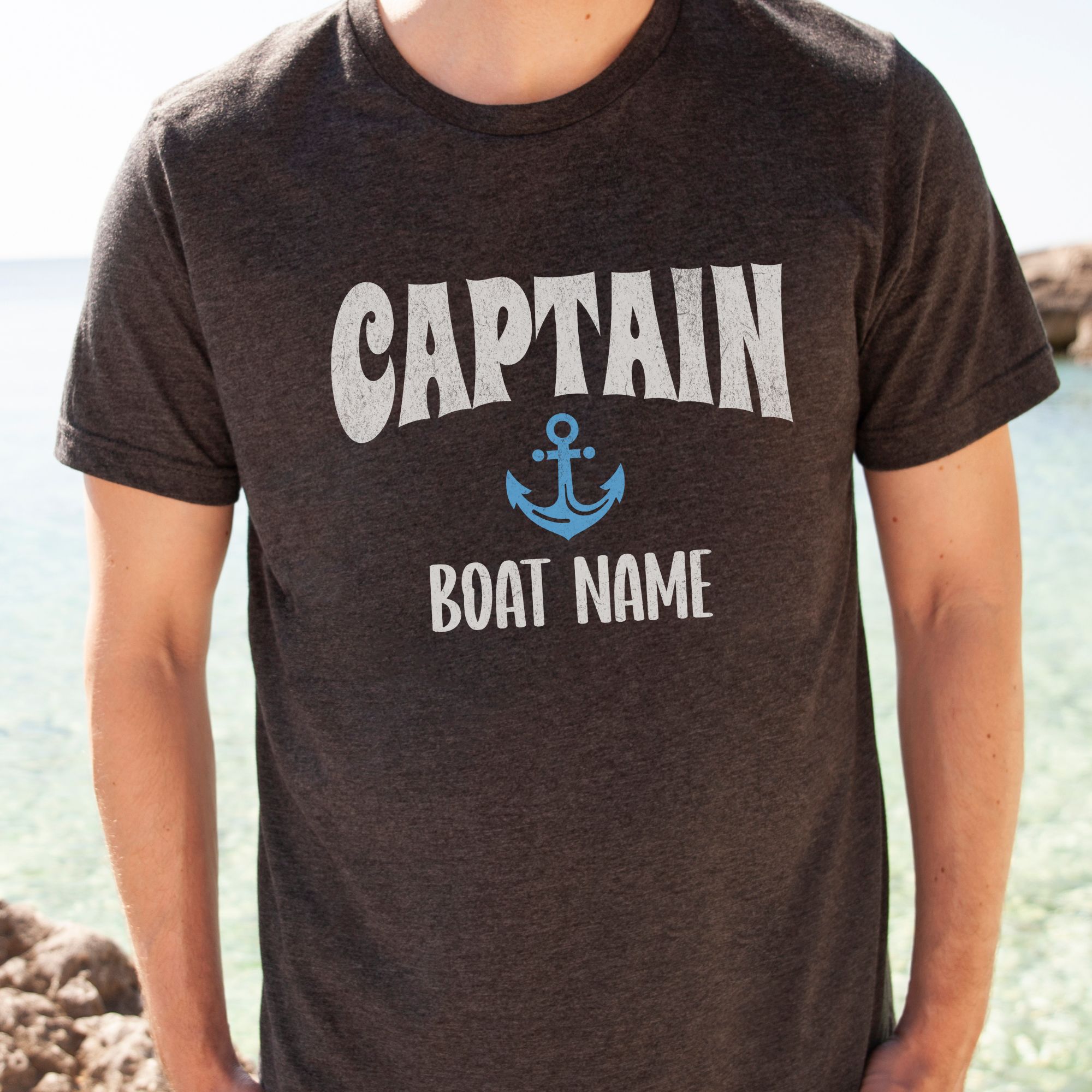
Captain Anchor Custom Boat Name Shirt
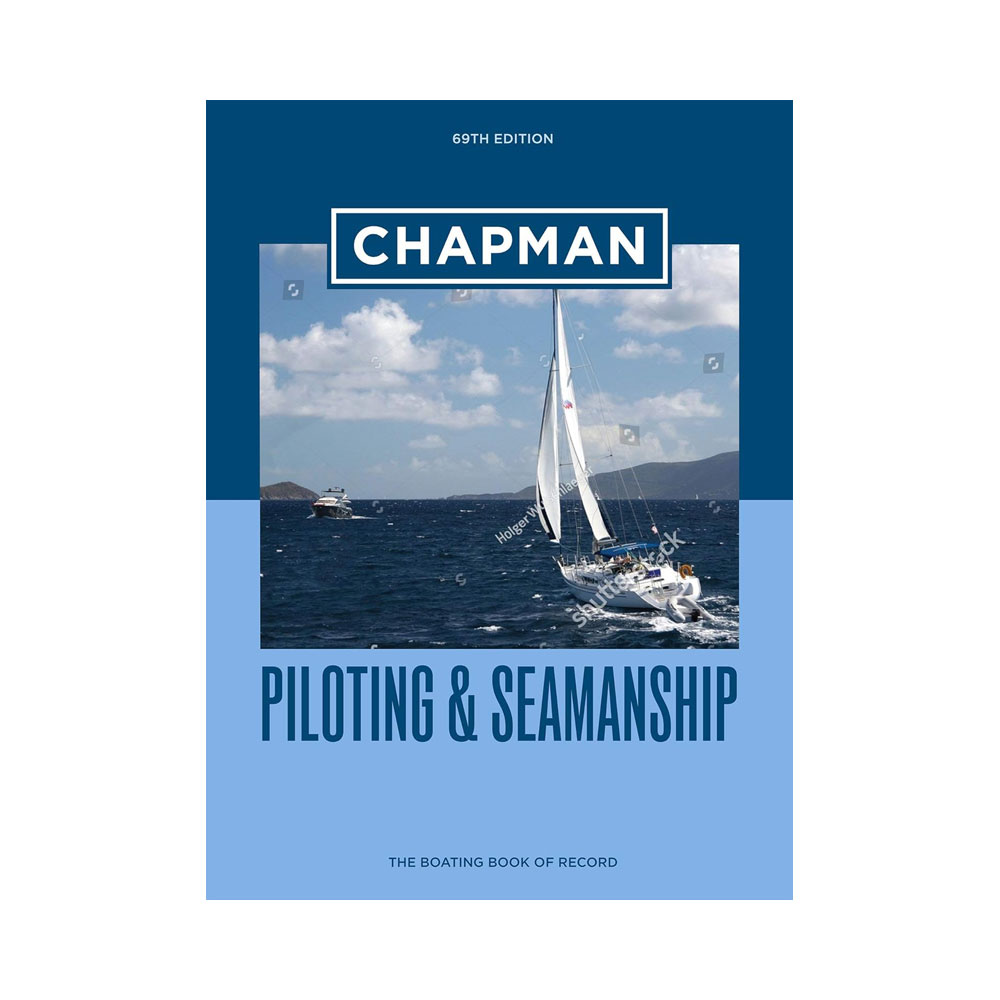
Chapman Piloting & Seamanship 69th Edition
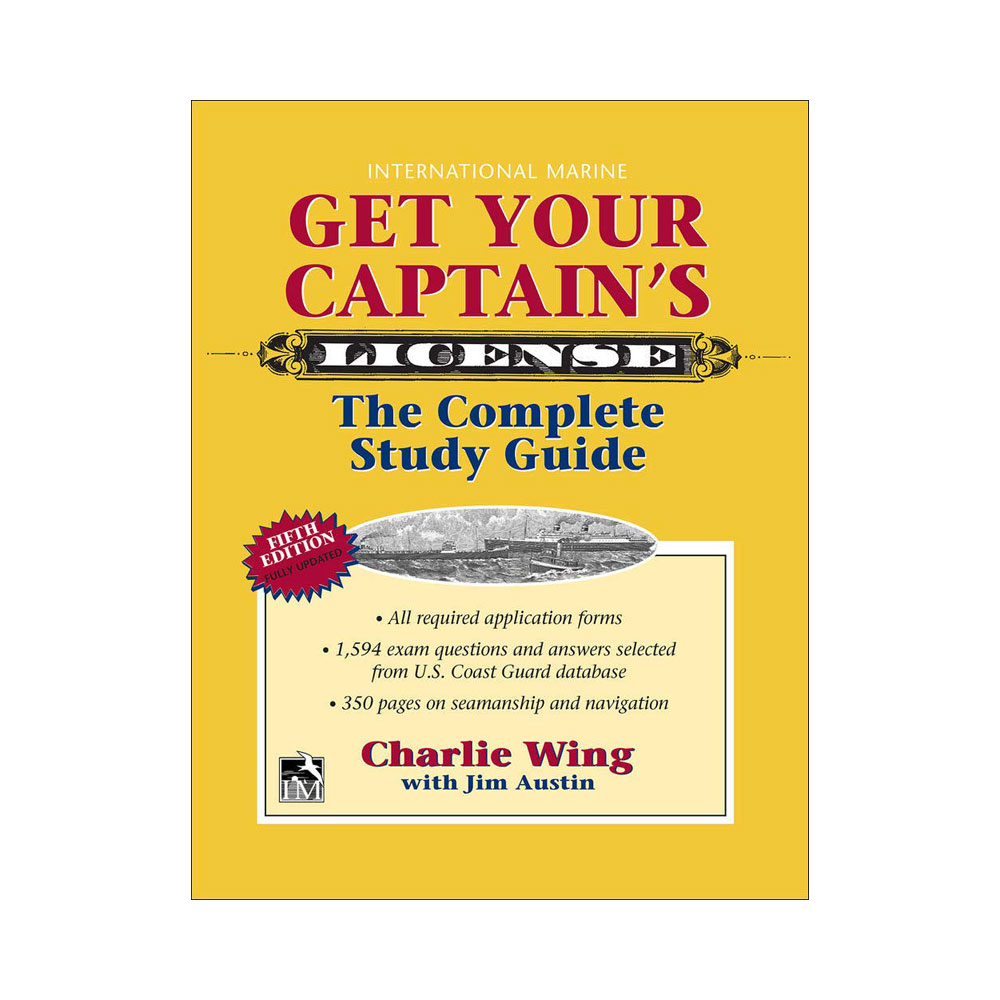
Get Your Captain’s License Study Guide
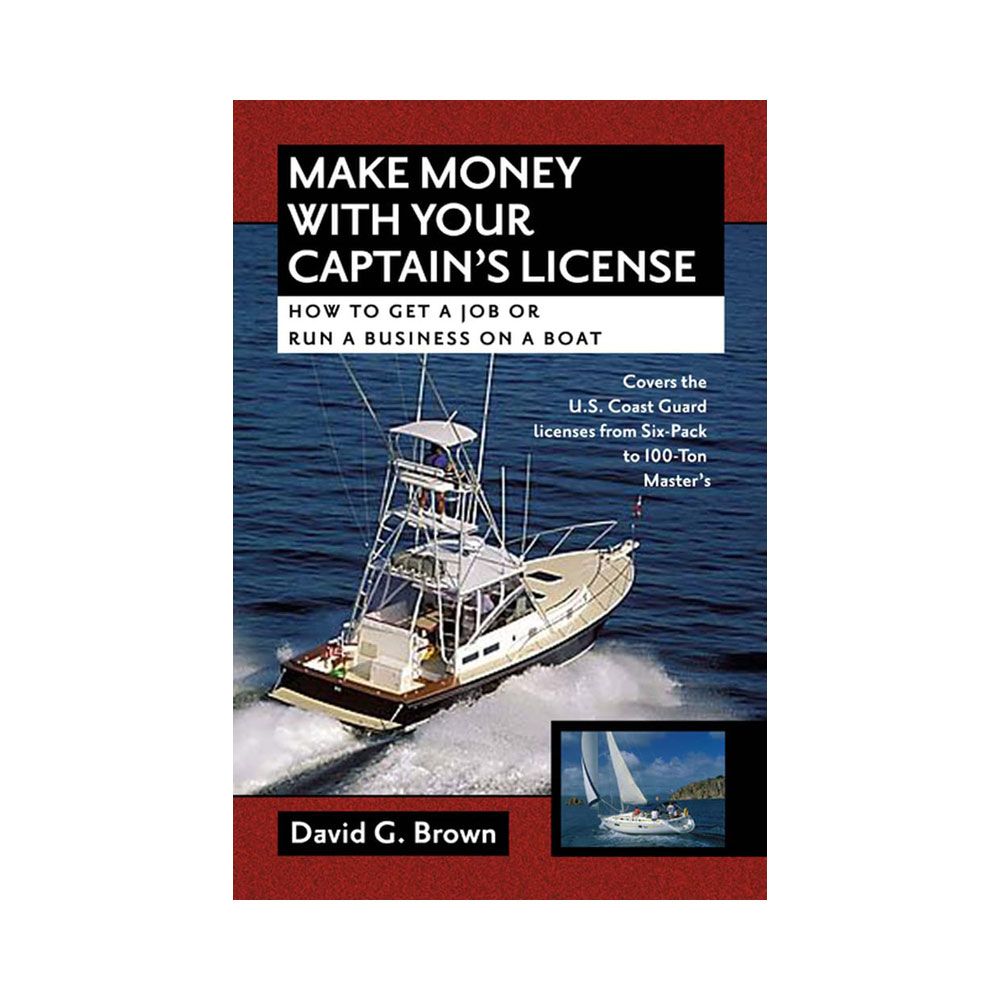
Make Money With Your Captain’s License Book
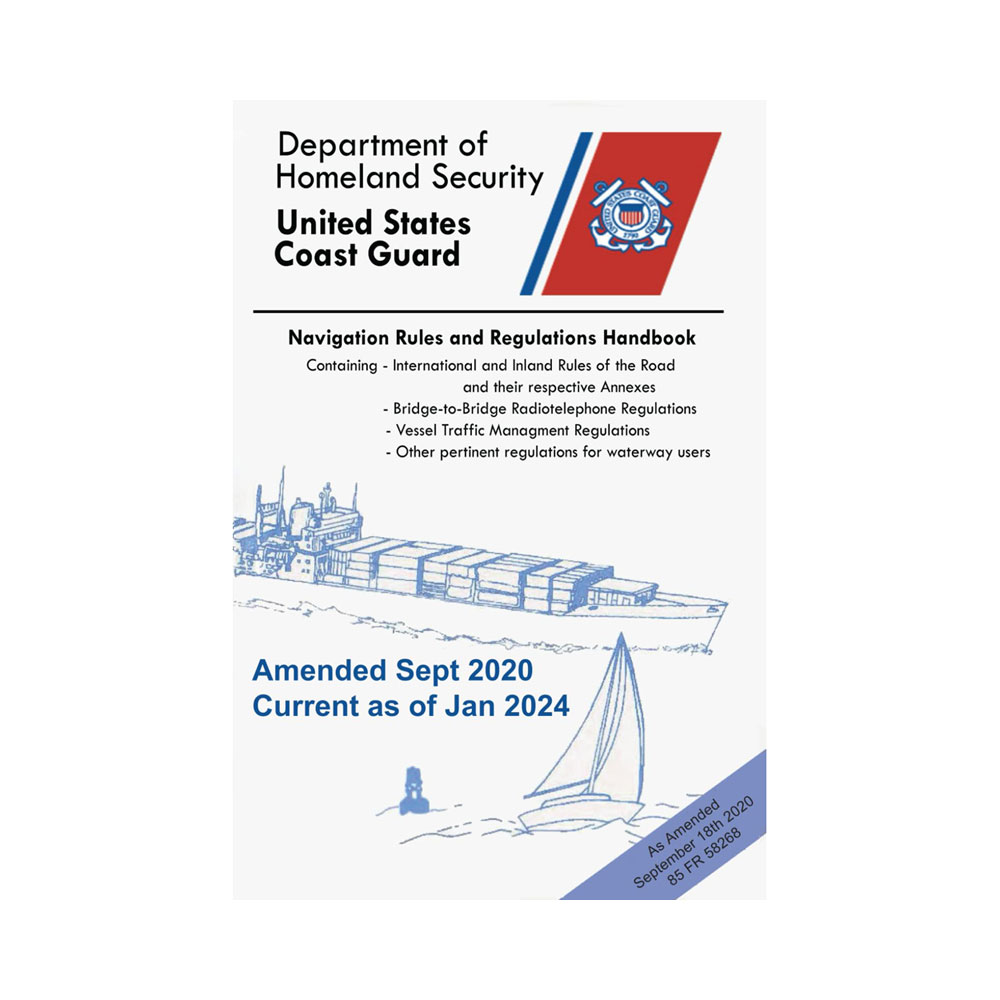
USCG Navigation Rules And Regulations Handbook
Trending now: must-have boat gear for your boat life.
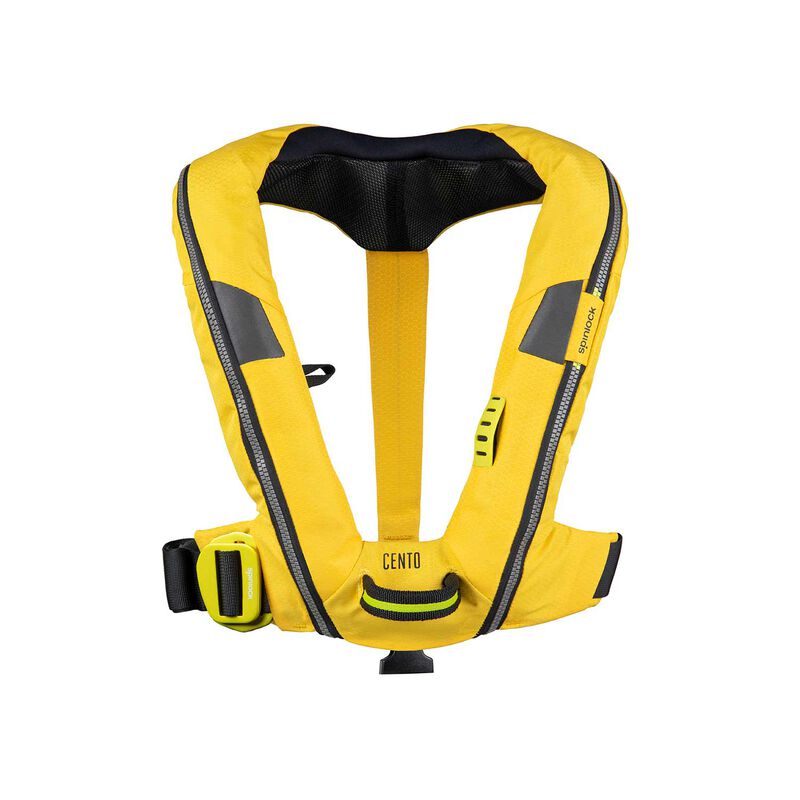
Spinlock Deckvest Junior Inflatable Life Jacket

Starlink Standard Kit for Stationary Use: High-Speed, Low Latency Internet
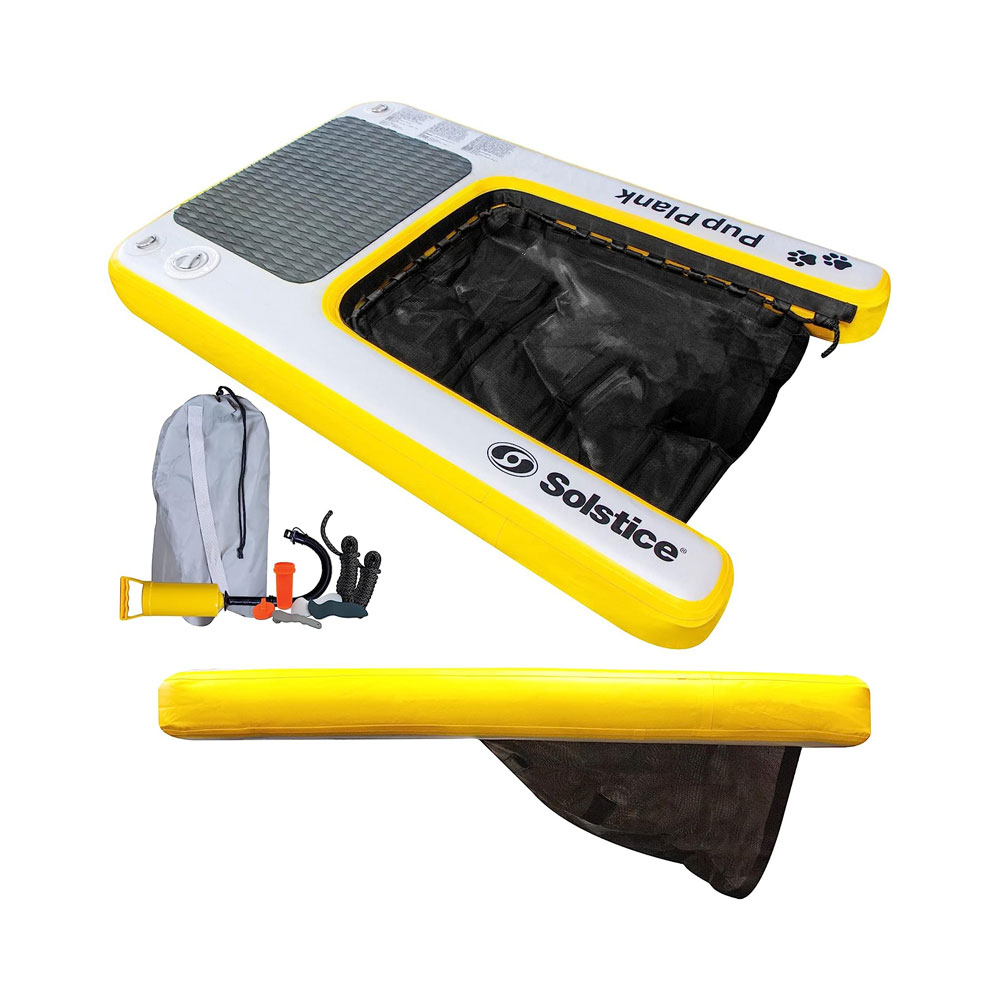
Inflatable Floating Pet Ramp
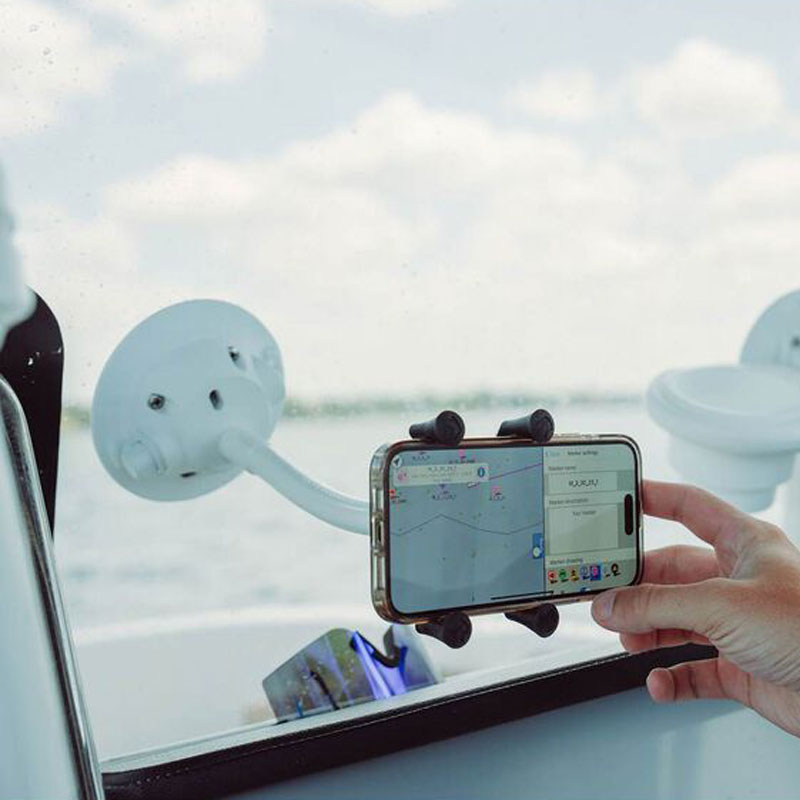
SeaSucker Flex-X Cell Phone Mount
Trending now: custom nautical decor for your boat life.
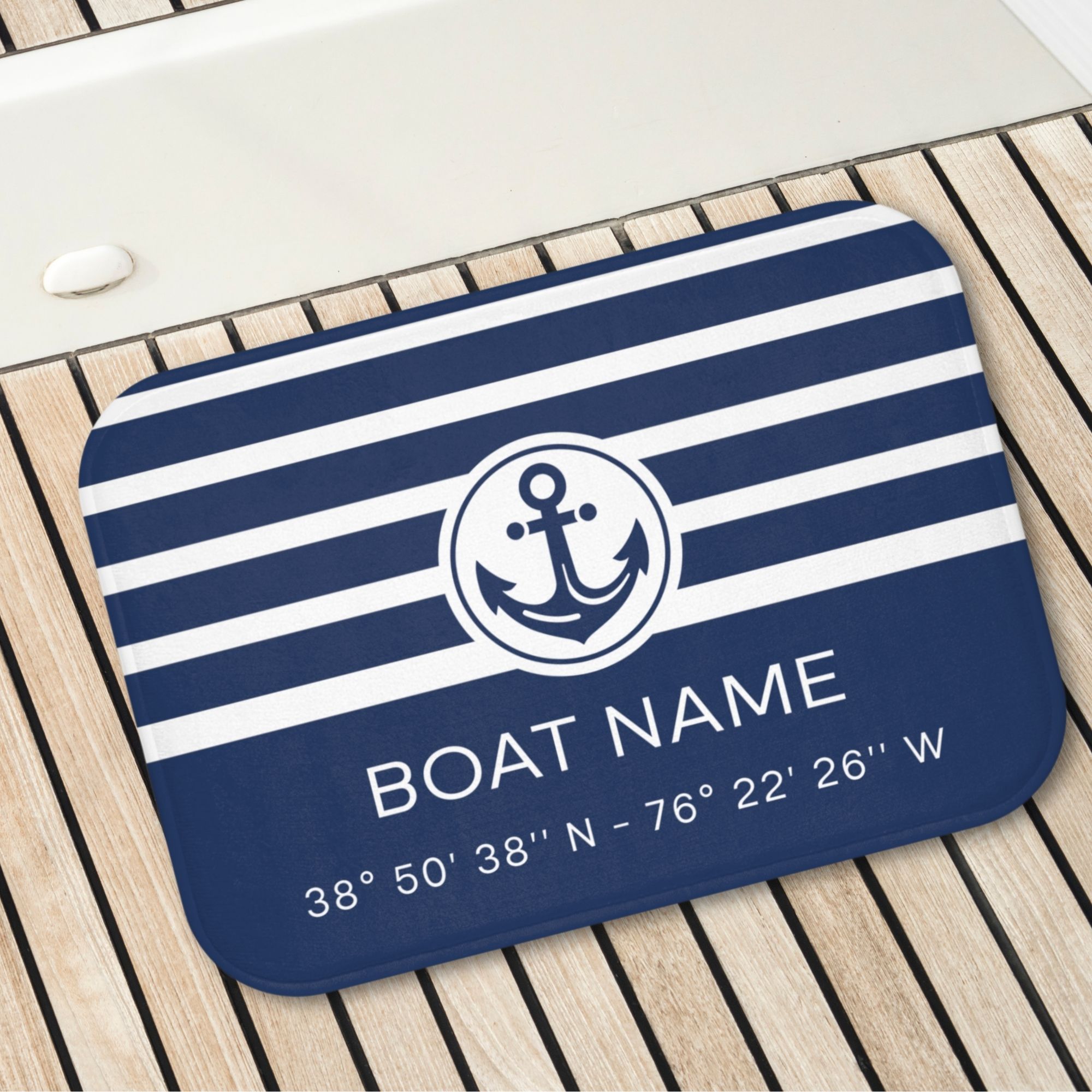
Custom Boat Mat with Boat Name & LAT LONG Coordinates

Fresh Boat Scented Soy Wax Candle

Boat Mom Definition Canvas Tote Bag

Capt. Rob Chichester
Related posts.
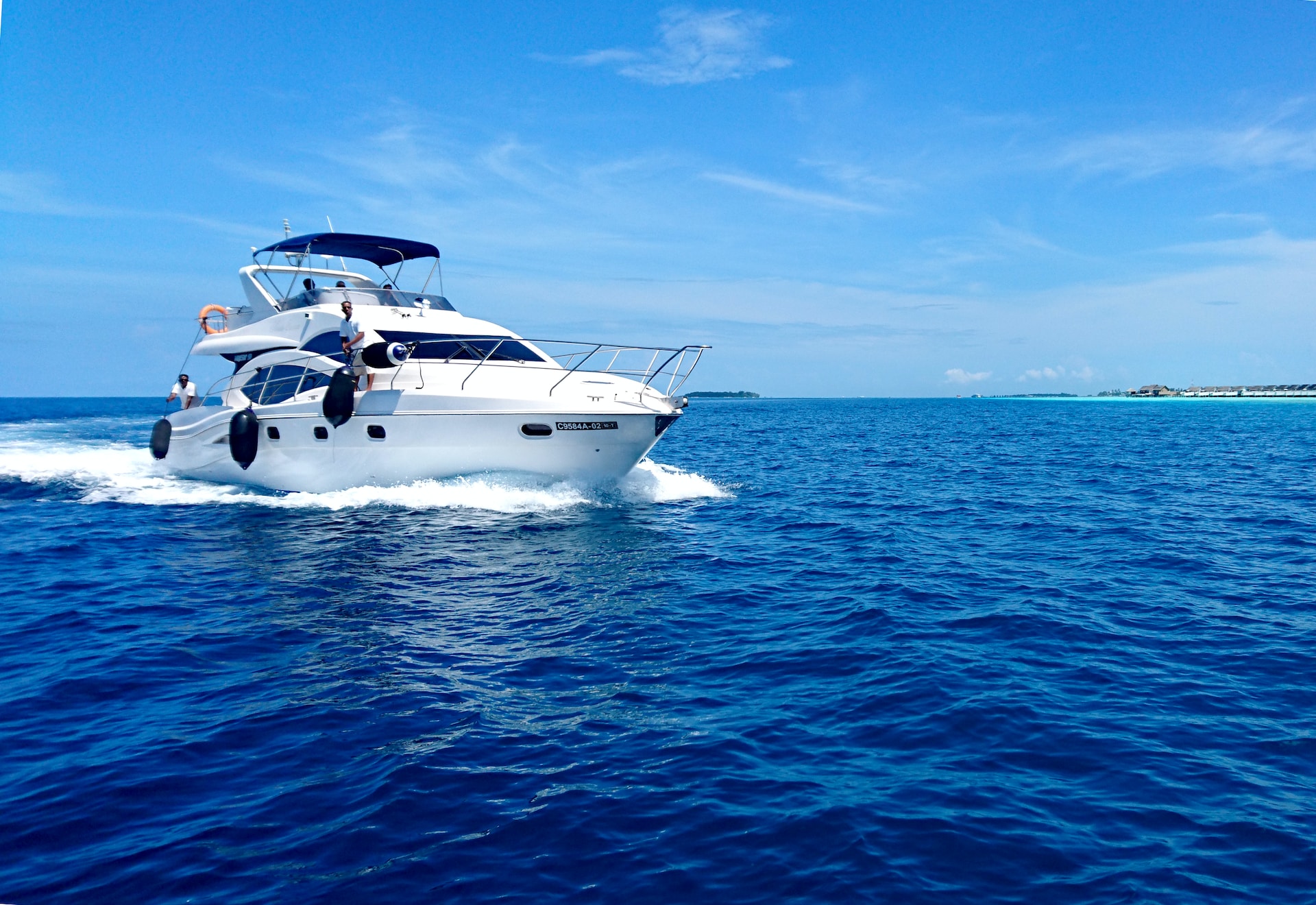
Can I Drive My Yacht Anywhere In The World?
May 11, 2023
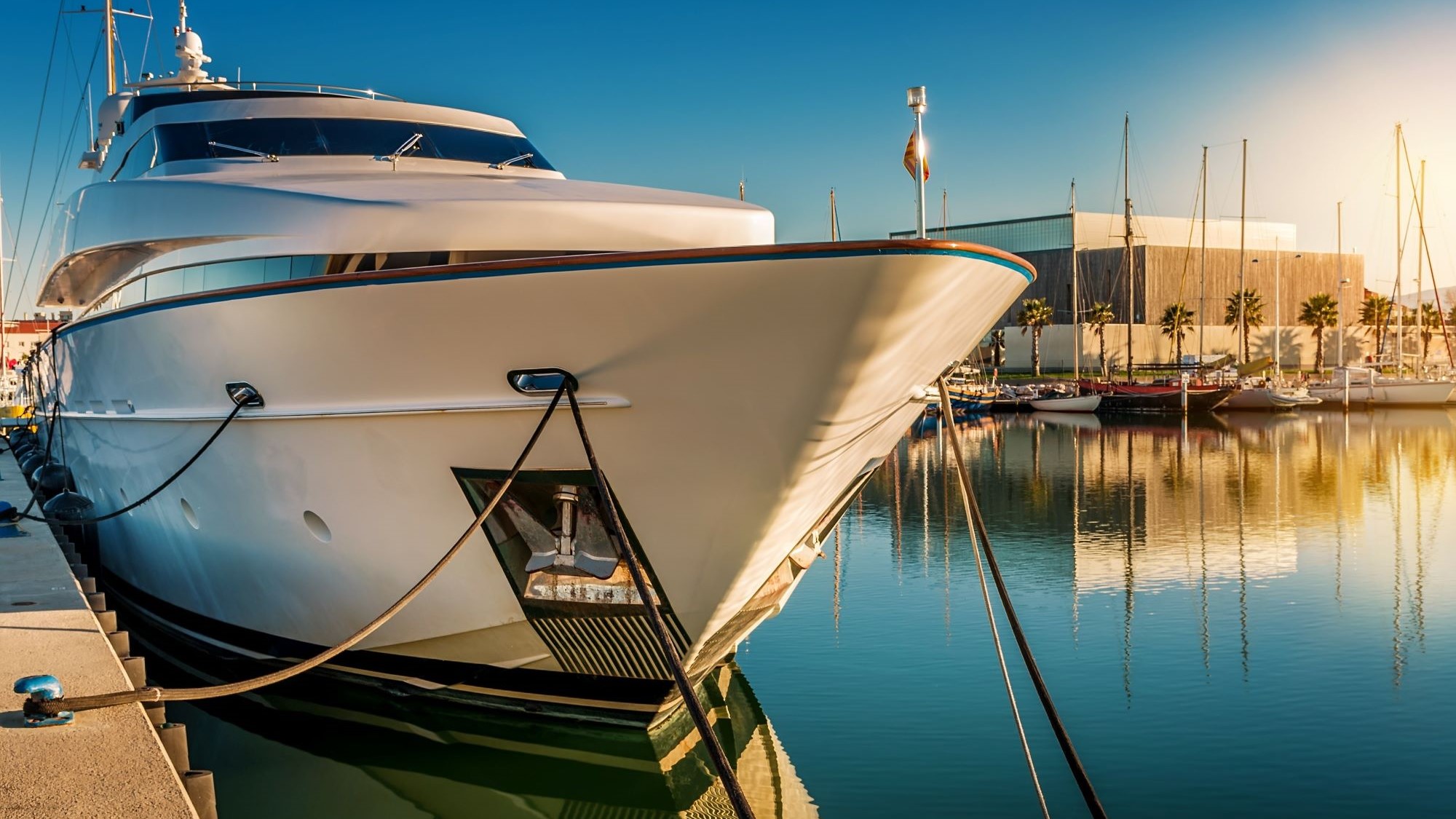
How To Transport A Yacht Safely
April 7, 2023
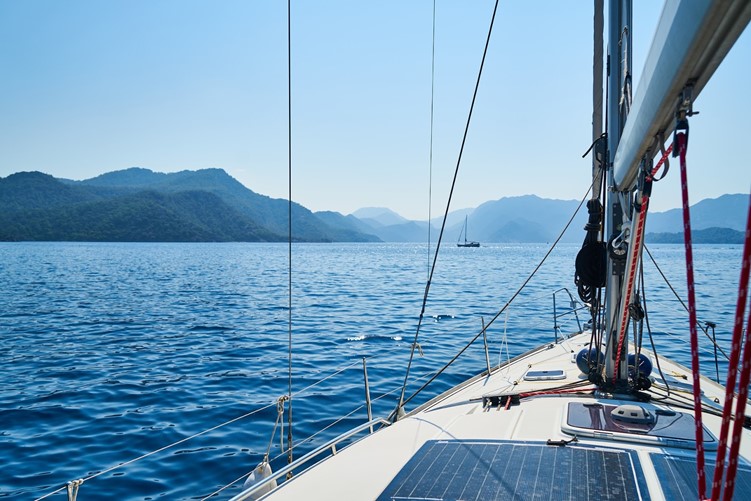
How Hiring a Captain Can Make You a Better Boater
May 29, 2021
24 Comments
Hi, I am hoping you can help me out. I am a USCG vet that was stationed at a small boat station in NJ from 1983-1989. I am trying to get my sea time documented but I am having a very hard time finding out how to do that since the station records were not computerized at that time. I have contacted the NMC and they told me to call the station to get an Abstract of Operations report. They just laughed at me when I called the station. I have requested info from vetrecs.archives.gov but I am sure that will take some time just to get an answer as to wether they can do that or not. I was wondering if you knew how to go about getting the information that I need. I am sure I am not the only person with this issue and I can’t seem to find anyone that knows exactly how to go about documenting that time.
Thanks Jeff

Thanks for your question. I don’t have a lot of advice for you regarding USCG internal procedures. Perhaps you can contact the Office of Personnel and try to get a copy of your service record. Alternatively, is there anyone at that small boat station who knew you? Would the OIC be willing to write a letter? The last and least likely option would be to fill out your own sea service form and see if anyone there would sign off on it for you. Now the regulations speak of a Certificate of Discharge being acceptable. See for example 46 CFR 10.232 ( https://www.law.cornell.edu/cfr/text/46/10.232 ). If you already have that, you might be good to go!
So…start with your Certificate of Discharge and if you don’t have that, then contact the Office of Personnel to see if you can get the requisite documents. Let me know how you make out!
Hi Captain Rob, My name is Elton the 66 year old owner of a small 35 ft. Kingscraft houseboat. I spend a lot of time on one large lake. It is an older wonderful all aluminum vessel but weighs only about 8000 lbs. In the chart the lowest weight rating is 17 tons. I would love to educate myself and become a Captain. Is that possible at some level? I would also have to document my own time as pilot.
Sir, you have open to you both options that I describe in my article. You could pursue either a Master’s license OR an Operator of an Uninspected Vessels license. From what you have written, I see no inherent obstacles. You must be able to document your seatime, get a medical evaluation, and pass the 4 or the 3 parts of the written exam depending on which license you choose to pursue. In any event, you would qualify for an Inland license. Your tonnage rating would also depend on which license you pursue. Solely based on what you have said above, you would qualify for a 50 ton Master’s license. If you pursue an OUPV, that comes with a tonnage rating of 100 tons. For most people, the biggest challenge is acceptably documenting seatime. (It needs all be as captain. You can include time served as master, mate, or crew but NOT as a paying passenger.) If your concern is your age, I know a few captain’s in the 60s and 70s. I am one of the former myself. Good luck!
Capt.Rob I am US Army Veteran And I was wondering if their was a school i could attend to obtain a licence, I ask this because i have to decide what i want to go to school for and this job would be a top pick for me. Any help on this matter would be greatly appreciated thanks
There are MANY captain schools that can help you with the written tests but there are NO schools that can help you with the sea time requirements unless you are considering enrolling in a maritime college like Kings Point or Fort Schuyler in the New York State university system. I used Mariners Learning System for my written tests only because it was more convenient than going to the USCG REC to take the exams.
Where would I get sea service forms . I have owned and operated my own boats for over 30 years and am now being asked to get a captains liscence
There is a link in the article for the National Maritime Center. All the forms you needs can be found on their website. Alternatively, you can search for USCG National Maritime Center with your favorite search engine.
Couple questions. Would working as a divemaster on a dive boat in the Gulf of Mexico count for near coastal sea time? And if you were to have 8 hours of sea time in one day, could you potentially count that as two days at sea? Or would it still be just one day? Thanks for all the info this has been a huge help!
Any time spent aboard a vessel underway counts as long as the owner, manager, or master of the vessel will attest to that. When submitting Sea Service forms, your option for your role aboard the vessel are things like crew, mate, master, engineer, etc. You will need to determine what your position was. Divemaster is not recognized and does not speak to maritime skills necessarily. (For example, you can dive from shore never having been in a boat.) Regarding the near coastal time, you just need to verify that the vessel upon which you served was indeed in near-coastal or ocean waters. The form has spaces for days spent within the specified boundaries and outside those boundaries. I once saw an interactive chart online for finding the boundary lines in a given area. For your purposes, you cannot count 8 hours as two days underway. You need a MINIMUM of 4 hours underway to count that day. Being at anchor or otherwise moored or secured does not count. Good luck!
Capt. Lots of good and helpful info. I boated the Chesapeake for 10+yrs, from the Delaware bay to Virginia in a 27′ cruiser. i’ve not been on the water since 2012. So to be clear, I need to acquire some time on a charter vessel to even attempt the basic “6-pack”. I have my CG boating skills and seamanship certificates,and will work on the CG719S. Living in Florida, lots of opportunity, should have done this sooner !! Thanks
Thank you for your feedback. I am glad you found the article helpful. Apart from documenting your sea time, I found the most labor intensive aspect was verifying that a) I had all the documents that I needed and b) I had correctly completely all of the USCG forms. A lesser challenge may be in determining what correct application fees are. If you are not sure, contact USCG NMC by phone, email, or online chat to get clarification on what fees you have to pay. Good luck!
This is great info..
I am starting out (hopefully) as a plan is due to new lifestyle i desire to get an two oceans open ocean 800 expedition catamaran (again very expensive so fingers crossed) but the plan is while the vessel is being built, i can take several classes and get a few certifications prior to launch, then as life you see everywhere on youtube for example have the vessel at dock, then day trips, then a week trip and just push it a little further until you are ready for the maiden voyage, really looking to live off anchorage in around the philippines / guam area mostly philippines or south pacific area, mostly friends and family but my question is any licence for that type of boat, and also if you have heard of any schools in the philippines? I know they have a few courses that are completely certified like any american school but a fraction of the cost, just curious if any particular licence i need to get or have?
You did not say whether you intended to take passengers for hire. Generally, one only needs to be licensed if you are getting paid to carry passengers OR if you working in more advanced maritime fields like tug boats and large cargo vessels. If you are only operating your private vessel for your own personal or recreational purposes, you usually do not need any kind of license other than possibly taking a multiple choice test on local safety rules and rules of the road. I am not familiar with the licensing requirements in foreign venues like the Philippines. Each nation has its own requirements. I was able to find information at this link: http://www.marina.gov.ph/policies/MCs/mc170.pdf . You may find some useful information in that document.
Good luck! And safe sailing…
Your information was helpful, thank you. I have decided to pursue getting my License but I am starting from scratch. Should I take classes before looking to get sea time? And how does one go about getting sea time with no experience?
Any course work you take will typically culminate in a certificate of completion. However that certificate will only be valid for 1 year. Therefore, do NOT take any exams more than about 6 months prior to submitting your original license application. As for sea time, you can look for marine work that does not require a license like deck crew on water taxis or excursion boats. Time spent on a friend’s boat counts. Have that friend complete and sign a sea service form. Sea time never expires and can be counted from the age of 15. Learn your rules of the road and learn to feel your vessel. Driving a boat is a lot different from driving a car. As a licensed captain, you are expected to step up to the helm and handle the ship with relatively little training time. Good luck!
Great article, thanks for writing it! Does time spent aboard a recreational boat that I own, when I am the only person aboard, count towards sea time? If so how do I document that – there’s no one to sign for the time. Thanks again.
Time spent on your own boat absolutely counts. You would sign the CG-719S Sea Service form yourself where it says Applicant AND where it says Person Attesting to Experience. However, you will have to provide proof of ownership for the vessel. The Bill of Sale is usually what is used but the vessel’s CG document or state registration card should also be sufficient. Remember that seatime is counted only from the age of 15 and it is underway time of at least 4 hours per day. Time on the anchor or alongside do NOT count. The presence of others is irrelevant.
Hi Shane. Sea time is defined as time working aboard in any capacity relevant to the rating you are pursuing. For instance, if you are a bos’n or deck crew, that time it unlikely to count towards a engineer’s license and conversely, time in the engine department or work on mechanical systems would be difficult to apply towards a deck officer’s license. The highest rating one can get on an original (i.e., first) license is 100 Ton Master. It is likely that your Navy time would count; however, your challenge is getting an appropriate service letter from the Navy. You cannot submit a CG-719S for your Navy service as that form is for SMALL VESSEL service. Consult the USCG site at http://www.uscg.mil/nmc for more information. Also note that you may use any valid sea time accrued from the age of 15. Good luck!
Hi Capt. Rob, I have one question rather just some clarification regarding the time at sea, for the tonnage rating. Does “time at sea” mean just that or does it mean operating the vessel. I was in the Navy for several years as an operations specialist and I am not sure what level I would qualify for if I were to pursue getting a Captains license. Also I was wondering how much the entire process would cost.
Hey Rob, Thanks so much for taking the time to write this, it was really very useful to read. This has been on my mind for some considerable time, but I am now finally starting on the road to getting my licence and taking a nautical shift in my career. I have been a sailor all my life, was sailing single handed as soon as I could walk and now own a 38 foot Irwin racer/crusier.
My one big question is online study vs going somewhere to do the required course? I wonder how you gained your licence and what you might recommend?
My issue was primarily NOT wanting to have to take the tests at the NYC REC and to NOT attend intense 8-10 hour weekend classes. I was comfortable with the Rules of the Road and chart navigation issues as well the Deck General material. Since I got a Master’s license (versus the OUPV), there was more legal stuff to know in the category they call Ship’s Business. I did an online course through Mariner’s School in Princeton, NJ. The price was good and the location was convenient for when I did go to take the test.
The bottom line is do what works best for you given what you need to learn or refresh, how much time you have to do it, and where you will need to go to take the final tests.
(Please note that you can submit your application and/or take your tests at ANY REC anywhere. It is not a function of where you live or where you will sail.)
Great article Rob. Thanks for sharing your experience
Thank you for the feedback. Do please let me know if you have any further questions or if I may be of service in some other regard!
Comments are closed.

How to Become a Yacht Captain- An Expert’s Handbook
Do you want to become a yacht captain? Having watched my husband climb the ranks over the past 12 years, I have first-hand experience of seeing what it takes to become a yacht captain.
We started working on a small catamaran in the Seychelles, and today, he is the successful Captain of a world-traveling 50m super yacht.
Becoming a yacht Captain requires a significant investment of time and money, but the reward of commanding your own vessel and crew is immeasurable.
Let’s explore what it takes, including the salaries, necessary skills, and certifications.
Table of Contents
Job Description of a Yacht Captain
The Captain of a superyacht is responsible for the safe navigation of the vessel, the safety of the crew onboard, as well as protecting the environment.
They are the primary source of communication with the yacht owner, guests, and management company.
They also handle all the daily operations of the yacht, including crew management and safety training. The Captain deals directly with management companies, port control, maritime legislation, budgets, accounting, and human resources.

Yacht Captain Salary
The below super yacht Captain salary guideline is based on my personal research using an average of over 10 major yachting platforms:
- 20m-30m: $4000-$7500 p/m
- 30m-40m: $5500-$9500 p/m
- 40m-50m: $8000-$15000 p/m
- 50m-70m: $13000-$19000 p/m
- 70m+: $16500+ p/m
Additionally, with longevity a yacht Captain can also expect to see discretionary annual raises and bonuses.
If they work on a Charter Yacht there will also be charter tips received averaging $2500-$5000 per week of chartering.

Roles and Responsibilities of a Yacht Captain
The job of a Yacht Captain can be compared to that of a CEO, CFO, and COO of a large corporation. The responsibilities are huge.
On a smaller vessel of 35m or less, the captain will need to be more hands-on, and they will likely also be the engineer of the vessel.
However, as the vessel size increases, you will have larger teams and heads of departments to assist in delegating tasks.
Roles and Responsibilities
- Crew Management and training
- Hiring and dismissals of crew
- Human resources
- Accounting and budgeting
- Safe navigation of the vessel
- Safe navigational planning
- Marine and environmental protection
- Vessel maintenance – planning yard work and refits
- Owner and guest liaison
- Planning of guest trips and itineraries
- Ensuring the yacht is compliant with maritime law
- Ensuring the yacht is compliant with all flag state safety regulations
Soft and Hard Skills
When it comes to the question of how to become a yacht captain, besides the required licenses, it is essential to hold certain soft and hard skills:
- Strong leadership skills
- Team management
- A quick thinker and problem solver
- Calm under pressure
- Exceptional communication skills
- Diplomatic in decision-making
- Excellent boat handling skills
- Navigational skills
- Administrative skills
- Organizational skills
- Computer literate
- Strong understanding of maritime legislation

Mandatory Certifications for How to Become Yacht Captain
The license required when identifying how to become a Yacht Captain is dependent on the size/tonnage of the vessel they wish to drive.
Your entry-level Captain license is the Yacht-Master 200 ton. This allows you to drive a vessel of under 200 tons, which is approximately 35m/100ft.
From there, with enough sea time and experience, you can move up towards the Master 500 and then Master 3000 tickets.
If you were to start from scratch, you would first want to look at how to become a deckhand . This will give you all the information and guidance you require before you get to the point when you are ready to start your master’s licenses.
Here is the order in which you would complete your courses:
- ENG1 Medical
- Efficient Deckhand (EDH)
- Yacht-Master Offshore (200ton)
- Yacht-Master Ocean (200 ton)
- OOW (Officer of the Watch)
- Chief Mate 3000
- Master 500 ton
- Master 3000 ton
Yacht Master Offshore 200 ton Limited
Holders of this certificate can Captain a yacht up to 200 gross tons and must be within 150 nm from a safe haven whilst doing so. This course is also required to legally stand watch on a vessel of up to 500gt.
The course consists of theory and practical work and takes 13 days to complete.
Pre-requisites for Yacht Master 200t Limited:
- 3,000 nautical miles while cruising at sea
- 50 days at sea as an active crew member
- 5 days as skipper on vessels less than 24m LOA
- 48 hours on watch at night underway as an active member of a yacht’s crew. During at least six hours of this nighttime experience, the candidate must have acted as the vessel’s captain or watch leader.
- A GMDSS-compliant Marine Radio Operator’s Certificate such as the RYA Short Range Certificate or higher
- All qualifying sea time must be within 10 years prior to the exam

Master of Yachts 200 ton Ocean Unlimited
This certificate allows the holder to be in charge of a commercial yacht of up to 200 gross tons on unlimited voyages.
This comprehensive six-day course on celestial navigation is designed to equip future yacht Captains with the knowledge necessary to navigate the globe using a sextant and air navigation tables.
Additionally, it will enable them to plan, undertake, and manage an ocean passage with confidence.
Pre-requisites for the Master 200 ton Unlimited:
- Before enrolling in the course, candidates must have completed two voyages of 250 miles each or one voyage of 500 miles. The majority of the journey must take place out of sight of land, which means being at least 20 miles away from the shoreline.
- For the qualifying voyage, it is expected to create a passage plan that can be reviewed during the course.
Officer of the Watch (OOW)
In order to obtain the MCA Officer of the Watch (Yachts Less Than 3000 GT) Certificate of Competency, candidates must complete seven distinct modules. These modules are designed to prepare candidates for the MCA oral exam.
Pre-requisites for the OOW:
- IYT Master of Yachts Limited certificate
- A minimum of 250 days of actual sea service
- 115 days can be either sea service, stand-by-service or yard service
- A Completed MCA approved training record book
The 7 modules include:
- Navigation and Radar (15 days)
- General Ships Knowledge GSK (5 days)
- Proficiency in Survival Crafts and Rescue Boats/Advanced Sea Survival (3 days)
- Human Elements and Leadership Management HELM (3 days)
- Global Maritime Distress and Safety Systems (GMDSS)
- Efficient Deckhand EDH (5 days)
- Electronic Chart Display and Information ECDIS (5 days)
- MCA OOW Deck Oral Prep Work (12 days)

Chief Mate 3000GT
After obtaining the Officer of the Watch certification for yachts less than 3000gt, you can apply to the MCA for the endorsement of the Chief Mate (Yachts less than 3000gt) Certificate of Competency. It is possible to apply for both certifications at the same time.
Course Modules include:
- STCW Advanced Fire Fighting (4 days)
- Proficiency in Medical First Aid (4 days)
- Human Elements of Leadership Management – Management level (4 days)
Master of Yachts (500GT)
This certificate is required in order to Captain a yacht of up to 500 gross tons.
Requirements for the course:
- 12 months as a watch-keeping officer with an OOW Certificate
- A valid ENG1
Modules include:
- Stability (5 days)
- Business and Law (5 days)
- Navigation and Radar with ARPA Simulator (10 days)
- Seamanship and Meteorology (5 days)
- Celestial Navigation Refresher and Exam (5 days)
- Proficiency for persons in charge of medical care onboard a ship (4 days)
Master of Yachts (3000GT)
This certificate is required in order to Captain a yacht of up to 3000 gross tons.
The modules for the Master 3000GT are the same as that of the Master 500. If you pass all the modules and have met the requirements for the Master 3000GT, you can skip the Master 500gt Course and do the exam and oral for the Master 3000GT.
Requirements include:
- including not less than 240 days watch-keeping service whilst holding an accepted OOW Certificate of Competency (CoC).
- All of this service must be completed in vessels of 15m or over in load line length and include 12 months in vessels of 24 m or over in load line length, or 6 months in vessels of 500gt or more.
- A valid ENG1 Certificate
Final thoughts
Most crew don’t anticipate the significant amount of time and money it takes when wondering how to become a yacht Captain.
My advice to you is to start logging your sea time from the very beginning and plan ahead. You don’t want to miss out on opportunities due to not having the required license.
If you are still looking for more detailed information or if you are looking to book a course, head over to the PYT website. They are an MCA compliant training facility with schools in Fort Lauderdale and South Africa.
Good luck on your journey. I hope to see you out in the big blue ocean commanding your own vessel one day.

Hi, my name is Lisa, a Chief Stewardess in the yachting industry with 10 years of experience, as well as 8 years of hospitality experience prior to that. Being in the yachting industry has been a whirlwind of adventure, growth, challenges and some of the best experiences of my life, and I am excited to share my knowledge and experiences with all of you.
- PRO Courses Guides New Tech Help Pro Expert Videos About wikiHow Pro Upgrade Sign In
- EDIT Edit this Article
- EXPLORE Tech Help Pro About Us Random Article Quizzes Request a New Article Community Dashboard This Or That Game Happiness Hub Popular Categories Arts and Entertainment Artwork Books Movies Computers and Electronics Computers Phone Skills Technology Hacks Health Men's Health Mental Health Women's Health Relationships Dating Love Relationship Issues Hobbies and Crafts Crafts Drawing Games Education & Communication Communication Skills Personal Development Studying Personal Care and Style Fashion Hair Care Personal Hygiene Youth Personal Care School Stuff Dating All Categories Arts and Entertainment Finance and Business Home and Garden Relationship Quizzes Cars & Other Vehicles Food and Entertaining Personal Care and Style Sports and Fitness Computers and Electronics Health Pets and Animals Travel Education & Communication Hobbies and Crafts Philosophy and Religion Work World Family Life Holidays and Traditions Relationships Youth
- Browse Articles
- Learn Something New
- Quizzes Hot
- Happiness Hub
- This Or That Game
- Train Your Brain
- Explore More
- Support wikiHow
- About wikiHow
- Log in / Sign up
- Occupations
- Transport Careers
How to Become a Boat Captain
Last Updated: April 29, 2024 References
Getting a Job
Expert q&a.
This article was co-authored by Nitzan Levy . Captain Nitzan Levy is a Sailor, Social Entrepreneur, and the Founder of Sailors NYC, a recreational sailors’ club based in Jersey City, New Jersey that specializes in cruising boats and a variety of community programs. Capt. Levy has over 20 years of sailing experience and has sailed in many places around the world including: the Atlantic Ocean, the Mediterranean Sea, The Caribbean, and the Indian Ocean. Capt. Levy is a U.S. Coast Guard Licensed Master of vessels up to 50 Tons with Auxiliary Sail and Assistance Towing Endorsements. Capt. Levy is also a NauticEd Level V Captain Rank Chief Instructor, an American National Standards Assessor, an SLC instructor, an ASA (American Sailing Association) Certified Instructor Bareboat Chartering, and an Israeli licensed skipper on Boats for International Voyages. There are 10 references cited in this article, which can be found at the bottom of the page. This article has been viewed 133,200 times.
Becoming a boat captain can be a time-consuming but rewarding process. A captain’s license isn’t necessary if you just want to take your own boat out for pleasure cruises, but it is required if you receive any compensation for your boat services. With the right education, experience, and test scores, you will be on your way to becoming a licensed boat captain.

- Learn communication skills through English classes and other language classes.
- Also consider taking computer classes and mechanical drawing classes.

- Get a degree in the field of marine transportation, marine engineering, maritime operations and technology, or shipyard management.

- Even if you can’t afford a full 4-year education, try to audit some maritime-related classes at your local university or community college.
- Look for classes offered by local organizations like the yacht club or sailing club.

- If you live near a coast, look for local businesses that specialize in these classes. If there's nothing near where you live, you can take an online course.
- These courses end in a written exam that can often stand in for the official exam. Check the Coast Guard website to find approved courses. [4] X Research source

- If this sea-time is spent under another captain's command, you will need to have this captain sign your license application when the time comes.
- Any time spent on a boat counts. So include hours working in positions such as a maid or deckhand on a cruise ship.

- Some positions to aim for are deckhand, third mate, second mate, chief mate, or engineer.
- Look for positions like tour guide, dockhand, sanitation officer, or boat mechanic.

- If it's not necessary, simply provide a statement with your application that says you don't need it.
- If a TWIC card is necessary for you, you can apply for it through the TSA.

- The Master license involves far more sea-time hours, but there’s no need to get the six-pack license first. Jump right to the Master if that’s the one you want.

- Additional identification will be required, such as a social security card or an I-551 alien registration card.

- You can submit your application and any supporting documents in person at a local Regional Exam Center (REC) or send it to the REC through the mail.
- If you're outside the U.S., you'll need to apply for the International Certificate of Competence (ICC) through the Royal Yacht Academy.

- References from licensed captains, commercial fishermen, or others who own and operate their own boats are generally best.
- These character reference letters should also be notarized.

- This exam will usually consist of multiple choice questions about deck and safety procedures, general navigation, and rules associated with operating a boat in shared waters. [17] X Research source

- If your application is approved, your license and credentials will be printed and mailed to you.

- Join your local yacht club or sailing club to make more contacts there.
- Go mingle with other captains at local docks and start up conversations with them. They may know of more job openings.

You Might Also Like

- ↑ https://bigfuture.collegeboard.org/careers/transportation-ship-captains-marine-pilots
- ↑ http://education-portal.com/become_a_ship_captain.html
- ↑ http://study.com/become_a_ship_captain.html
- ↑ https://www.dco.uscg.mil/Portals/9/NMC/pdfs/faq/exams_faqs.pdf?ver=2017-07-13-110959-517
- ↑ http://matadornetwork.com/notebook/how-to-become-a-boat-captain/
- ↑ http://www.payscale.com/research/US/Job=Ship_Captain/Salary
- ↑ Nitzan Levy. Sailing Instructor. Expert Interview. 24 April 2020.
- ↑ http://www.dco.uscg.mil/Portals/9/NMC/pdfs/faq/twic_faq.pdf?ver=2017-05-31-144812-903
- ↑ https://asa.com/news/2013/08/12/uscg-captains-license/#
- ↑ http://www.dco.uscg.mil/Our-Organization/Assistant-Commandant-for-Prevention-Policy-CG-5P/National-Maritime-Center-NMC/merchant_mariner_credential/
About This Article

If you want to become a boat captain, obtain your high school diploma or GED. After school, enroll in a captain’s license class or a college program where you’ll learn about navigation, tidal calculations, international and inland boating rules, and meteorology. Before you can obtain a captain’s license, you must have a minimum of 360 days worth of sea time within a 5-year period, where a “day” is 4 consecutive hours on the water. This can be piloting the boat or working as a deckhand on a cruise ship. For more information on getting your license, read on! Did this summary help you? Yes No
- Send fan mail to authors
Reader Success Stories
Aug 30, 2016
Did this article help you?

John Williams
Dec 7, 2021

Featured Articles

Trending Articles

Watch Articles

- Terms of Use
- Privacy Policy
- Do Not Sell or Share My Info
- Not Selling Info
Get all the best how-tos!
Sign up for wikiHow's weekly email newsletter

Do you operate a yacht? Our app is perfect for you
How to become a yacht captain - certifications & experience.
Just like any other highly paid and highly specialized position, becoming a yacht captain is a long grind. Nothing is given to you. You have to start from the bottom and work your way up. It is a process that takes many years of sea time, education, and experience.
Assuming that you are relatively new to the industry, it’s best to start from the very beginning. In the following chapters we will go through a detailed breakdown of the certifications and qualifications you need, and show you how to become a yacht captain.
Table of contents
How to become a yacht captain - Basic education
Rya certification, creating your resume, get to a yachting capital.
- "Earning" your first job
- Get experience & continue your education
Climbing the ranks
Becoming a yacht captain, responsibilities of a yacht captain, yacht captain salary, final notes on how to become a yacht captain.
.jpeg)
Before you get your first job onboard of any yacht, there are a few courses you need to take. These are mandatory for everyone who wishes to work onboard, and are commonly known as basic training for seaman:
- STCW 2010 Basic Safety Training (BST) - This training consists of first-aid practices, response to emergencies, personal safety, social responsibility, and best practices for sea survival. The duration of this course is 5 days and pricing starts at $1012.
- Efficient Deck Hand (EDH) course) - This course teaches basic seamanship, rope and wirework, painting and maintenance routines, as well as other safe working practices aboard. Much like the BST, this course is 5 days long and pricing starts at $964).
At this point, what you want to do is get your Royal Yachting Association (RYA) certificate. The Royal Yachting Association (RYA) is a recognized organization that issues your Powerboat Handling Level 2 (basic course), Yachtmaster™ Offshore , and Yachtmaster™ Ocean .
Note that the costs associated with the RYA certificate can vary, as you need to find an associated training center, purchase all the necessary materials, and abide by all the entry requirements. So you might need to do some research at this point.
Once you successfully complete the courses mentioned above, you will need to put your CV together. There are many templates you can use for this purpose. You can start by using this one .
Once your CV is created, you will need to seek out the best yacht crew agencies and start applying to all of them. This page gives a good overview of the most popular options.
Keep in mind that there are many options when it comes to resume templates and yacht crew agencies. It might be a good idea to use Google to find more options.
.jpeg)
To increase your odds of getting a job onboard, you will now need to get to one of the yachting capitals. This is, by far, one of the best tips for ambitious young sailors that want to know how to become a yacht captain.
Don’t get fooled by those who tell you of their single best yachting capital of the world. Depending on your current location and budget, you will have several options. Check this article to start your research.
“Earning” your first job
As soon as you arrive at your yachting capital of preference, you will need to get a job. Similar to any other industry, this usually happens by actively seeking out open positions. For yachting work, this is done through “dock walking”, a term that refers to the process of going from boat to boat, searching for opportunities.
What you want to do here is be pleasant, hand out your CV, grow your network, and offering any kind of service. There might be owners that need help with buffing, sanding, polishing, scrubbing decks… you name it! Take any job that you can because each hour you spend onboard improves your resume.
After a while, you will hopefully manage to get a job aboard a (super)yacht. This is where you want to be. It is important to manage your expectations and prepare to work very hard. Your first job will not be glamorous and it will certainly not be a “working holiday”. You will be living in a cramped scape, away from home, doing chores most hours of the day.
Don’t let the day-to-day tasks discourage you. Everything you do at this point helps you build character and shows that your position is “earned”. You will have many opportunities to gain experience, overdeliver, and start climbing the ladder.
Gain experience & continue your education
As you become more experienced and collect enough hours onboard, you will qualify for a few more courses, which are issued by the Maritime and Coastguard Agency (MCA).
- Officer Of the Watch (OOW) - This course allows you to become an officer on board a vessel up to 3000gt. In order to apply for this course, you will need to meet several requirements, including >250 days onboard, holding an RYA certificate for at least 36 months, and having completed an MCA training record book . The latest is a list of tasks that you need to complete while serving onboard a vessel that exceeds 15 meters in length. Anything smaller is not qualified as valid experience according to the MCA. The modules of OOW include:
- General Ship Knowledge (GSK) - Price between $1000 - $1100
- Navigation & Radar (ARPA operation) - Price upon request
- Global communications training (GMDSS GOC) - Price starting at $1625
- HELM Training Operational Level - Price upon request
- Proficiency in survival cross & rescue boats - Price between $860 - $900
- Electronic Chart Display Information System (ECDIS) Training - Price between $1300 - $1800
Each of the modules, once completed, requires a written exam. This means that you need to find a partner organization where you can go and write the exam. If you pass, the certificate will be sent to your location (including a digital copy that you can add to your resume).
You need to pass all of the modules in order for the MCA to issue your certificate of competence (COC). And as soon as all that is done, you are officially qualified to perform your oral exam for the OOW. Here is a video that shows you the steps you need to follow:
The exam itself consists of a discussion with a qualified instructor, where you go through all the modules through a series of questions. Upon passing the exam, and given that you hold all the aforementioned certificates, you will receive the MCA Yachts OOW certificate and are officially qualified to be a deck officer.
Keep in mind that the certificate itself doesn’t automatically guarantee you a promotion. You might move slightly up the ranks (lead deckhand) but you will still need to gain more experience in the form of additional sea time.
More specifically, you can continue with higher-level education once you gain even more experience on board.
The course you want to do is known as MCA Master 500 yachts . You can do this once your certificate of competence has been issued for OOW and 12 months have passed. You will also need to have an additional 120 days of verified sea service.
The course consists of several master modules, which include:
- Ship Stability - Price: $1500
- Business and Law - Price: $1500
- Navigation, ARPA, and radar simulator - Price: $3350
- Seamanship & Meteorology - Price: $1500
The course also includes some ancillary course modules, as well as the requirements you need to abide by in further detail. Similar to the OOW, you will need to pass a written certificate for each of the modules, in order to proceed to an oral exam to receive your Master 500 certificate of competence (COC).
You now have all the necessary qualifications - there are no more modules. However, you still need to perform an additional 12 months of sea time, and 120 days of sea service.
The final step is getting your MCA Master 3000 certification, a process that consists of an oral exam only. You can find more information about the requirements and components here . The oral prep course for this exam is highly recommended, takes 5 days, and costs between $890 and $1160, depending on the number of students that choose to participate.
Those who have little to no experience tend to think that a captain’s only responsibility is to command the ship. The truth is much “broader”. A yacht captain’s responsibilities are divided into three areas:
- To ensure the safety of life of everyone onboard
- To ensure the safety of the vessel (paperwork, unforeseen circumstances, etc.)
- To ensure the safety of the marine environment
This may sound rather simple, but remember that there are many subcategories that fall under these responsibilities:
- Ensuring the crew is well-trained, rested, and qualified to do their job, all while remaining safe. This requires strong (cross-cultural) people skills and is probably the hardest part of the job.
- Make sure that all your personal certificates, as well as the vessel documentation, is in order.
- Staying up to date with yacht inspection, maintenance, and logging all the necessary information. You can completely automate this responsibility by using our software, PlanM8 .
- Make sure that the vessel is compliant with the International Safety Management code
- Navigation of the vessel
- Make sure the yacht owner (or guests) are satisfied.
The salary of a yacht captain depends on several factors, including the years of experience, the size of the vessel, and the duration of the contract. Generally speaking, the low end of the salary is approximately $5000 per month and the high end exceeds $18.000 per month. For more information, check this resource .
After reading all of the above you should have a better idea of how to become a yacht captain. There are many courses you need to complete and lots of personal sacrifice in the form of sea time. This is why only the most passionate ones - those willing to go the extra mile - will manage to get a hold of the helm.
Remember that in between each of your certifications it is important to get as much sea time as possible, doing everything in your power to learn from the master on board. Much like any traineeship, your primary concern should involve gaining lots of experience.
The discipline and character you build along your former years will help you understand the importance of continuous education. You will naturally want to familiarize yourself with the latest industry practices and improving your abilities.

Be a superyacht Captain
So you want to become a superyacht captain.
The Captain of any yacht has one primary duty; the safe manning and operation of the yacht. This includes taking full responsibility for the crew, tenders, toy and all the guests onboard.
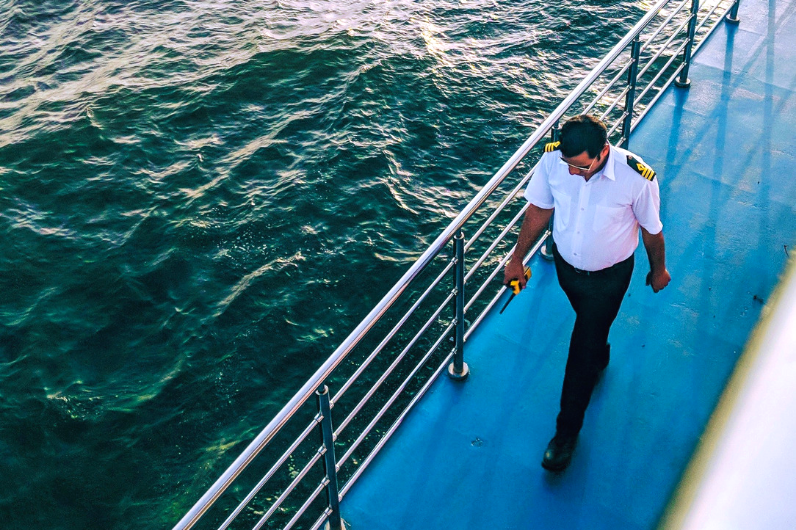
Job Role of a Superyacht Captain
As a rule, the smaller the yacht, the more hands-on the Captain must be. The larger the yacht, the more administrative duties the Captain will hold. A superyacht Captain specialises in commanding and managing luxury yachts over 24 metres in length.
Every crew member falls under the ultimate command of the Captain and will answer to him/her.
What does a Superyacht Captain do?
As a superyacht Captain, you’ll be at the top of your game, responsible not only for the yacht itself, but also for its crew, itinerary and navigating safe passages across the oceans. You’ll be in control of budgeting, administration, refit projects, yard visits, personnel, health and safety, to name but a few.
Personality traits
What personal traits are beneficial for this role.
You will need great communication skills to deal with owners, contractors, crew and guests alike. You will be dedicated to a career at sea and will already have established yourself in the industry having worked your way up the deck officer ladder building a reputation as a first-class professional along the way.
As a Captain, you must be highly skilled at dealing with people, both crew and the owner/guests. Personnel management skills are critical within this role.
Skills required to be a Superyacht Captain
What skills or experience are required.
Captains must have considerable maritime experience and training. A Captain of a superyacht has to have excellent seafaring knowledge, a good grasp of accounting, IT and administration and also deal with authorities on matters such as paperwork and health and safety.
Previous experience of yacht handling is essential and handling a yacht of the same or similar sizes a distinct advantage.
Benefits of being a Superyacht Captain
Your role really will be all-encompassing and you’ll answer to the yacht’s owner about all the decisions you make. A career as a superyacht Captain is demanding but rewarding. You’ll enjoy worldwide travel and earn a fantastic salary of anything from €4,000 per month with no cap on salary!
How to start your pathway to become captain?
More than just a love of the sea and a captain’s hat are needed to start a career as a superyacht captain. This is a career path that requires commitment, training, and practical experience. Enrolling in classes that offer the required maritime qualifications is the initial step. Take the Superyacht Cadetship Course as your first step into this fascinating industry. This extensive programme gets you ready for the rigours of the open sea by fusing classroom instruction with real-world sea experience. It is essential to network within the industry, and UKSA offers a helpful community that helps you take advantage of opportunities and pick the brains of industry experts. And never forget that your love of the sea serves as your compass; follow it to become a captain.
Career prospects
Be inspired graduates return to uksa to hire crew and further their training.
“We trust in UKSA because we did our training there and can vouch for its quality. Because the courses are all-inclusive they run back-to-back which really helps with fitting around our schedules. It is the best place from which to hire successful crew because the career courses are similar to a university degree. UKSA students devote time to their training and so are looking to stay with a boat for at least two seasons. This is valuable to us as we take time to invest in our crew and training – with UKSA we also know what to expect.” Officer Daniel Lambert
- MY Icon – 6 generations of UKSA trained crew now all working together
- Dan Snook – Planning to come back to UKSA for his Master 3000gt modules
Register your interest
- First name *
- Last name *
- How did you hear about UKSA? * –None– Campaign Dinghy Show Educational Visits UK Event GroupAccommodation.com Guardian Media IOW College IOW County Press London Boat Show Online PlanMySchoolTrip.co.uk Press Radio Referral School Travel Organiser Social Media Southampton Boat Show Top School Trips UKSchoolTrips.co.uk Visit IOW Yachts & Yachting
- General notes
- Opt-in to receive course information and relevant offers
- Accept Privacy Policy and Terms and Conditions .
- Phone This field is for validation purposes and should be left unchanged.
If you have any questions or need to get in touch:
Speak to UKSA on +44 (0)1983 294941 or email us
Essential Guides
Ocean Mapping
New to Yachting
Yacht Captain jobs
Your new adventure awaits.

Photo of Captain Sally-Ann Konigkramer
Explore more yacht roles
Other essential guides.

Mandatory certificates

What you need to know about B1/B2 visa

Download yacht crew CV templates

How to write a memorable yachting CV

How to prepare for a yacht interview?

What are the two main yachting seasons?

Big yacht crew hubs you should know about

Is yachting the right choice for me?

Yacht crew salary guide
Leading from the helm as a Captain is undoubtedly one of the most fulfilling and rewarding career paths in the superyacht industry.
The Captain holds the most senior position onboard a yacht and the one responsible for the overall operation of the yacht, the safety of its crew, owners and guests. It’s an all-encompassing position where excellent navigational capabilities are coupled with a high level of administrative and managerial skills.
The role differs depending on the size of the yacht, its usage and its cruising itinerary. Captains on smaller yachts need to be hands-on problem solvers and multitaskers. Under 35m, for example, the Captain’s position also encompasses the role of an Engineer, whilst on larger yachts the Captain has dedicated teams and Heads of Departments under their command.
What does a yacht Captain do? | Yacht Captain Job Description
Commanding the yacht and navigating safe passages across the oceans is just a small part of a Captain’s job. A yacht Captain is also in control of overall safety, crew management, budgeting, administration, refit projects, voyage planning and adhering to all international maritime regulations (ISM, MARPOL, SOLAS).
The responsibilities of a yacht Captain include:
Safe navigation and operation of the yacht
Ensuring that the yacht is in all respects compliant with the relevant laws and regulations
Ensuring that the yacht is prepared for annual flag surveys, annual class surveys and port/flag state controls
The setting of budgets and budget management
Hiring, leading, appraising and dismissal of crew
Overseeing the maintenance of the vessel
Ensuring legal and regulatory compliance
Managing yacht refits and surveys
Managing fuel costs and dockage fees
Being an ambassador for the yacht, hosting and entertaining guests as required
Voyage planning
Soft and hard skills required to be a yacht Captain
Successful Captains are excellent leaders, able to set a common goal for their crew and able to communicate with owners, guests, crew, contractors and brokers alike.
The skills of a successful yacht Captain include:
Excellent leadership, management and diplomacy skills
Excellent yacht handling and navigation
Ability to stay calm in difficult situations
Good grasp of finance and legislation
Excellent communication and interpersonal skills
Organisation and administration skills
How to become a yacht Captain?
Maritime training and sea-going experience is required. Positions are qualification based, from a Master 200, Master 500, Master 3000 and up to a Captain Unlimited. Training may be completed in a National Maritime Academy, a university or a specialised Sailing School.
Mandatory certificates needed to work on board a yacht
All crew members regardless of position and seniority need to have a valid STCW Basic Safety Training certificate, along with a recognised Seafarers medical certificate, the most popular being the ENG1 which is issued by an MCA (Maritime and Coastguard Agency) professional medic.
Without these two certificates, it is not possible for crew to work on board a yacht and a Recruiter will not be able to assist you in finding work onboard a yacht. For more information about mandatory certificates please visit our Mandatory Certificates Guide .
Are you ready to secure a Captain position on board a yacht?
Become a member of YPI CREW and connect with our recruiters so they can guide you through your job search.
Each of our recruiters is specialised in crew placement for a particular department and they will do their best to get you an interview on board a yacht. They will also advise you on how to best present your experience and skills and prepare for a yacht job interview.
YPI CREW TEAM
Ypi crew recruiters in charge of captain recruitment.

Ulrica Lindström
Head of Captain and Officer Department

Captain and Officer Recruitment Specialist

Caitlin Sorrell
Let’s get started. call us on +33 (0)4 92 90 46 10 or email us., our mission, vision and values, mlc 2006 compliance, essential guides, yacht crew positions.
Chief Officer
Second Officer
Third Officer
Chief Engineer
Interior Crew
Head of Service
Head of Housekeeping
Specialist Positions
Spa Manager
Spa Therapist
Personal Trainer & Yoga Instructor
Hairdresser
Mandatory Certificates
B1/b2 visa information, how to write a memorable cv, how to prepare for an interview, yachting seasons, yacht crew salary guide, is yachting the right choice for me, cv templates, ocean mapping, new to yachting.
+33 (0)4 92 90 46 10

Why Obtaining Your Captain‘s License Is Essential
How to get your captain's license and pilot your own yacht.
If your boat is longer than 9 metres, without a skipper’s or captain’s license, you cannot legally take it out to sea.
That kind of defeats the purpose of owning a boat, right?
Earning a captain’s license and being able to confidently pilot your own yacht will be your passport to traversing our planet’s beautiful oceans. You will have the freedom to explore the seas to your heart’s content without a care in the world.
Getting the right certification for your requirements, be it a Day Skipper , Coastal Skipper , Local Waters Skipper or Yachtmaster Offshore Certificate of Competence , will allow you and your sailing companions to get the most out of your yacht and enjoy it to the maximum.

Become a yacht captain by acquiring your captain's license
If you already have significant sailing experience, you may want to go the self-study route and simply take your exams at an accredited sailing school.
If you are new to the world of sailing, you’ll want to choose a reputable sailing school. They should provide you with the necessary practical and theoretical training to confidently captain your yacht.
Here are the various Certificates of Competency (COCs) or 'Captains Licenses'
- Inland Waters Skipper
If you hold this license, you will be qualified to skipper a sailboat inland during day and night.
- Day Skipper
This skipper’s license will qualify you to captain a sailboat at sea in local waters from sunrise to sunset. Local waters are defined as 15 nautical miles, or 25 miles, from your home port, given that they are no more than 15 nautical miles from an approved safe haven.
- Local Waters Skipper
Holding this license, you will be qualified to skipper a sailboat at sea by day or by night in local waters, as defined for the Day Skipper’s license set out above.
- Coastal Skipper
A Coastal Skipper‘s license will qualify you to skipper a sailboat on any coastal passage, as long as it is within 40 nautical miles of the coast, day or night.
- Yachtmaster Offshore
A Yachtmaster Offshore skipper’s license will qualify you to captain a sailboat on any extended or ocean passage.
- Yachtmaster Ocean
A Yachtmaster Ocean certificate is a badge of honour, indicating that you have mastered celestial navigation.

To sail around the world, you will need a captains license!
You will need your international accreditation through the Royal Yacht Association or International Yacht Training if you wish to skipper a yacht or superyacht as a career.
International Certificate of Competence
If you plan to sail your yacht around the world, you’ll have to obtain an International Certificate of Competence (ICC) . The ICC has been likened to an international driver’s license for boats.
If you have your sights set on the waters of Europe and the Mediterranean, you will need an ICC to do so legally. However, it is essential to note that the US and Canada have different international captain license requirements and do not recognise the International Certificate of Competence.
You will have to contact a Royal Yachting Association affiliate to obtain an ICC in North America.
COCs - start your captain's license from the beginning
The various Certificates of Competence are progressive, so it makes sense to start with your Day Skipper’s license , and progress to your Yacht master Offshore captain’s license from thereon.
An important consideration to keep in mind is that the Certificate of Competence you select will very much depend on your individual needs and circumstances.
For example, the requirements for a Recreational Sailing Certificate of Competence differ from a Commercial Sailing Certificate of Competence . So, your motivation (recreational, commercial or professional international sailing) will determine which skipper training course you select.
There are also some necessary prerequisites that have to be met before any sailor can apply for skipper’s license training. They are:
- All candidates must be at least 16 years of age
- For ocean sailing, candidates need a radio operator’s certificate valid for operating a marine VHF radio in South Africa
- All candidates will have to pass a basic eye test. If you are colour blind, you will not be able to proceed past the Day Skipper Certificate of Competence
- Candidates for the Coastal Skipper Certificate of Competence and above must have a current and valid Level 1 First Aid Certificate
- All candidates will have to produce a logbook of experience to get their qualification. The required expertise to be logged varies depending on the certification course.
Here you will find lots of information on the various sailing Certificates of Competence (or skipper tickets, as they are also known) available to you.
Just keep in mind that such certificates (and what they will legally qualify you for) vary from country to country.
If you are a non-SA citizen, you will have to research your country’s legal requirements for the various sailing Certificates of Competence.
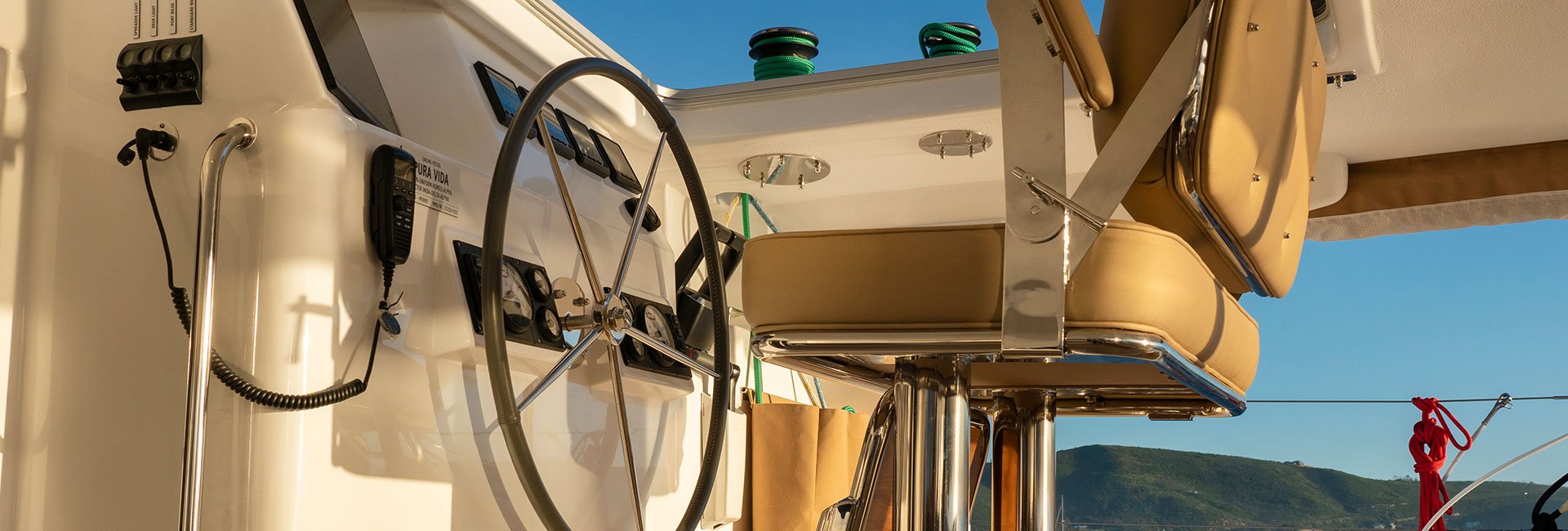
How long does it take to become a yacht captain?
This will depend on the skipper’s course you decide on. To obtain certification in basic sailing skills is quite affordable and could take as little as three weekends to complete.
Courses like the Yachtmaster Ocean Certificate of Competence are much more comprehensive, intensive and costly. This course takes about 17 weeks to complete.
Why getting your skipper’s or captain’s license will be worth every cent
Unless you have a sailing crew (including a qualified skipper) at the ready, it will be absolutely worth your while to obtain the necessary credentials to skipper your yacht yourself.
South Africa has many reputable, accredited sailing schools. They can provide you with all the information and training you need to obtain the captain’s or skipper’s license that is right for your requirements.
Undergoing the necessary practical and theoretical training will give you all the knowledge and experience to sail your boat with confidence.
What’s more, your skipper’s license training is likely to be an exhilarating adventure in itself.
It is also an excellent way to meet other sailing enthusiasts who might just become friends for life.

Yacht Maintenance - Top Tips for Protecting Your Investment
Essential things to know about boat insurance, top things to know about yacht solar power, building a yacht: top things to know about the yacht-building process, get all the latest to your inbox, discovery awaits.

- Yachting for beginners
- Owning a yacht
- Motor Yachts
- Sailing Yacht
- Indian Ocean
- Mediterranean
- Buying or Selling a Yacht
- Yachting Events
- FAQ – Luxury Yacht Charter
- FAQ – Buying a Yacht
- FAQ – Sell your Yacht
- How Much Does It Cost To Charter A Luxury Yacht?
- All our Blog Post & News

Yacht crew positions : Hierarchy, Missions & Salaries explained
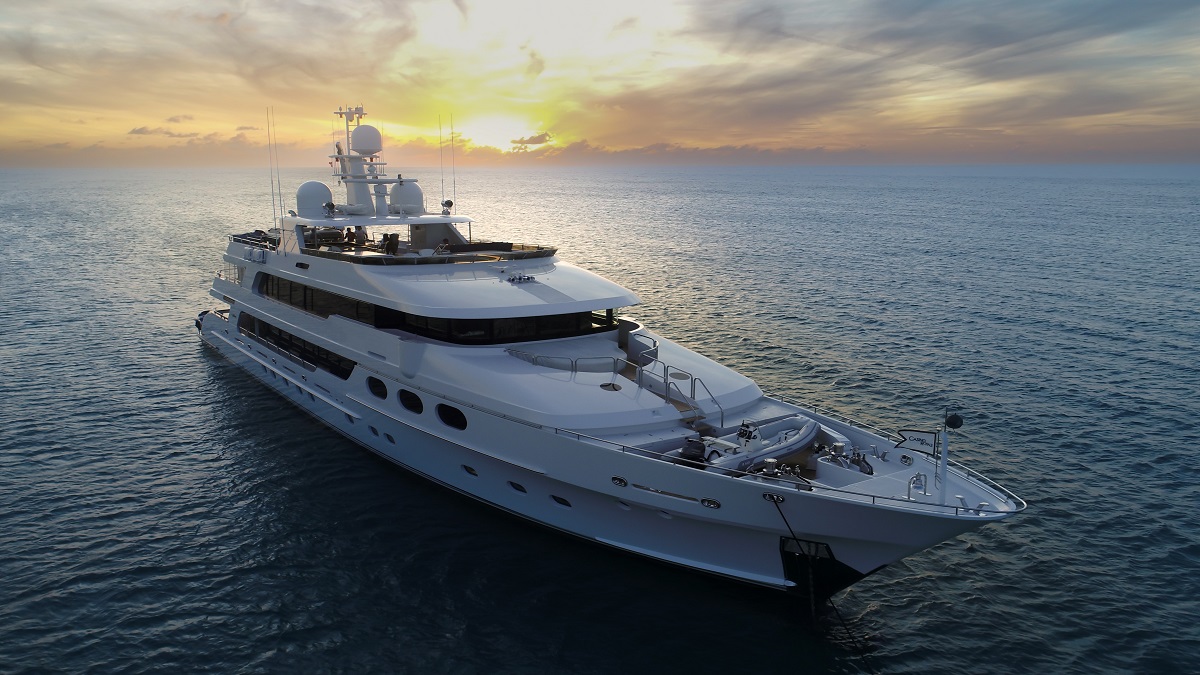
Like any well-run hotel, restaurant, or other luxury service, a crewed yacht needs organized structure and good management. Whether you’re staffing your own luxury vessel or looking for an exciting career working and traveling the world, you need to know how this structure works, and what you can expect to pay or earn and do in the various roles on board.
Every yacht is a little different, and organization may reflect the style of the captain or the demands of the owner. But the same jobs need to be done on almost every boat. Organized with ranks, heads of each division report to the Captain. It’s not a military-style organization, but there are parallels with merchant marine grades and structures.
Smaller yachts need fewer crew, and staff may wear multiple hats that cross more traditional divisions and may combine some jobs with others. Large yachts have more distinct divisions or subdivisions, with more specialization to divide tasks and manage staffing. The core skills are the same, but finding staff with the right blends to do the jobs is key. Crew with broader skills are highly sought after.
As a yacht owner, you shouldn’t have to worry about day-to-day management decisions or organizing all this. That’s why you have a captain, and it’s better to leave staffing decisions entirely up to him or her. But it’s still important to know what it is people you’re hiring do, why they’re there, and how many you need. You don’t want too many crew, or to be short-handed. An understanding of what your yacht needs helps you talk to the captain to keep your yacht running how you want it.
For those looking to break into yacht crew work, consider your skills and strengths, and what jobs appeal to you. You’ll need training before you work, and you can direct your job path through the training you seek. Your goal is a suitable position on a well-run yacht, so make yourself the most attractive candidate possible.
Yacht Work Life
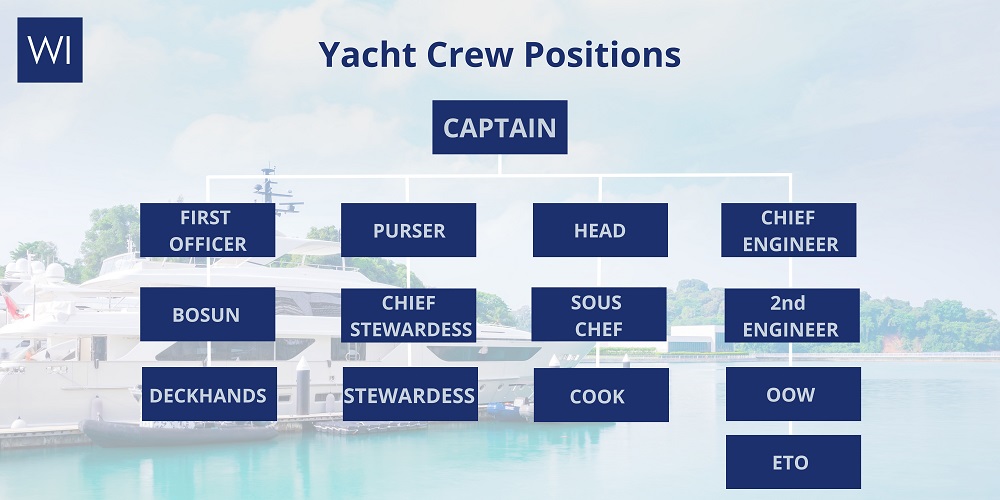
Working on a yacht is also living on the yacht. Crew must have a space to sleep, food, and all the basics that any employee needs. Large yachts have space reserved for crew, and owners looking for quality crew should provide good working and living conditions. Your crew takes care of you, and you should take care of them.
Depending on where a yacht operates or what flag she flies, a variety of labor laws or rules may be in effect. These requirements may be for work visas, contracts and written agreements, and compliance with merchant and ship crew treaties and laws. Be prepared to have work and non-disclosure agreements between yacht and crew, though a few yachts skip this.
Seasonal Jobs
Many yacht positions are seasonal. Year-round employment is more likely for senior crew like the captain and department heads, but not all yachts see year-round use. And some yachts may use different crew in different locales between seasonal moves.
Any job listing should give seasonal information, with geographic information, the length of the season, and the prospects for year-round positions and repeat employment.
Hours, Salaries, and Expectations
Yacht crew is a service job at its core, and every yacht owner is looking for service-oriented people who understand how to deliver a hotel-quality living and restaurant-quality fine dining. Work experience in luxury hotels and restaurants is a big plus for some jobs, and makes breaking into yacht work easier.
Yacht work can be very demanding, with periods of intense work when the owner and guests or a charter party is on board. Long days aren’t uncommon, but often balance with slack time when the boat is empty of passengers. There is always work to be done, but there’s usually a chance for time off.
Most salaries are monthly, since many positions are seasonal. Pay ranges are commensurate with experience, rank, and responsibility. Private vessels usually offer higher base pay, as charter crew can earn tips on top of their base salary. Because of the demands of the lifestyle, compensation is good and you have minimal living expenses on board.
Benefits and Time Off
Because so many jobs are seasonal and may occur in different countries and locations, benefits offered to yacht crew vary widely. But it is not uncommon for crew to be offered health and accident insurance and a flight to the vessel. Living on board, you’ll get food, rooming (usually shared), basic toiletries, uniforms, and laundry. Yachts with a longer view may offer additional training to long-term prospects.
Time off is usually linked to boat use, and may be sporadic in-season or when the boat has the owner and guests on board. There will always be some time off, but it may be between very intense work periods.
Most crew jobs have an employment contract that meets the Maritime Labour Convention 2006 (MLC). This should spell out the contract period and duration, as well as salary, leave and time off, probationary periods, repatriation policies, and any other crucial details to meet the minimum international standards of crew welfare.
This contract should also contain shipboard policies on confidentiality and non-disclosures, drug and alcohol use on board, personal hygiene expectations, interpersonal relationships, and dispute resolution. Job expectations and requirements can also be included, with specific language about roles, tasks, and cooperation between divisions.
Note that all crew agreements will explicitly prohibit drug use on board, most limit alcohol consumption and ban hard liquor on board, and many boats have policies prohibiting intimate personal crew relationships. Because the crew is living on board full time and in close quarters, rules to maintain decorum and crew harmony may be in writing.
Training & Certificates
Two key certifications are required for yacht crew. Employers look for the STCW (Standards of Training, Certification and Watch-keeping for Seafarers) and the ENG1 (Seafarer Medical Certificate). Insurers generally require crew to have these two certifications or the equivalent.
The ENG1 isn’t a class. It’s a medical exam to ensure that the crew is physically fit to serve at sea and has no underlying conditions that may arise far from help. It’s best for prospective crew to secure the ENG1 before investing more time and money training.
STCW is a week-long class on the basics of onboard safety. This includes hands-on modules covering personal survival, fire safety, first aid and CPR, accident prevention, and security awareness. It needs to be refreshed every five years.
Shared, Hybrid, and Crossover Jobs
Larger vessels will have more defined duties and specific areas of responsibility. But smaller yachts may want the crew to have different roles in different situations. For example, a hybrid job description may read “3rd Engineer/Steward” and describe a role in engineering when the boat is empty but on inside crew when passengers are on board.
When hiring or seeking jobs be prepared to look for creative crossover skill sets to meet the needs of the vessel.
Extra Skills and Duties
Any extra skills outside the regular duties makes crew more attractive. From stewards who can teach yoga, give massages or play cocktail piano to deck crew who know how to water ski, SCUBA dive, or fish, anything that crew can bring to enhance the passenger experience adds value to the employee.
If you’re looking for a position, list the skills you’d be comfortable using. If a vessel owner is looking for something specific, spell it out and figure out how that special duty fits into the employee work day.
The Four Main Divisions

Most yacht crews break into four primary divisions which group related tasks and responsibilities together. While the grouping sounds like it’s by section of the boat, they’re really more functional. For example, stewards (Interior) will definitely serve meals, whether they’re in the main dining room or out on deck. Deckhands (deck) are going to be involved in painting, sanding, and varnish jobs anywhere on the boat.
The deck crew handles most of the exterior operations of the yacht, and runs it. Deck hands and crew keep the boat looking clean and shiny, and handling most vessel operations. This includes driving and operating the yacht, navigation, running all launches and ship’s craft, handling lines, and all maintenance and painting, washing, and shining.
2-Interior (or Inside)
Inside crew are primarily the stewards and housekeepers. Larger vessels will have a dedicated housekeeping staff separate from the stewards, but smaller vessels may not.
Stewards keep the interior clean, do all housekeeping, laundry, food and beverage service, cabin preparation, and anything else needed for the comfort of the passengers.
3-Engineering
Below decks, the engineering department ensures the safe and smooth running of all the ship’s machinery and electronics. Engineers are engine and systems specialists, and there will usually be a dedicated electronics expert. Most engineer jobs require professional training and certification.
Fine dining is a hallmark of the yachting experience, and a full-time galley crew prepares all meals for passengers and crew. The head chef plans the menus and provisions the boat, while junior chefs assist the head chef with meal preparation and keeping the galley spotless.
Yacht Job and Department Details
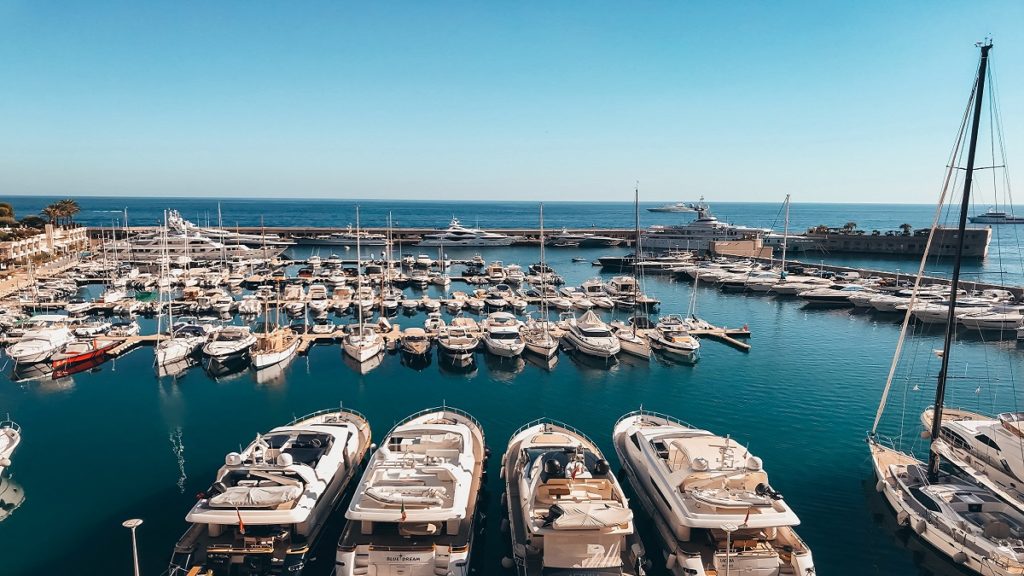
Departments are all organized in a hierarchy, with a department head reporting to the Captain. The clear chain of command makes for smooth operations, with all communications going up and down ranks. Junior staff will occasionally take instructions from other divisions as all crew is expected to help as needed. A captain or department head may organize staff differently, so reporting structures listed are guidelines only.
All salary ranges are monthly figures and are ranges based on yacht size and crew experience. Senior jobs on larger yachts have more responsibility than the same job title on yachts with smaller crews. Experienced crew are very desirable and can expect more pay for their positions.
Listed responsibilities are not exhaustive, and different yachts may allocate some jobs to different positions.
Read also: The yacht charter experience ladder
The Captain

The captain of the vessel is the overall decision maker for the yacht in all situations, including the safety of the vessel. The owner should leave the Captain responsible for operational decisions about hiring and staff and operating the ship. To become a captain requires years of experience and training, and a broad set of skills including yacht operations, personnel management, budgeting and finance. The captain works directly with the owner and owner’s representative, if the captain is not also acting as the representative.
On an organization chart, the Captain is usually placed in the deck division, but the Captain is always the senior-most crew on the yacht and all division heads report to the Captain.
Responsibilities include:
- Responsible for all navigation and running the yacht.
- Senior decision maker on all crew hiring.
- Manage repairs, refits, and yard work.
- Manage budgets and accounting. On larger yachts, this task ends more on the Purser, but the captain is always responsible.
- Ensure all paperwork, clearances, and legal requirements are completed.
- Primary contact with the owner or charter parties.
Reports to: The yacht owner
Salary Range: $6,000 to $22,000
The deckhands handle all the outside responsibilities of the ship, including cleaning and maintenance of the yacht and all the ship’s vessels and toys on board. Deck crew will have significant contact with passengers in this role, operating launches and delivering guests to and from shore and handling the toys.
All deck crew have watch responsibilities on passage, and daily responsibilities keeping the yacht pristine and clean. They will also do line handling and secure the yacht.
Deck department : Chief Mate/First Officer
The Chief Mate or First Officer is the second in command of the vessel, and left in charge when the Captain is not on board. The first mate has the requisite skills to stand in for the captain and run the yacht if needed and usually acts as the division head of the deck team.
The seamanship skills needed are similar to the Captain’s position.
- Primary safety officer for the yacht and all passengers and crew.
- Supervise and manage all operations on deck.
- Bridge watches on passage.
- Passage planning and navigation.
There may be additional mates on larger vessels, these 2nd, 3rd, etc. mates have similar responsibilities on rotation. But the first mate is senior and always second in command.
Reports to: Captain
Salary Range: $4,000 to $9,500 (First mate)
Second and more junior mates may earn $2,000 to $4,000
Deck department : Bosun
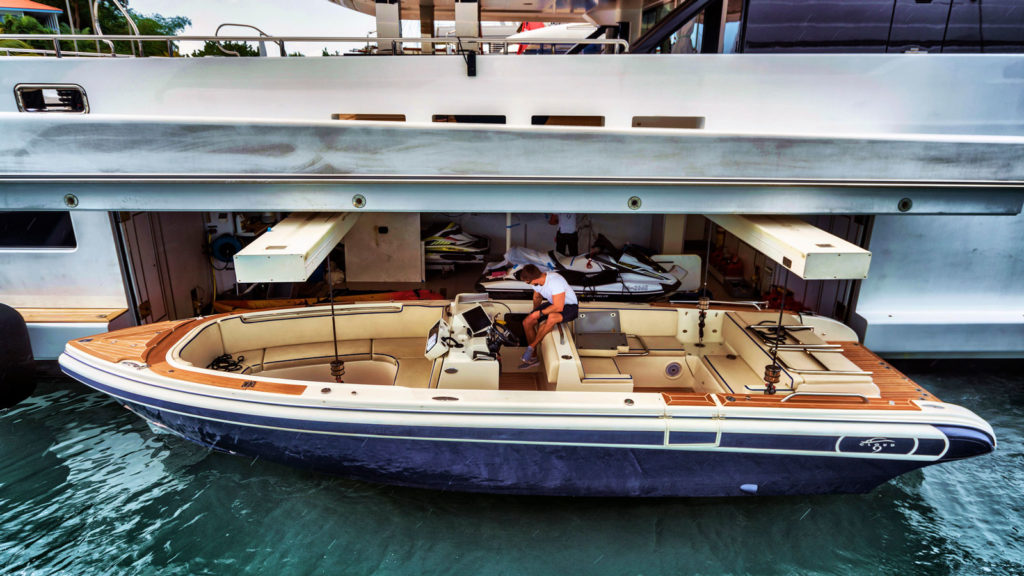
The Bosun is the senior deckhand and manages the junior hands on board. This will usually be the most experienced hand on board.
- Organizing all operations on deck.
- Coordinating the use, storing and launching of the ship’s boats, toys, and equipment.
- Managing the passerelle, watching passenger safety.
- Contact point for guest service on boats, toys, and trips to shore.
Reports to: First mate
Salary Range: $3,000 to $5,000
Deck department : Deckhands
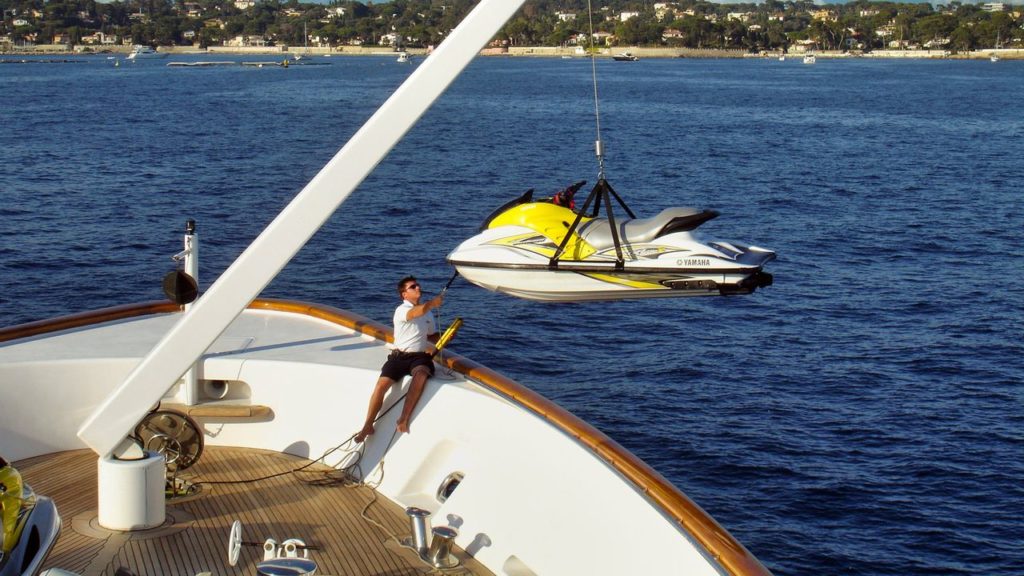
Deckhands are constantly busy with maintenance, cleaning, polishing, and assisting guests as needed. They will assist other departments as needed or given special duties.
- Daily cleaning of the yacht’s exterior.
- Painting, varnishing, polishing.
- Line handling.
- Launching and operating dinghies and tenders.
- Repairs and carpentry.
- Helping guests as needed – everything from handling baggage and gear to embarking and disembarking.
Reports to: Bosun
Salary range: $1,300 to $3,000
Though every position on a yacht is service-oriented, the interior or inside crew provides the primary customer service. They will interact the most with the passengers daily, and they’re directly responsible for the quality of their experience on board.
Interior department : the Purser
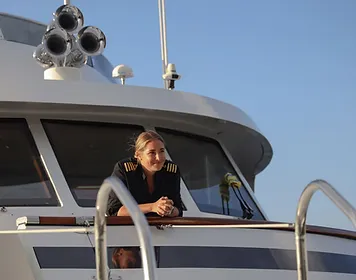
The purser is the chief financial officer of the yacht and handles all the financial operations on board. Accounting, purchasing, payroll and hiring, and all money matters end up with the Purser. This is a senior staff position, and may be the interior department head. Smaller yachts may eliminate the purser’s job and add it to the captain’s and other senior staff duties.
Responsibilities Include:
- Accounting and bookkeeping for all financial transactions.
- Human resources and payroll.
- Handling logistics for all departments related to purchasing.
- Managing contracts.
- Event coordination, including off yacht bookings and payments.
- Primary administration of the boat’s business paperwork.
- Inventory and supply management.
Salary Range: $4,000 to $8,000
Interior department : The Chief Steward/ess

The chief steward or stewardess has primary responsibility for all service roles inside. Food and drink service, cabin preparation, and anything to do with helping the passengers be more comfortable and enjoy their stay. The chief steward will be inside crew with several years of experience.
The chief steward manages the interior staff, setting and enforcing vessel service standards. The chief steward ensures the crew delivers a five-star hospitality experience.
Chief Steward Responsibilities:
- Scheduling and training junior crew for meal and drink service and cabin preparation.
- Primary contact with guests for meals and drinks.
- Sommelier and wine service.
- Coordinate with the galley for meals and presentation.
- Decorate the interior, from flower arrangement to table settings.
- Arrange onshore activities and outings.
Reports to: Captain or Purser, depending on the yacht
Salary Range: $4,000 to $8,500
Stewards/Stewardesses
The stewards and stewardesses are the primary guest service staff. They will work closely with guests and passengers, and have daily contact with them as they meet most of their needs while on board.
Steward Responsibilities:
- Food and drink service.
- Room preparation and turndown service.
- Cleaning, polishing, housekeeping, and inside maintenance.
- Cabin detailing.
- Laundry, pressing, and folding.
- Help with outings, trips, debarkations.
Reports to: Chief Steward
Salary Range: $1,500 to $4,500
Housekeeping

Larger yachts may have a dedicated housekeeping and laundry staff. This will be part of the inside crew, under either the purser or the head steward. There may be a senior housekeeper, if there are more than one housekeeping crew on board.
Responsibilities are the cleaning and laundry portions of the steward’s job, and a laundry steward may spend most of her time inside the ship’s laundry.
An experienced Head of Housekeeping may earn from $4,500 to $7,000, while a Laundry Steward typically earns from $2,500 to $3,500.
Read also: CAN OWNING A YACHT TO CHARTER (REALLY) BE PROFITABLE?
Food service requirements on any yacht are high. Whether it’s a privately owned vessel or a charter, the expectations are always for top tier food service, with a variety of meals planned for the requirements of every passenger. Chefs and cooks prepare all meals on board for passengers and crew, but sometimes other interior crew may help with prep work or cleanup.
Smaller yachts have smaller galley crews, but the largest vessels may have an executive chef and several sous chefs. All chef positions require formal culinary training and experience, but cook positions are often entry level. Promotion from cook to chef is unusual without additional training.

Galley department : the Head / Executive Chef

On larger yachts, an Executive Chef will run the entire galley with the help of sous chefs and cooks. With an Executive Chef, there’s an expectation that the food and menus will be on a level with Michelin star-rated restaurants.
The executive chef brings a thorough understanding of food preparation and presentation, and moves food preparation past creative up to artistic. Job responsibilities are similar to a chef, but the job demands and the required experience and education are much higher.
Salary range: $7,000 to $11,000
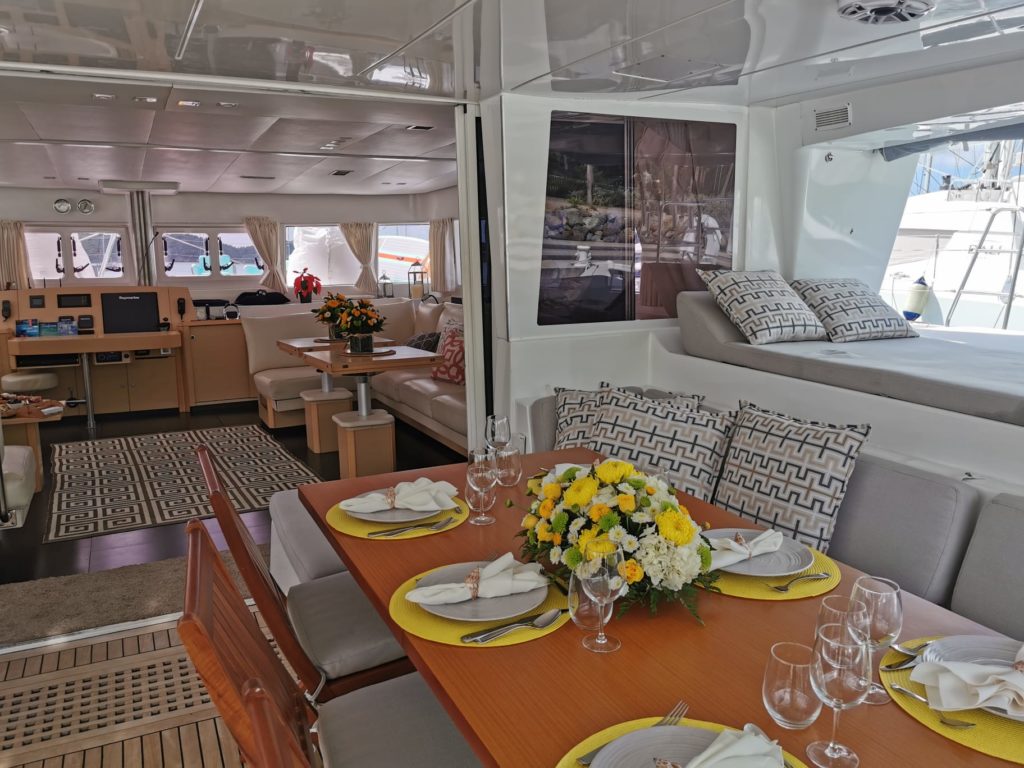
The chef has overall responsibility for all meals on the yacht, from provisioning in remote places to hygiene and good safety. If there’s only one chef, she’s the head of the galley crew. Finding the best provisions in far away locations and making the best of local food availability is a major part of the job.
- Planning a delicious and varied menu for passengers.
- Sourcing all food and arranging transport to the yacht.
- Maintaining and operating within the galley budget.
- Preparing passenger meals with professional presentation and style.
- Cleaning and maintaining galley and galley equipment.
- Deliver menus and meals on time, while running an organized and spotless galley.
Galley department : Sous Chef
The sous chefs assist the chef in all aspects of running the galley, and may have independent assignments to plan and guest and crew meals. While not primarily responsible for provisioning, the sous chef will help with food selection, menu preparation, and planning. A sous chef must have formal culinary training.
Reports to: Head chef
Salary Range: $3,500 – $6,000.

Galley department : The Cook
Cooks may be entry-level positions or experienced, but do not require formal gastronomy education. They will assist the chef and sous chefs, cooking meals and dishes for guests and crew, helping with provisioning, and keeping the galley neat.
- Assist with provisioning and buying high-quality food from local sources.
- Follow all food handling and safety guidelines.
- Assist the head chef as needed, taking direction and guidance.
- Prepare guest and crew meals as required.
- Staying on top of galley inventories and supplies.
Salary Range: $2,500 to $3,500
Engineering

The engineering department keeps the yacht and all its systems working. Whether it’s the engines, electronics, air conditioning, or the plumbing – it’s up to engineering to keep it running.
There is considerable overlap with commercial shipping in the engineering field, as many of the same skills apply. And there is a broader range of qualifications and grades based on the size and power of the vessel. Job ratings may be set by required experience based on tonnage of ship or power of engines, with corresponding levels of pay and responsibility.
Unlike commercial shipping, engineers may get involved in other aspects of running the yacht, like helping with docking and water sports with mechanical toys.
Engineering certifications, training, ratings, experience and licensing are critical to hiring competent engineers, and for engineering crew it’s an important facet of career advancement. This is important for Chief and 2nd Engineers, which are often broken out by MCA (U.K. Maritime and Coastguard Agency) rating or other international equivalent.
MCA ratings for engineers Commercial and Private Yachts over 24m are:
Y4: Less than 200 Gross Tons and less than 1,500 kW engine power Y3: Less than 500 GT and 3,000 kW Y2: Less than 3,000 GT and 3,000 kW Y1: Less than 3,000 GT and 9,000 kW
There is also an unlimited rating for merchant vessels larger than the Y1 category. For discussing salary and responsibilities, we will include all ratings in one position description, but pay scales with the size of the yacht and any required higher ratings.
Chief Engineer
The chief engineer manages all aspects of keeping the yacht and its systems running. The chief engineer manages all the engineering staff, and directs all maintenance, repairs, troubleshooting and upgrades. This is a management position, but requires extensive hands-on technical experience and knowledge. Chief engineers on large yachts hold an MCA Y1 or Y2, smaller boats will have a lower rated chief and a smaller staff. Check Jooble.org to find abroad marine engineer vacancies.
- Provisioning, shopping, and stocking.
- Preparing passenger and crew meals.
- Following instructions and cooking under the direction of others.
- Galley cleaning.
- Follow food safety and storage procedures.
- Food pre-preparation.
Salary Range: $6,000 to $15,000
2nd Engineer
The second engineer is also a highly skilled position requiring a rating or license and several years of experience. This senior level engineer also needs knowledge of how to troubleshoot and maintain all yacht systems.
- Maintain and manage all engineering operations.
- Hire, train and supervise all engineers.
- Project manage all upgrades and retrofits, including managing budgets, contracts, and suppliers.
- Coordinate maintenance schedule for the entire yacht around the usage and seasonal schedules.
- Maintain costs and accounting for engineering operations.
- Design and handle all safety operations.
- Set and maintain standards for operations and cleanliness in the engine room.
Reports to: Chief engineer
Salary Range: $5,500 – $10,000
OOW (Officer of the Watch) Engineer
The OOW is a junior engineering position, but still licensed. There are two categories of OOW – MEOL (Marine Engine Operator License) and the more junior AEC (Assistant Engine Course). The overall responsibilities are similar, working to support the senior engineers and handle independent assignments. The AEC rating is entry level for licensed crew, but has training and certification.
- Support the chief in all projects.
- Maintain a clean, safe engine room.
- Perform all maintenance, troubleshooting and repair tasks as needed.
- Support motorized water sports.
- Occasionally assist with other vessel operations, like line handling.
Reports to: Chief Engineer
Salary Range, MEOL: $4,500 to $6,000 Salary Range, AEC: $2,500 to $3,500
Electronics/Technology Officer (ETO)
The ETO takes responsibility for all audio-visual and information technology on board. Ensuring passengers have access to the internet, movies, television, and music is a primary responsibility. This position carries a fair amount of passenger interaction, and an ETO needs good troubleshooting skills to go with customer service skills.
- Ensure all audio/visual and entertainment systems are always available for passengers.
- Assist passengers with personal technology and ship systems as needed.
- Conduct regular maintenance and upgrades of the network, information, and A/V systems around passenger schedules.
- Assist other engineers as needed, especially with electronic systems.
- Contribute as needed with other departments for boat and passenger operations.
Salary Range: $4,000 to $9,000
Junior Engineer
This is a lower or entry level position for someone with engineering skills but without formal licensing or certification. The junior engineer will help with safety and cleanliness, and assist in any engineering tasks as needed. The ability to solve problems and fix things opens this spot for anyone capable and willing to do the job.
- Help with cleaning, maintenance, and safety functions.
- Help anywhere needed on the yacht.
- Assist senior engineers as needed, taking direction and following instructions exactly.
- Constantly develop skills.
Read also: IS BUYING A BOAT A BAD IDEA?
Whether you are a yacht owner or considering entering this dynamic industry with an established and reliable crew, it is essential to have an understanding of the yacht’s hierarchical structure, mission priorities, and salary expectations. By doing your research on the complexity of yachting before hiring your team, you can confidently select the right group of experienced and qualified professionals for your needs. Staying up-to-date on top industry trends and knowing the capabilities of each type of yacht crew position will enable you to make sound decisions that support a safe and cost-effective journey. With quality personnel at your helm, you can cruise unhindered in luxury and explore new destinations with peace of mind.
Fractional Yacht Ownership : Everything you Need to Know
What is the best country to register your yacht offshore, you might also like.

What differentiates a yacht from a superyacht or a mega yacht?
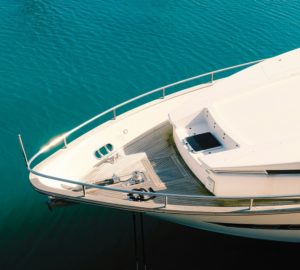
Chartering Requirements and Regulations: A Guide for Boat Owners

What are the Fastest Cruising Catamaran on the Market?
How to Become a Yacht Captain? Step-By-Step Guide
Setting sail on the high seas as a yacht captain is a dream that captivates the hearts of many. The allure of commanding a vessel, exploring breathtaking destinations, and living a life intertwined with the ocean’s vastness is undeniably enticing. However, this coveted role comes with great responsibility and requires a unique set of skills and qualifications.
In this article, we embark on a journey to unravel the path of becoming a yacht captain. We will delve into the responsibilities that come with this esteemed position and the skills needed to excel in the role. From mastering navigation and seamanship to leading a crew and ensuring the safety of all on board, the role of a yacht captain demands a comprehensive understanding of both the art and science of sailing.
While the journey to becoming a yacht captain may be challenging, it is a rewarding pursuit for those who possess a deep love for the sea and a desire for adventure. Whether you aspire to captain luxury superyachts or explore remote corners of the world on expedition vessels, this article will serve as a compass, guiding you through the necessary steps and providing insights into the world of yacht captains.
So, hoist the sails, secure the lines, and join us on this voyage as we explore the path to becoming a yacht captain and the exciting possibilities that await those who choose to navigate the oceans as masters of their own destiny.
Understand the Role of a Yacht Captain:
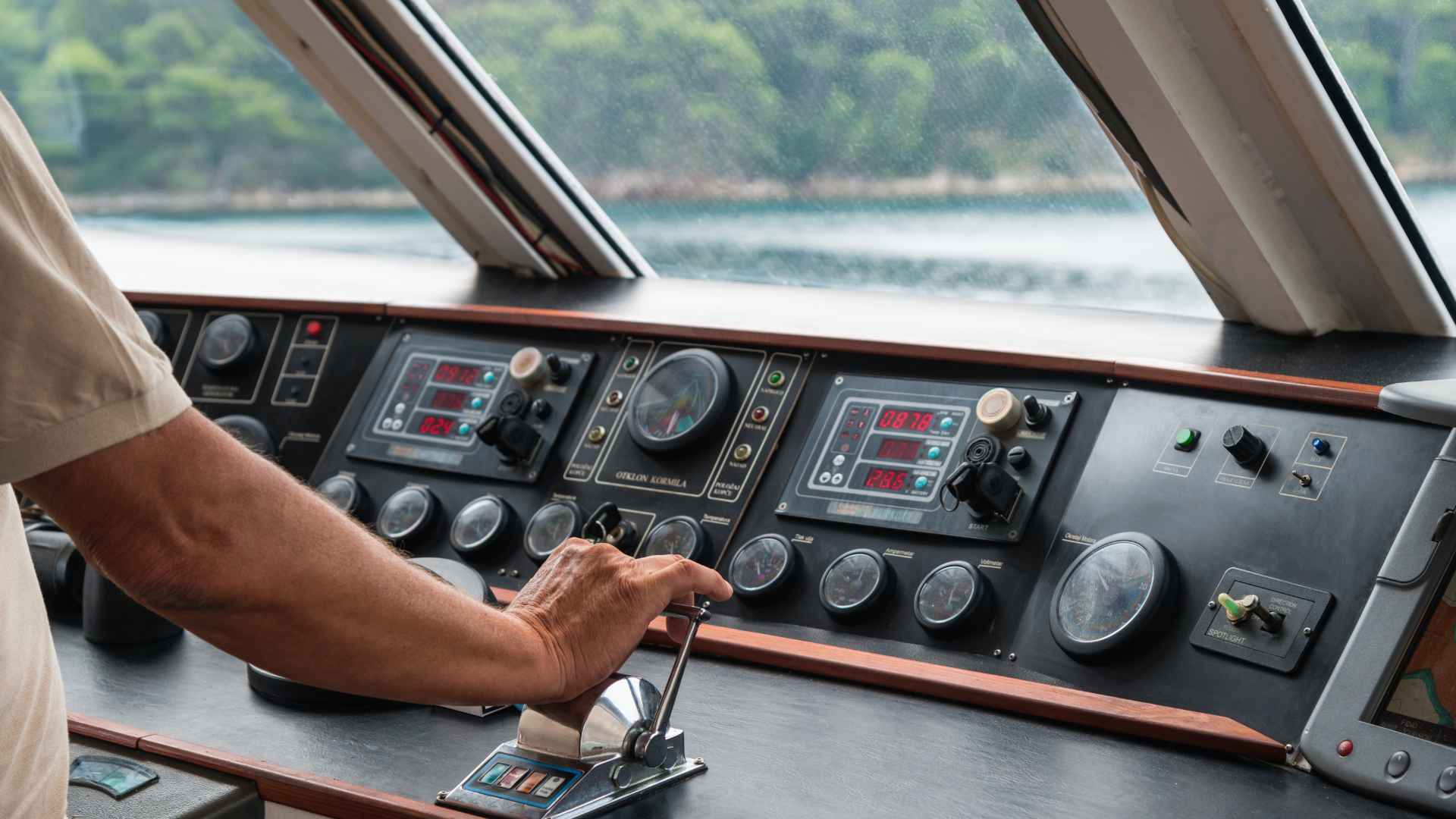
What are the primary responsibilities of a yacht captain?
The primary responsibilities of a yacht captain involve the overall operation and management of a yacht. Here are some key areas of responsibility:
- Vessel Navigation: The captain is responsible for safely navigating the yacht, ensuring it follows maritime regulations and adheres to navigation rules. This includes charting courses, monitoring weather conditions, and operating navigation equipment.
- Crew Management: The captain oversees the crew and is responsible for their training, supervision, and performance. They assign duties and delegate responsibilities to ensure smooth operations on board. Effective crew management involves fostering teamwork, promoting a positive work environment, and addressing any issues that may arise.
- Guest Safety: The safety of passengers and guests is a top priority for a yacht captain. They ensure that all safety protocols and procedures are in place and followed diligently. This includes conducting safety briefings, maintaining emergency equipment, and implementing appropriate security measures.
- Maintenance Oversight: The captain is responsible for the overall maintenance and upkeep of the yacht. They oversee routine maintenance tasks, coordinate repairs and inspections, and ensure that the vessel meets all safety and regulatory requirements. This includes managing budgets, inventory, and working closely with engineers and technical staff.
Effective Communication, Leadership, and Problem-Solving Skills:
Being a yacht captain requires strong communication, leadership, and problem-solving skills due to the nature of the role:
- Communication: The captain must effectively communicate with the crew, guests, and other stakeholders. Clear communication ensures smooth operations, fosters teamwork, and promotes safety on board.
- Leadership: A captain is expected to lead by example, inspire the crew, and make informed decisions in high-pressure situations. They must possess strong leadership skills to guide the team and manage various challenges that may arise.
- Problem-Solving: Yacht captains often face unexpected situations or emergencies. They need to think critically, make quick decisions, and find solutions to ensure the safety of everyone on board. Problem-solving skills are crucial for handling unforeseen circumstances effectively.
Necessary licenses and certifications required to become a yacht captain
To become a yacht captain, individuals must acquire the necessary licenses and certifications. The specific requirements may vary depending on the country and the type of vessel. Here is a general overview:
- OUPV (Operator of Uninspected Passenger Vessels) License: This license, also known as a six-pack license, is required for operating uninspected vessels carrying up to six paying passengers. It allows captains to operate charter boats, fishing boats, and small passenger vessels.
- Master License: The Master License allows captains to operate larger vessels that carry more passengers. There are different levels of Master licenses, such as Master 25, 50, 100, 200, and 500. The number denotes the maximum gross tonnage of the vessel.
Eligibility criteria for these licenses typically include:
Meeting the minimum age requirement (usually 18 years or older).
- Accumulating a specific number of sea service days, which may vary based on the license level.
- Passing a written examination that tests knowledge of navigation, safety, and other relevant topics.
- Meeting medical fitness requirements.
- Providing character references and completing an application process.
It’s important to note that these requirements can vary between countries and regions. It’s recommended to consult the maritime authority or governing body in the relevant jurisdiction to get accurate and up-to-date information on licensing and certification requirements for yacht captains.
Gain Experience and Build a Skill Set:
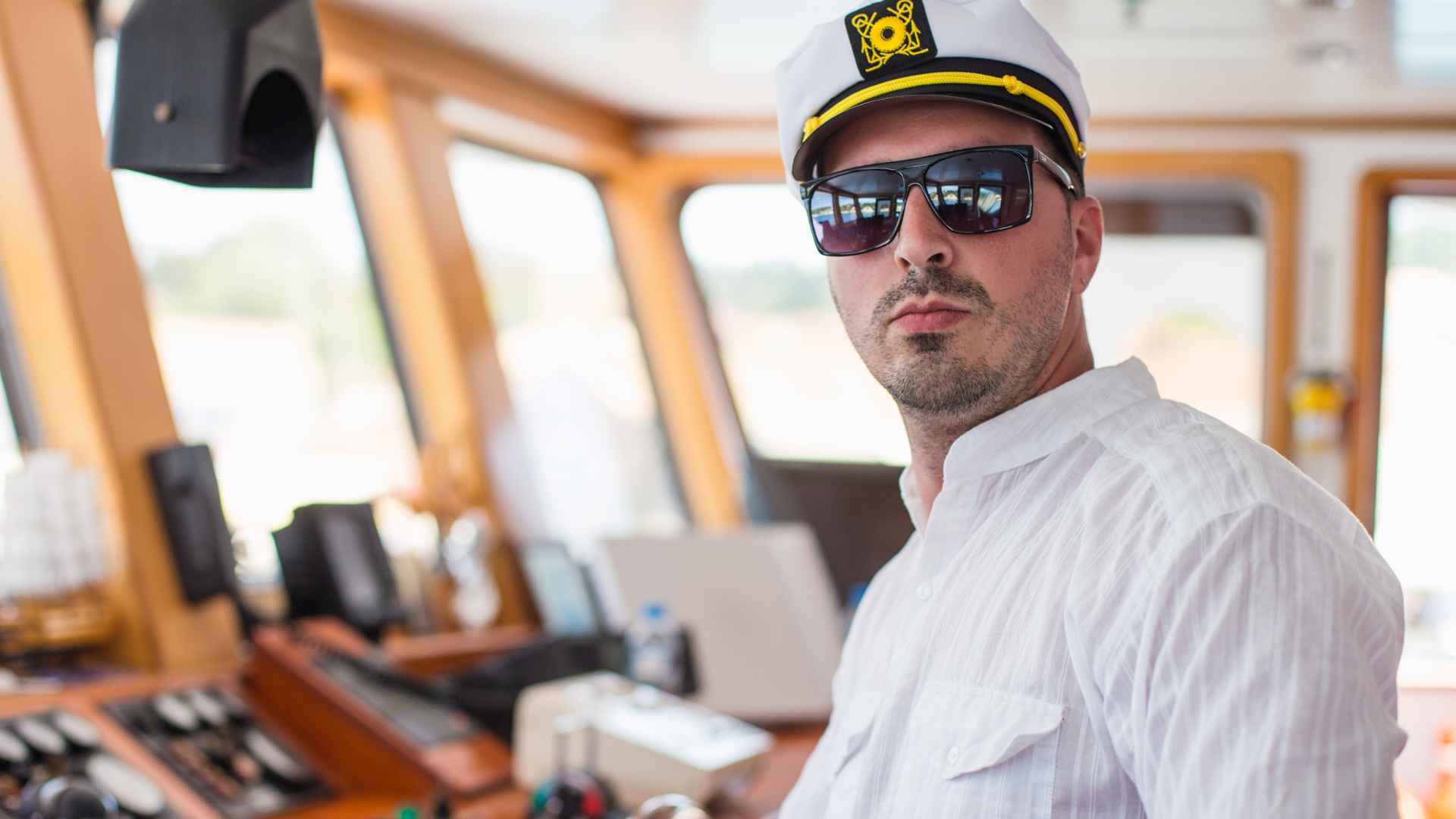
Importance of gaining foundational boating knowledge
Gaining foundational boating knowledge is essential for aspiring yacht captains. It provides a solid understanding of boating principles and sets the groundwork for further development. Here are some key points to consider:
- Understanding Navigation Rules: Familiarize yourself with the rules of navigation, including buoyage systems, right of way, and international maritime regulations. This knowledge ensures safe navigation and promotes responsible boating practices.
- Weather Patterns and Conditions: Learn about weather patterns, tides, and their impact on boating. Understanding weather forecasts and how to interpret them is crucial for planning safe voyages and avoiding hazardous conditions.
- Basic Boat Handling: Acquire basic boat handling skills, including steering, docking, and maneuvering in different environments. This knowledge forms the foundation for operating and controlling a vessel effectively.
There are various resources and courses available to help gain this knowledge. Consider taking boating safety courses offered by organizations such as the United States Power Squadrons (USPS), the U.S. Coast Guard Auxiliary, or local boating associations. Additionally, introductory sailing lessons or basic boating courses can provide valuable insights into navigation and boat handling.
Value of gaining hands-on experience by working as a deckhand or crew member on a yacht
Gaining hands-on experience by working as a deckhand or crew member on a yacht is invaluable for aspiring yacht captains. This experience provides insights into yacht operations, teamwork, and the daily responsibilities involved. Here are a few benefits:
- Exposure to Yacht Operations: Working on a yacht allows you to observe and participate in various tasks related to vessel maintenance, navigation, safety protocols, and guest services. You’ll gain practical knowledge and understand the dynamics of running a yacht.
- Teamwork and Communication Skills: Collaborating with other crew members fosters teamwork and effective communication. Learning to work efficiently as part of a team is crucial for a yacht captain, as they need to lead and coordinate the crew effectively.
- Networking Opportunities: Building connections within the yachting industry can lead to future job opportunities and career advancement. Engage with experienced professionals and seek mentorship to enhance your learning and growth.
Benefits of enrolling in professional training programs and maritime academies
Enrolling in professional training programs and maritime academies can significantly enhance your knowledge and credibility as a yacht captain. Here are a few options to consider:
- STCW (Standards of Training, Certification, and Watchkeeping) : The STCW training is an internationally recognized set of standards that provide essential safety and operational training for seafarers. This certification covers areas such as firefighting, personal survival techniques, first aid, and maritime security.
- RYA (Royal Yachting Association) Qualifications: The RYA offers a range of qualifications that are widely recognized in the yachting industry. These certifications cover areas such as navigation, radar operation, diesel engine maintenance, and yachtmaster training.
- Maritime Academies: Consider attending a maritime academy that offers specialized training for yacht captains. These institutions provide comprehensive education and practical experience, preparing you for various challenges of the role.
Investing in professional training demonstrates your commitment to the industry and enhances your skill set, making you a more competitive candidate for yacht captain positions.
Remember, gaining experience and building a skill set takes time and dedication. Embrace opportunities to learn, be proactive in seeking hands-on experience, and continually update your knowledge through courses and certifications.
Obtain the Required Licenses and Certifications:
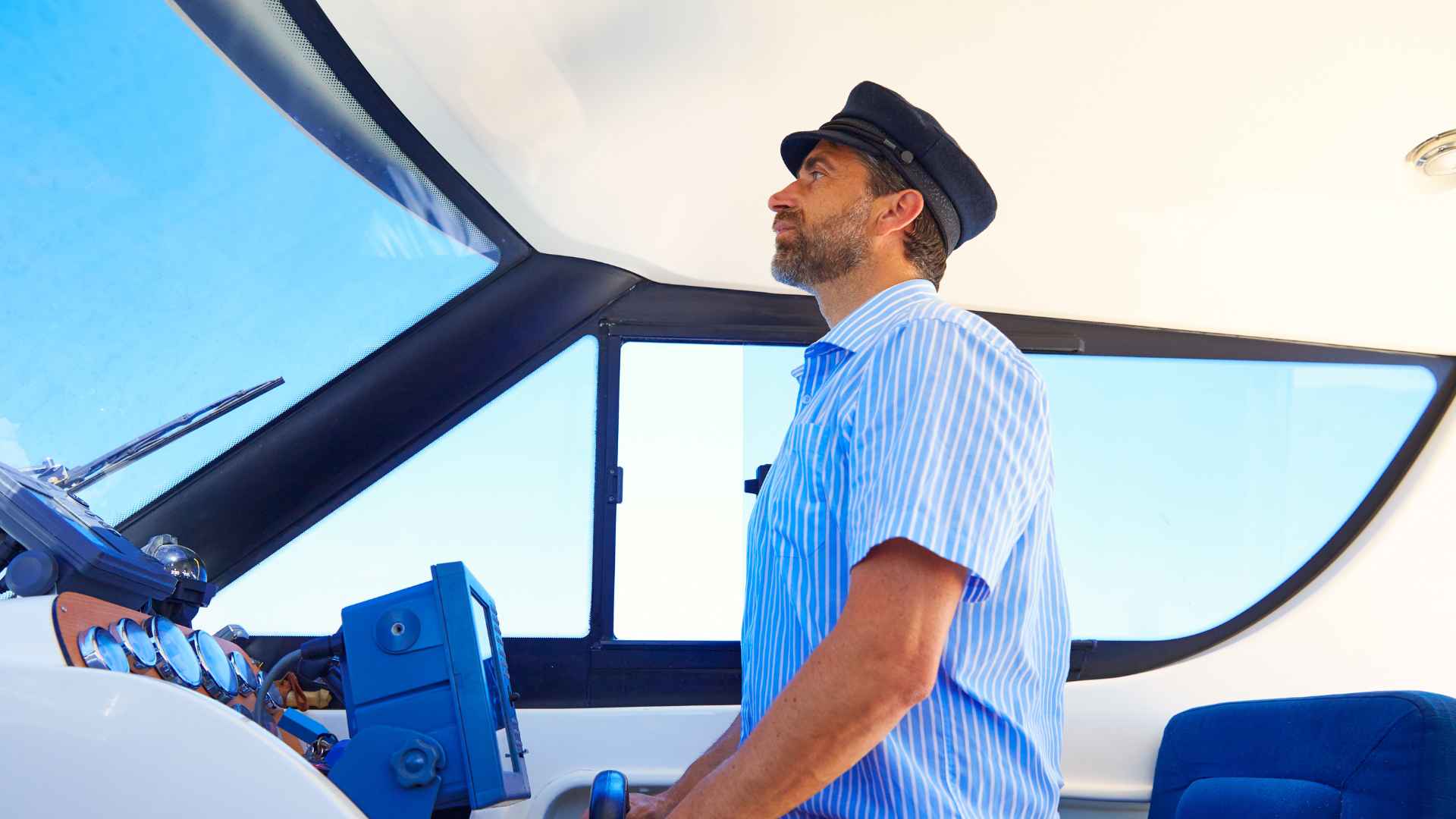
Familiarize yourself with licensing authorities:
To obtain the necessary licenses and certifications as a yacht captain, it’s important to familiarize yourself with the licensing authorities and organizations that oversee the process. The specific authorities may vary depending on the country or region. Here are a couple of examples:
- US Coast Guard: In the United States, the US Coast Guard is responsible for issuing licenses and certifications for yacht captains. They have different licensing levels, including OUPV (Operator of Uninspected Passenger Vessels) and Master licenses.
- Maritime and Coastguard Agency (MCA): The MCA is the licensing authority in the United Kingdom and is recognized internationally. They offer a range of certifications, including the Officer of the Watch (Yacht <3000 GT) and Master (Yachts) certificates.
Each licensing authority has specific requirements and application processes. It’s important to thoroughly research and understand the guidelines and regulations set forth by the respective authority in your jurisdiction.
Complete the required sea time and training:
Accruing the necessary sea time and training is a crucial step in obtaining your yacht captain licenses. The requirements may vary depending on the license level you are pursuing. Here are some key points to consider:
- Sea Time: Licensing authorities typically require a specific number of sea service days, which may include both qualifying sea service and additional time as an observer. The required sea time can vary depending on the license level and may involve different vessel sizes and types.
- Additional Training: In addition to sea time, you may need to complete additional training courses to meet the requirements. This can include training in radar operation, celestial navigation, firefighting, medical certifications like Basic First Aid or Medical Care, and other relevant topics. These courses enhance your skills and knowledge as a yacht captain.
It’s essential to maintain accurate records of your sea time and training, including the vessel names, dates, and duties performed. This documentation will be required during the application process.
Prepare for licensing examinations:
Licensing examinations assess your knowledge and competency as a yacht captain. Here are some tips to help you prepare:
- Study Relevant Regulations and Rules: Familiarize yourself with relevant regulations, such as navigation rules, safety procedures, and maritime laws specific to your jurisdiction. Study the applicable licensing guides or handbooks provided by the licensing authority.
- Navigation and Safety Procedures: Review navigation techniques, chart plotting, understanding aids to navigation, and collision regulations. Ensure you have a strong understanding of safety procedures, emergency protocols, and international maritime conventions.
- Preparatory Courses and Study Materials: Consider enrolling in preparatory courses offered by recognized training centers or maritime academies. These courses are designed to help you prepare for the licensing examinations and cover the necessary topics in depth. Additionally, study materials such as textbooks, online resources, and practice exams can aid your preparation.
Practice solving sample questions and scenarios to familiarize yourself with the format and structure of the licensing examinations.
Remember to check the specific requirements and recommendations from the licensing authority to ensure you are adequately prepared for the examinations.
By familiarizing yourself with the licensing authorities, completing the required sea time and training, and adequately preparing for the examinations, you can increase your chances of successfully obtaining the necessary licenses and certifications to become a yacht captain.
Advance Your Career as a Yacht Captain:
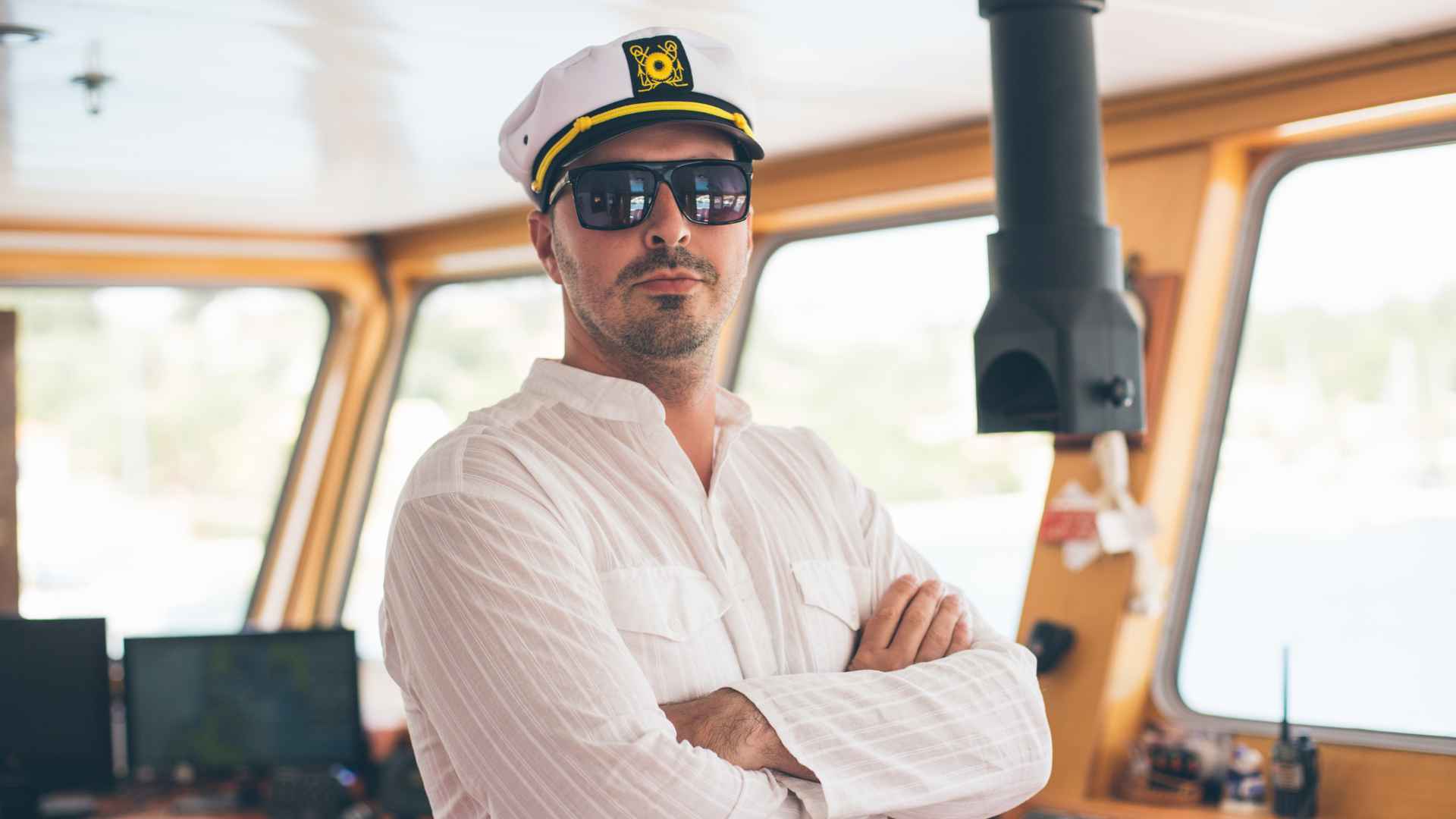
Network and establish connections:
Networking within the yachting industry is crucial for advancing your career as a yacht captain. Building relationships and establishing connections can lead to new opportunities and career growth. Here are some key points to consider:
- Industry Events: Attend industry events, such as yacht shows, maritime conferences, or trade fairs. These events bring together professionals from the yachting industry and provide opportunities to network, learn about new developments, and establish connections with yacht owners, brokers, and industry leaders.
- Professional Associations: Join professional associations and organizations related to yachting and maritime industries. These associations offer networking events, educational resources, and career support. Examples include the Professional Yachting Association (PYA), International Superyacht Society (ISS), or local yachting associations.
- Yacht Brokers and Crew Agencies: Build relationships with yacht brokers and crew agencies. Yacht brokers can connect you with potential employers and job opportunities, while crew agencies can assist with crew placement and career guidance. Stay in touch with them, provide updates on your experience and qualifications, and maintain a professional rapport.
Networking allows you to stay connected with industry professionals, increase your visibility, and access a broader range of opportunities.
Continue learning and professional development:
Continuous learning and professional development are essential for growth and advancement as a yacht captain. Here are some key aspects to consider:
- Stay Updated on Industry Advancements: The yachting industry is constantly evolving, with new technologies, regulations, and best practices emerging. Stay informed about industry trends, updates in safety protocols, navigation technologies, and regulatory changes. Read industry publications, follow reputable online sources, and attend relevant training sessions or workshops.
- Advanced Training and Specialized Certifications: Consider pursuing advanced training courses and specialized certifications to enhance your knowledge and skill set. These can include courses on advanced navigation techniques, superyacht operations, crisis management, leadership development, or specific technical skills like engine maintenance or electrical systems. These additional qualifications make you more competitive in the job market and broaden your career prospects.
- Professional Development Programs: Some organizations and institutions offer professional development programs tailored for yacht captains. These programs focus on leadership skills, management strategies, and industry-specific knowledge. Participating in such programs can enhance your leadership abilities, expand your network, and open doors to new opportunities.
Continuously investing in your learning and professional development demonstrates your commitment to excellence and positions you as a knowledgeable and competent yacht captain.
By networking within the industry, attending industry events, joining professional associations, and staying updated through continuous learning, you can advance your career, establish valuable connections, and position yourself for further growth as a yacht captain.
Watch What it takes to become a superyacht captain! | Video
Top 5 FAQs and answers related to How to Become a Yacht Captain
What qualifications do i need to become a yacht captain .
To become a yacht captain, you typically need to obtain the necessary licenses and certifications. The specific qualifications can vary depending on your location and the type of yacht you wish to captain. Common requirements include accumulating sea time, completing relevant training courses (such as navigation, safety, and emergency response), and passing licensing exams.
How do I gain the required sea time as a yacht captain?
Accruing the required sea time is an essential aspect of becoming a yacht captain. You can gain sea time by working as a deckhand or crew member on yachts, participating in internships or apprenticeships, or volunteering on boats. Keeping accurate records of your sea service days, duties performed, and the vessels you’ve worked on is crucial for meeting the licensing authority’s requirements.
Where can I find training courses for aspiring yacht captains?
There are various options for training courses related to becoming a yacht captain. You can find courses offered by maritime academies, vocational schools, yacht training centers, and professional organizations. Look for courses covering topics such as navigation, seamanship, safety procedures, and marine regulations. Additionally, licensing authorities often provide resources or recommendations for approved training providers.
How long does it take to become a yacht captain?
The time it takes to become a yacht captain can vary depending on individual circumstances, such as prior experience and the amount of time dedicated to training and gaining sea time. It can take several years to accumulate the required sea time, complete training courses, and pass licensing exams. The process also depends on your commitment to acquiring the necessary skills and qualifications.
Is it necessary to have sailing experience to become a yacht captain?
While sailing experience can be beneficial, it is not always a strict requirement to become a yacht captain. Many yacht captains start their careers with motor yachts or work on power-driven vessels. However, having sailing experience can provide you with a broader understanding of boat handling, wind patterns, and sail operations, which can be advantageous in certain yachting environments. It’s important to check the specific requirements and preferences of the licensing authority and potential employers in your desired field.
Conclusion:
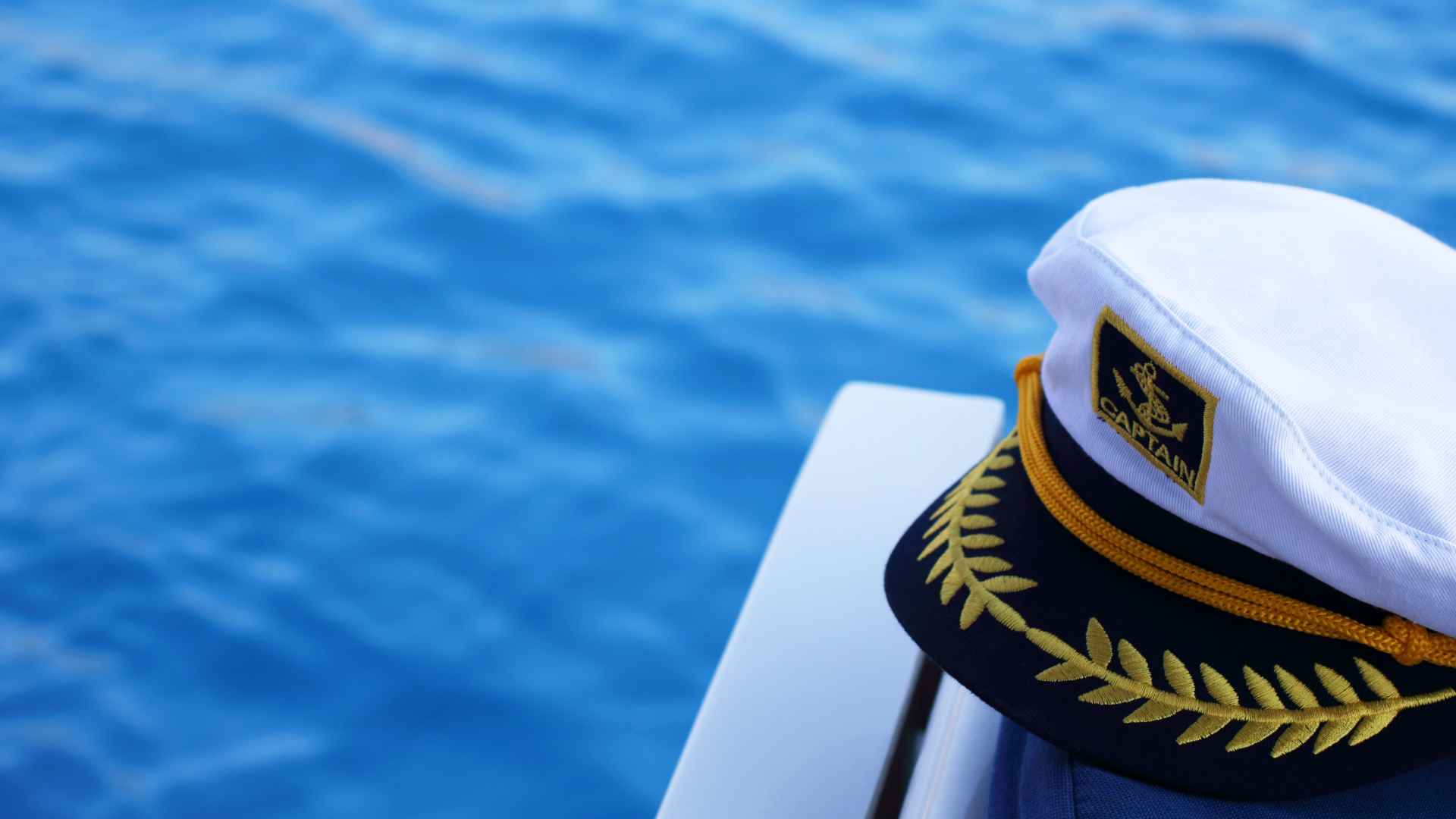
Becoming a yacht captain involves several key steps and considerations. Here’s a summary of the article’s main points:
- Gain Experience: Start by acquiring foundational boating knowledge, understanding navigation rules, weather patterns, and basic boat handling. Seek opportunities to work as a deckhand or crew member on a yacht to gain hands-on experience and learn about yacht operations and teamwork.
- Obtain Licenses and Certifications: Familiarize yourself with the licensing authorities relevant to your location, such as the US Coast Guard or Maritime and Coastguard Agency (MCA). Understand the specific requirements and application processes for obtaining the necessary licenses, which may involve sea time, training courses, and passing examinations.
- Focus on Professional Development: Continuously learn and stay updated on industry advancements. Consider advanced training, specialized certifications, and professional development programs to enhance your skills and knowledge as a yacht captain. This demonstrates your commitment to excellence and broadens your career prospects.
In conclusion, embarking on the journey to become a yacht captain requires dedication, practical experience, and a commitment to ongoing learning. By gaining experience, obtaining the required licenses, and focusing on professional development, you can position yourself for a rewarding career as a yacht captain. The open seas await, offering exciting adventures and the opportunity to lead a skilled crew while navigating luxurious yachts. Start your journey today and set sail towards an incredible future as a yacht captain.
Share How to Become a Yacht Captain? Step-By-Step Guide with your friends and Leave a comment below with your thoughts.
Read How to Build a Casting Deck in an Aluminum Boat in 6 Steps? until we meet in the next article.
Similar Posts
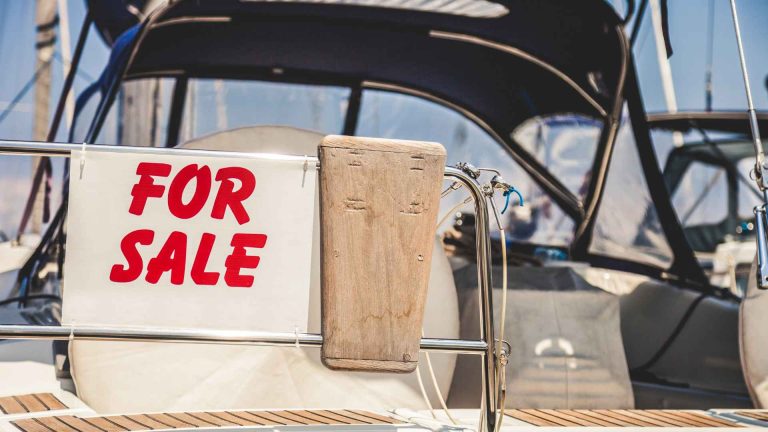
How to Become a Yacht Broker to Sell Your Own Boat? Guide
Becoming a yacht broker to sell your own boat can be a rewarding venture, offering a range of advantages. As a yacht owner, you have firsthand knowledge of your vessel, its unique features, and its history. By taking on the role of a yacht broker, you can leverage your expertise to effectively market and sell…

How Far Can a Yacht Travel? Helpful Examples
Picture this: a majestic yacht glides gracefully through azure waters, the sun setting on the horizon, and the salty breeze carrying whispers of adventure. The yacht, a symbol of luxury and exploration, embarks on a journey that promises the thrill of the unknown and the allure of far-off destinations. Yachting, a symphony of elegance and…

Can You Live on a Yacht? and if so, for How Long? – Guide
Living on a yacht evokes images of sun-kissed days, sparkling waters, and a carefree existence. The allure of a yacht lifestyle has captured the imagination of many, with its promises of adventure, luxury, and a break from the conventional. From the glamorous depictions in movies to the envy-inducing social media posts of jet-setters, it’s easy…

Can You Work on a Superyacht with Tattoos? Guide
Superyachts, the epitome of luxury and opulence, have long captivated the imaginations of those with a taste for the high life. These magnificent vessels, adorned with lavish interiors and offering unrivaled experiences on the open seas, have become a symbol of prestige and exclusivity. But as the allure of superyachts beckons, one question often arises:…
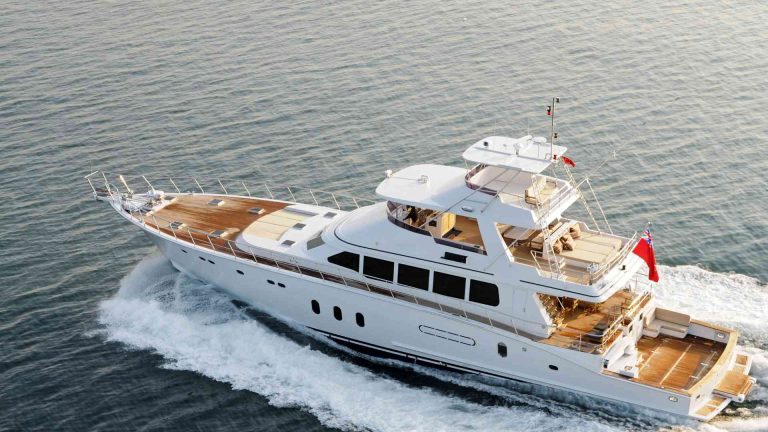
How Does Autopilot on a Yacht Work?
Navigating a yacht across vast, unpredictable waters requires precision, skill, and unwavering attention. Enter yacht autopilot, a technological marvel that has revolutionized the world of boating. It’s the invisible hand at the helm, offering sailors enhanced safety and convenience on their maritime journeys. In this article, we embark on a voyage into the world of…

How to Become a Stewardess on Yachts in 5 Steps: Guide
Picture yourself amidst sparkling turquoise waters, basking in the warm rays of the sun, and indulging in the luxurious lifestyle of the high seas. Working as a stewardess on yachts offers a unique and enchanting opportunity to turn this dream into reality. From sailing across idyllic destinations to serving the needs of esteemed guests, this…

If you're seeing this message, it means we're having trouble loading external resources on our website.
If you're behind a web filter, please make sure that the domains *.kastatic.org and *.kasandbox.org are unblocked.
To log in and use all the features of Khan Academy, please enable JavaScript in your browser.
Course: Careers > Unit 15
- Yacht captain: What I do and how much I make
Yacht captain: How I got my job and where I'm going
- Yacht captain: My budget and planning for the future
Want to join the conversation?
- Upvote Button navigates to signup page
- Downvote Button navigates to signup page
- Flag Button navigates to signup page
Video transcript

- Find A School
- Certifications
- North U Sail Trim
- Inside Sailing with Peter Isler
- Docking Made Easy
- Study Quizzes
- Bite-sized Lessons
- Fun Quizzes
- Sailing Challenge
Want to get your USCG Captain’s License? Here’s how.
By: American Sailing Standards

There are many reasons, professional and personal, to get a United States Coast Guard Captain’s License. In many cases the recreational mariner doesn’t need a USCG license, but would like to have one to improve their sailing resume, cement their knowledge of maritime rules and regulations, and pave the way toward sailing professionally.
For sailing instructors, the USCG license can often be essential. While your ASA training and certification are what prepare you to be an excellent teacher of sailing, most instructors are also legally required to have USCG captain’s license. This is due to strict rules related to carrying passengers, skippering for hire, and the type of boat involved. We created a handy chart to help determine which instructors are required to have a USCG license. In short, if you receive any compensation, if the boat has auxiliary power, and if you’re operating in USCG waters, you MUST have a captain’s license.
Whatever the reason, if you’re interested in getting a license, how do you go about it?
The most common type of license is called the Operator of Uninspected Passenger Vessel (OUPV). This allows you to operate a vessel of 100 tons or less with as many as 6 paying passengers on board. For that reasons, it’s often referred to as the “6-pack license.”

“Knowledge” refers to the test you must take in order to get your license. Be warned: this test is no walk in the park. Serious study and preparation is needed to pass it, as it will test your knowledge of seamanship, rules and regulations, navigation, and more. Taking a course is highly recommended. Select ASA schools offer USCG classes in addition to ASA curriculum. Check with the schools in your area to see if they do – if not they may be able to make a recommendation, as their instructors probably have USCG licenses!
Getting your USCG captain’s license is not easy, but if you achieve it, along with ASA certification, you will be part of an elite group of sailors with the experience and training to get the most out of the sailing lifestyle. Best of all, everyone will have to call you captain!
Related Posts:

- Learn To Sail
- Mobile Apps
- Online Courses
- Upcoming Courses
- Sailor Resources
- ASA Log Book
- Bite Sized Lessons
- Knots Made Easy
- Catamaran Challenge
- Sailing Vacations
- Sailing Cruises
- Charter Resources
- International Proficiency Certificate
- Find A Charter
- All Articles
- Sailing Tips
- Sailing Terms
- Destinations
- Environmental
- Initiatives
- Instructor Resources
- Become An Instructor
- Become An ASA School
- Member / Instructor Login
- Affiliate Login
Got a Question?
Complete our short form for a prompt response and world class tax advice.
Yes please contact me regarding mortgages
By selecting this, you agree to the Privacy Policy .
Sign in to your account
How to become a yacht captain.

Working as a captain on a superyacht can be a very rewarding career.
Being at the helm of a yacht and having ultimate responsibility over its operation is however not a role for everyone or anyone.
The captain will need to have various high level skills as this is an all-encompassing role.
However if you feel that this could be your career path, then we invite you to read through this article to learn how to become a yacht captain.
What Does a Yacht Captain Typically Do?
Required skills, stcw basic safety training.
- Efficient Deckhand Course (EDH)
Royal Yachting Association (RYA) Certification
Eng1 medical certificate, officer of the watch (oow), mca master 500 certification, mca master 3000 certification, prepare your cv (resume), go dockwalking, gain experience, typical yacht captain salary.

A yacht captain operates the yacht to ensure the navigation is carried out in a safe and efficient way.
The captain takes care of voyage planning, while ensuring the vessel adheres to all relevant international maritime regulations.
The yacht will need to be prepared for annual class and flag surveys, and these will need to be overseen by the captain.
Additionally, all vessel documentation will need to be kept in good order.
The captain will also be responsible for crew members, as well as ensuring the owners and any guests onboard are safe.
When it comes to yacht crew members, the captain has a direct role in hiring and appraising, as well as any dismissals.
They will need to ensure the crew is suitably trained and qualified for their respective roles.
The yacht captain is essentially the leader of the crew, and hence will need to act as such.
They will have both crew management as well as administration responsibilities to handle, on top of navigational duties.
A yacht captain will also have the responsibility of setting budgets and overseeing what’s being spent.
They will also be responsible for the maintenance of the yacht, as well as any refits and surveys that need to be carried out.
Understandably, the role of a yacht captain varies slightly depending on the size of the vessel and its function.
In the case of captains on relatively small yachts, the role is generally more diverse, and often the captain will need to be a great multitasker and problem solver.
On relatively large vessels however, there’ll be a dedicated crew to take care of other jobs.
So the captain will be able to delegate certain tasks to key personnel and focus more on their own responsibilities.
A yacht captain should possess a series of soft and hard skills to be successful in the role.
These are some of the most important skills a yacht captain will require:
- Great leadership skills
- Managerial skills
- Navigational and yacht handling skills
- Organisational and administration skills
- Knowledge of pertinent legislation and environmental regulations
- Engineering knowledge
- Very good communication and interpersonal skills
- Have a calm demeanour and charisma
- Be a good multitasker
Required Certification & Qualifications
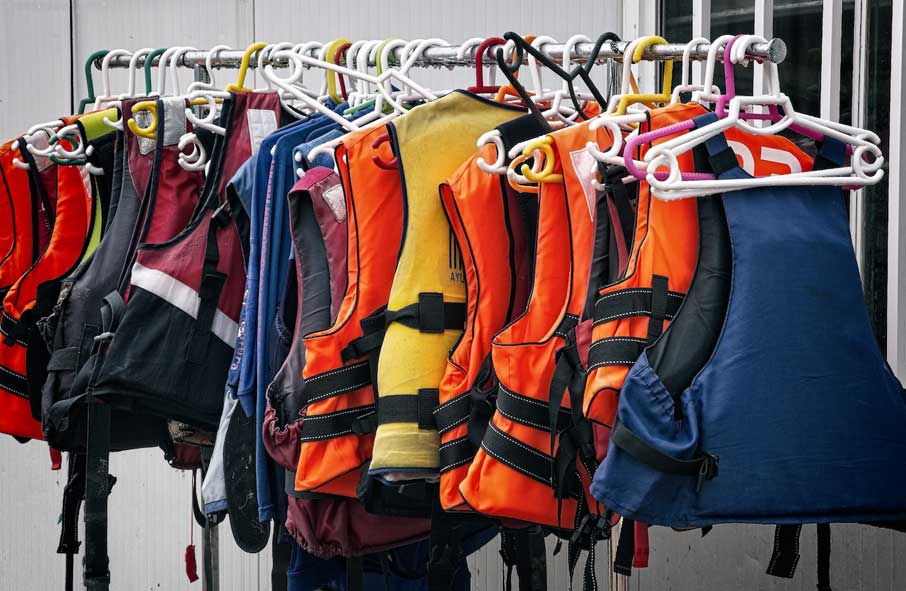
There are a number of certificates and qualifications which are mandatory for a yacht captain to have.
The STCW Basic Safety Training course is a must for anyone working onboard a sea vessel.
During this course, first aid practices, personal safety and social responsibility are some of the areas that are tackled.
Training on sea survival and how to respond to emergencies are other key areas of this course.
It typically lasts around 5 days, and has to be renewed periodically.
Efficient Deck Hand Course (EDH)
The Efficient Deck Hand is a course which revolves around basic seamanship.
It includes safe working practices on board a sea vessel, along with rope, wirework, painting and other key maintenance routines.
This course usually lasts around 5 days.
The RYA Certification is another must have.
The Royal Yachting Association is an organisation which issues the RYA Certificate, along with other certifications such as the Powerboat Handling, Yachtmaster Offshore and Yachtmaster Ocean.
The ENG1 Medical Certificate certifies that one is fit and in good health to work onboard a sea vessel.
This is issued after a routine medical examination with a physician.
Additional Education & Training
The courses and certifications mentioned above are practically a must for one to be considered for the role of a yacht captain.
There are however various other courses which one may wish to follow to improve their chances of getting such a job, or becoming more experienced over time.
This is a specialised course which enables one to become an officer onboard a vessel of up to 3000gt.
However, in order to apply for the Officer of the Watch course, one would need to have achieved the RYA certificate for at least 36 months, as well as have over 250 days of experience onboard a sea vessel.
The MCA training record book will also need to be completed.
The MCA Master 500 yachts is a course which is highly recommended for someone who already has relevant experience on board, but wishes to increase their chances of moving up the ranks.
Once the certificate of competence has been issued for OOW, and a further 12 months have passed, coupled up with another 120 days of verified sea service, one will be able to achieve certification.
Master modules which are included during this course include ship stability, navigation, radar simulator, seamanship, meteorology, business and law.
Finally there is the MCA Master 3000 certification, which consists of an oral exam.
There are oral prep courses which are organised to prepare those who wish to achieve this high level certification.

In order to become a yacht captain, you’ll need to get your first job on board a sea vessel first.
You need to be prepared to start small, and slowly but surely as you gain more experience at sea whilst achieving various qualifications and certifications, improve your chances of becoming a yacht captain.
The following are some steps you will need to follow to get started on this career adventure:
You will first need to prepare a good CV which demonstrates who you are, and what you can offer in detail.
Besides the various qualifications you have, make sure to go into detail about any past industry specific experience you had.
Dockwalking is a great way to seek work onboard a yacht or similar sea vessel.
This is the process of visiting popular marinas, and going from one boat to another to search for job opportunities.
Dockwalking speaks volumes about your willingness to learn and graft.
It displays clear evidence that you’re willing to take on any work opportunity to become more experienced, and that you are prepared to go the extra mile to work even in a small and seemingly unimportant role.
Some yacht owners will need someone to do the dirty work like scrub the decks, or engage in buffing, sanding and polishing.
The key takeaway here is that every work opportunity matters.
You need to be willing to take on any job that comes your way, as ultimately, every hour that you manage to spend working onboard will add your resume.
If you want to get into yachting, it’s important to gain as much experience as possible.
Any task or job that you’re offered onboard a yacht is important, even if it may seem insignificant.
Do not allow day to day tasks to appear irrelevant, as ultimately they all count.
Every job you take can help you to improve your character, whilst building your skillet and experience.
Over time you’ll have several opportunities to gain more experience.
The key is to always seek to do your very best.
Whenever possible, aim to over deliver and exceed expectations, as this is what will help you climb the ranks over time.
| 170ft - 200ft + | $140,000 - $300,000 | |
| 100ft - 170ft + | $85,000 - $170,000 | |
| 60ft - 100ft + | $48,000 - $98,000 |
The salary of a yacht captain depends on a variety of factors.
Whilst the captain’s qualifications are a critical factor, their experience will also play a critical role in determining their salary.
The size of the yacht will also need to be factored in as this will have an effect on the role and the responsibilities that the yacht captain has.
Generally speaking, a yacht captain’s salary ranges between £5,000 and £15,000 per month.
By now, you should have a much better idea of what you need to become a yacht captain.
Clearly, it’s a role that takes many years to fulfil.
But with time, dedication and persistence, you could one day become captain onboard a luxury superyacht.
Besides the various courses that you could enrol on, it’s also crucial that you possess the necessary skills and aptitudes which are important for such an important role.
If you’re just getting started, it’s best to gain as much onboard experience as you can, while also following the relevant courses.
In such cases, dockwalking could be your best place to start.
If however you’re close to becoming a yacht captain or have just become one, you may have other issues to consider such as your personal income tax liability from your earnings at sea.
In such cases, you should speak to a tax specialist to determine if you qualify for the seafarers earnings deduction .
If so, your entire salary at sea may be completely tax free.
Contact Marine Accounts to find out if you qualify, or try our residency test to clarify your tax position.
Disclaimer: Any advice in this publication is not intended or written by Marine Accounts to be used by a client or entity for the purpose of (i) avoiding penalties that may be imposed on any taxpayer or (ii) promoting, marketing or recommending to another party matters herein.
Also on Marine Accounts

How Much Do Yachties Make?
Working at sea as a yactie allows you to engage in a truly unique employment position. In this article we explore what being a yachtie means and how much income you can expect to make.
Patrick Maflin

How to Get Into Yachting
Working on a superyacht has numerous appealing features, with various tax advantages associated with such a career move. But how do you get into yachting? Read our comprehensive article to find out.
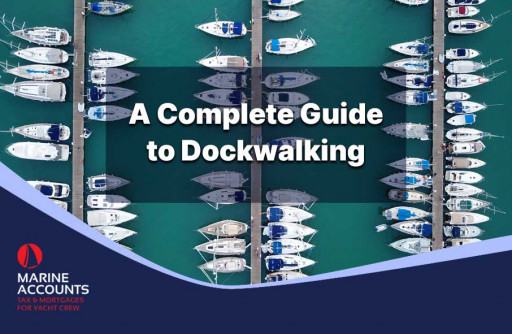
A Complete Guide to Dockwalking
Dockwalking is the act walking along popular marina docks where superyachts are moored looking for work. But how do you get work on a yacht? Read on to find out how in our comprehensive guide.
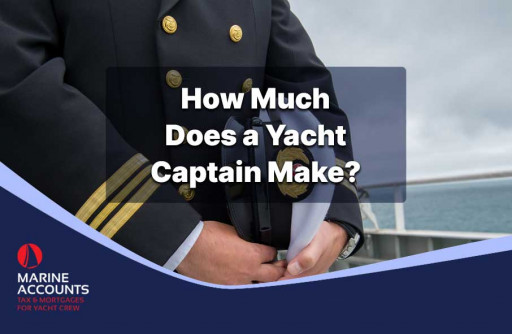
How Much Does a Yacht Captain Make?
Working as a yacht captain is a very privileged and unique employment position. In our article we explore what being a yacht captain involves and how much yacht captains make.
Before you go...
You're about to visit a page on our legacy site. We're currently in the process of updating all our tax tools and while this page is still active please return to the main Marine Accounts site after completition.
Refer a friend and receive £50!
Upon successful completion of the referral the cash will be transferred to you.
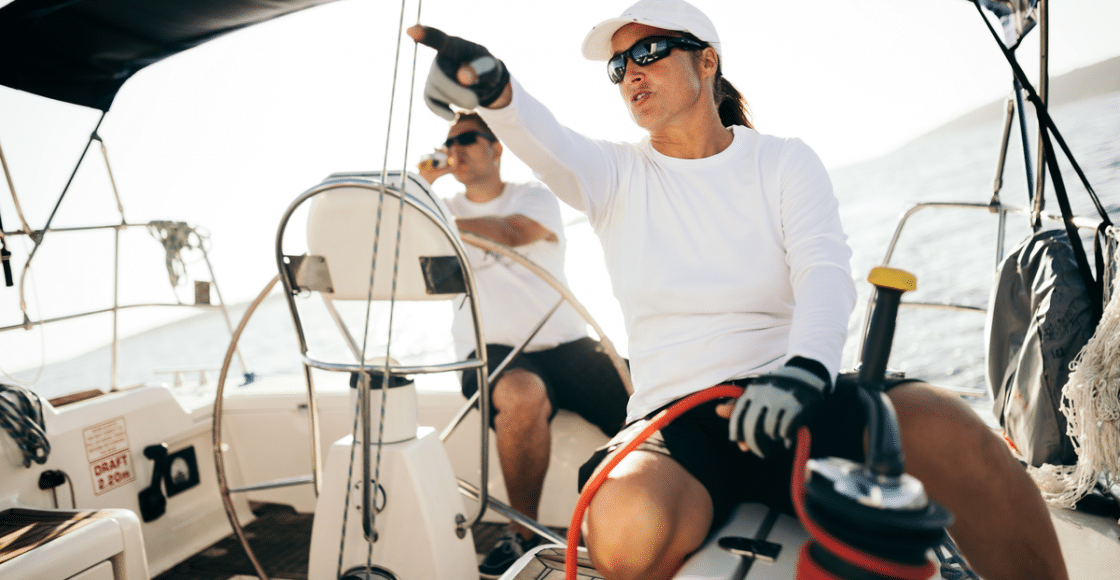
How becoming a charter boat captain is easier than ever

Last Updated on June 27, 2024 by Boatsetter Team
Are you an experienced boater who enjoys taking friends and family out on the lake, river, or bay? Did you grow up on the water? Do you see nautical charts in your sleep and make float plans for the fun of it? If so, becoming a yacht charter captain may be just the profession for you.
Charter Boat Captains
Charter boat experiences such as fishing, sightseeing, and water sports are always popular options in resort and vacation destinations . With today’s boat sharing economy which has allowed boaters to rent a boat from a private owner, the title of boat captain has become an even more viable career option. Often, the renter may not be an experienced boater and needs to hire a licensed and knowledgeable captain .
This is where your skills come into play. Though it depends upon experience level, demand, and geographic area, a charter boat captain can make a great income doing what he or she loves – being out on the water.
A charter boat captain’s license is issued by the United States Coast Guard and is based upon the following criteria:
- Total days of service
- Waters served upon
- Weight of the vessel
There are four main categories of charter boat captain license:
- Operator of Uninspected Passenger Vehicles License (OUPV) – One of the most popular types of boat captain license, this is also called a 6-Pack License. The vessel is less than 65 feet and there are no more than six passengers. This license usually applies to fishing, diving and sightseeing boats. To obtain this license, the boater must have 360 days of experience on inland or coastal waterways.
- OUPV Limited Credential – Also called a “launchtender’s license,” this license has a very specific purpose. It is used for the operation of uninspected vessels for a short time. This could include transporting boaters to and from a dock to a bigger boat that is moored out in the water. The captain must have 90 days of service on that type of vessel and complete a United States Coast Guard (USCG)-approved Safe Boating Course.
- Limited Master Credential – In addition to the OUPV requirements, this option is licensed for boats that have passed US Coast Guard inspection and have an inspection sticker. This license requires 120 days of service on the type of vessel that will be operated as well as a completed USCG-approved Safe Boating Course. The license can be extended to include sailing vessels if the captain completes 120 days of service on a sail-powered vessel.
- Master, 100 Tons Credential – Vessels up to 100 tons can be operated with this license, and there can be as many passengers on board as the vessel will hold. The captain must have at least 360 days of service on any vessel. A separate exam can be taken to qualify for a tow boat assistance license.
Job opportunities for charter boat captains include:
- Join a boat sharing company, such as Boatsetter , and captain fishing charters and sightseeing tours
- Embark on snorkeling and diving trips and sunset and dinner cruises
- Assist in towing with companies such as Sea Tow or Tow Boat U.S.
- Operate water ferry service for transportation, recreation and entertainment
Hey Captains, what tips would you give to someone considering a new career? Share some insider tips…
Ready to join the Boatsetter captain network? Sign up today and start earning on your schedule!

Boatsetter empowers people to explore with confidence by showing them a world of possibility on the water. Rent a boat, list your boat, or become a Boatsetter captain today.
Browse by experience

Explore articles
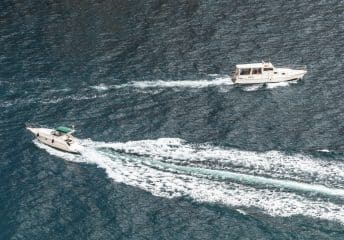
Who Is Responsible for Avoiding a Collision on the Water?

How To Host The Perfect Memorial Service on a Boat
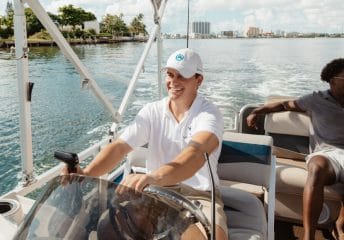
Duration Updates and Captain Pricing

2024 Summer Olympics Guide: Major Athletes & Moments in Water Sports
- Brokerage New Construction How to Buy How to Sell
- Yacht Fleet Yacht Catalog Charter Marketing Destination Guides
- Financial Services Payroll & Accounting Payroll Service Process Logistical Support Admin Services Crew Admin
- Job Descriptions Crew FAQ
- About Sitemap
How Much Does a Yacht Captain Make?
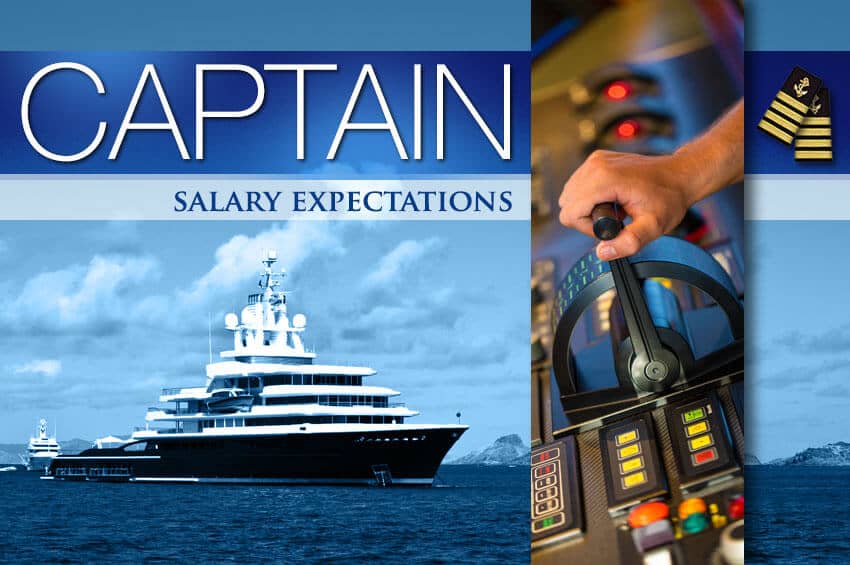
Captains of luxury yachts command a base salary well into six figures. Dependent on the length of the vessel, tenure of experience, and level of licensing yacht captain salaries range from $48,000 to over $300,000.
As the length of yachts increases, the complexity of the position of captain escalates. Although the job of yacht captain is often portrayed as one of luxury and leisure, it is a career choice of vast responsibility. While the exact details of a job description vary from program to program, the captain is the CEO of a small corporation. He/she reports to the Chairman of the Board - the yacht owner.
The Luxury Yacht Group webpage presents salary guidelines. Variation within the ranges reflect license level, experience and longevity of the captain 1 .
| Senior Master | 170 ft – 200 ft + | $144,000 - $300,000 |
| Captain | 100 ft – 170 ft | $84,000 - $180,000 |
| Junior Captain | 60 ft – 100 ft | $48,000 - $98,000 |
Additional parts of the salary package include bonuses, health insurance, flight expenses, paid vacation, training and certification cost reimbursement, and uniforms. Because the position requires residency aboard the vessel 24/7 all food and sundries are routinely supplied to crew. If the yacht is available for charter, the captain will also earn tips from charter guests. The industry is unique and each vessel in it has individual programs.
An average mega yacht with 12 crew has operating expenses between four and ten million dollars. The budget is based on where the yacht is moored, whether it is available for charter, and its travel destinations. On some yachts, a management company or a part of the owner’s business network handles accounting and makes financial decisions. On other yachts, the captain manages all aspects of the budget, chooses what charters to take and where to station the boat between charters, when and where to have yard work, and all personnel decisions.
A basic list of captain job responsibilities includes:
- Ultimate safety for passengers, crew, environment & vessel
- Achieving owner’s objectives?
- Crew hiring and dismissal?
- Personnel management?
- Shipyard/project management?
- Legal and regulatory compliance?
- Navigation?
Ultimate safety
The Captain holds the life of all aboard in his hands. He is also held accountable for the yacht itself and the environment. He must understand the mechanics of the boat, all electronic tools aboard, international regulatory requirements, and rules of the flag state.
Achieving owner’s objectives
Owner objectives are broad ranging. The captain is the mouthpiece for the interests of the owner. He holds the responsibility to reach outcomes which benefit the owner. The owner may simply require the captain to provide luxury service when he (she) is aboard. Some owners regularly use the vessel with family and guests, others may be aboard only occasionally. Charter periods for the vessel also factor into the objectives of the owner.
Crew hiring and dismissal
The requirements of the Marine Labor Convention (MLC) for contracting, dismissing, and managing are explicit and require strict adherence. Throughout any hiring or dismissal, the safety of the vessel and owner as well as issues of confidentiality must be assured by the captain. Identifying the best employees for the program involve a balance of certification, experience and personality.
Personnel management
Managing between 12 and 40 regular crew members aboard a mega/superyacht, day workers and seasonal hires is routine. From dive master, to stewardess, chef, and ETO, the captain must have a working knowledge of the positions and set expectations for performance. In a multi-cultural environment (both guests and crew), the example the captain sets for work ethic, responsibility, and communication optimizes yacht operations. The challenge is complicated by the close quarters of crew accommodations and the group working/living together 24/7.
Shipyard/project management
The Captain oversees issues of time and costs for routine maintenance and vessel upgrades. Knowledge of register and flag requirements are tools the captain uses to define the project, obtain quotes, and supervise the work.
Legal and regulatory
The maritime industry is dynamic. In addition to the flag state and regulatory requirements mentioned above, the captain must remain current with all Maritime Guidance Notices (MGN), Maritime Information Notes (MIN), amendments to all international marine safety codes, and product notices. A knowledge of the global differences in regulations, enforcement agencies and regional mores is critical.
Each vessel has a different business model. At a minimum, the captain is responsible for budget oversight and financial record keeping. If the owner engages a management company, the captain is the interface between the yacht and that organization.
The classic definition of a captain’s job is that of a navigator. Safely plotting a course, following the course, docking and departing from berths are all fundamental vessel handling skills. A seasoned captain has personal familiarity of cruising geographies. Despite the importance and skills required, a small percentage of a captain’s time is dedicated to task.
How does that list of responsibilities distill into the profile of a captain? It takes decades of training, hours logged, certification, and experience to reach the level of performance required to captain a mega/super yacht. In addition to each of those quantifiable requirements, elements of character and temperament differentiate captains.
- Calm and charismatic personality?
- Superior leadership, communication, management and diplomacy skills?
- Excellent boat handling and navigational skills?
- Excellent ISM and ISPS knowledge and practices?
- Excellent maintenance, engineering and technical / troubleshooting experience?
- Ability to remain calm and give directions in an emergency situation?
- Organized and methodical?
- Financial management, business acumen, management skills?
- Languages and cultural sensitivity
- Extensive maritime licensing
Leadership of the crew involves training, coaching and refereeing. When a captain steps into the position of leadership on a large vessel, it is understood that he has ten years (minimum) of increasing responsibility. Training and education were used during that decade to resolve situations without damage to vessel, harm of the environment, or human injury.
As manager and protector of the owner’s investment, the captain negotiates for goods and services. When issues arise, it is the captain who develops options and makes recommendations. Using the comparison to a traditional business, the CEO (captain) and the President of the Board (owner) interface on strategic decisions.
The mega yacht captain is more than just an asset manager. The captain implements owner preferences in order to assure him the best yachting experience. Once an owner has determined the style of yacht he wants to own - how, when, where they want to use vessel - costs of operating and budget generalities are defined. The ultimate goal of captain and crew is the happiness of the owner(s) and their guests. Crew is the primary factor in the owner/guest experience and in a successful program. The captain fully understands and manages the limitations of vessel and crew.
As vessels increased in length, machinery and electronics increased in complexity. In parallel with those changes, regulatory agencies and flag states requirements escalated. The requirements of International Safety Management Code (ISM) and International Ship and Port Security Code (ISPS) reflect the challenges of operating a mega yacht. The captain holds responsibility for implementing all requirements aboard and remaining current with the changes made to respond to new issues within the industry.
During the last decade, the number of superyacht hulls nearly doubled. Based on the 2010 Global Order Book, the superyacht industry managed to grow even during the financial crisis of 2008. The Knight Frank Wealth Report (2016) for the decade concluded that the wealth required to maintain a yacht appears impervious to economic cycles. It does project a slight worldwide slowing of the number of ultra-high-networth individuals during the upcoming decade.
How does that economic data translate into job opportunity for yacht captains who have followed the established career path? How resilient is the opportunity during periods like the global downturn experienced in 2008?
Marcy Laturno, Director of Crew Placement & Charter Specialist at Luxury Yacht Group answered:
A long-term mega yacht captain added:
Securing a position as captain aboard mega and super yachts is competitive. Although new builds are released every year, each year there are additional individuals who have established professional credentialing and adequate experience aboard. Professional captains seek positions where they can assemble a stable crew, build longevity and establish a relationship with the yacht owner.
The position of mega/super yacht captain commands a salary which reflects the level of responsibility and the years of personal and professional development. A relatively small number of positions creates a competitive job market where longevity and experience are rewarded.
- Luxury Yacht Group website

Engineering License Changes
The MCA has restructured the engineering certifications. The MEOL course has been done away with, and the AEC course made mandatory and more thorough. Luxury Yacht Group explains all these changes, what engineers progressing through the ranks can do now, and how Y ticket holders can convert their licenses over to the structure.
14 Mar 2018

A Day in the Life Series – Chief Stewardess
For a yacht to run smoothly, it requires many working parts, and the interior department is a large component of this. The chief stewardess oversees this department and makes sure all the stewardesses onboard know what their tasks and responsibilities are. The interior department is largely in charge of the guest services whilst they are onboard, and responsible for interior maintenance of the yacht when they are not.
18 Dec 2017
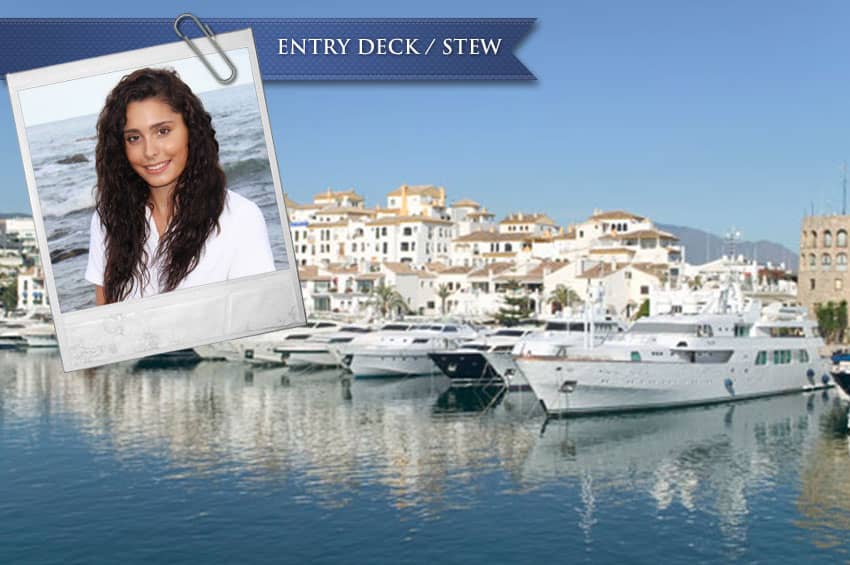
A Day in the Life Of Series - Entry Stewardess
Joining the yachting industry is an exciting and daunting undertaking. In this two part interview we speak with Melanie about why she decided to join the superyacht industry, what her hopes and goals are, and what she has learnt so far as an entry level stewardess.
29 Nov 2017

What Size Yacht Requires a Captain’s License? Find Out Here

Have you ever dreamed of captaining your own yacht? Whether you’re a professional skipper or an amateur enthusiast, owning a yacht requires a unique set of skills and qualifications.
In this article, we’ll discuss what size yacht requires a captain’s license, the process for obtaining one, the benefits, and the penalties for operating a yacht without a license.
Read on to learn everything you need to know about captain’s licenses.
Table of Contents
Short Answer
In the United States, a captain’s license is required to operate any vessel of more than 25 gross tons, or any vessel that carries passengers for hire.
This includes larger yachts, as well as commercial vessels.
Depending on the size and the intended use, a captain may need to obtain a Master’s license or a higher level of certification.
Additionally, some states may require captains to have a specific license for vessels operating in their waters.
What is a Captain’s License?
A captain’s license is a qualification required in the United States for individuals wishing to operate a yacht larger than 25 gross tons.
This license is granted by the U.
Coast Guard and allows the holder to be in compliance with all federal laws and regulations governing the operation of large vessels.
This license is also necessary for commercial purposes, such as chartering a yacht for business purposes.
To obtain a captain’s license, the applicant must pass a series of tests administered by the U.
Coast Guard.
These tests include a physical examination, a written exam, and a practical exam.
Those who pass these tests are awarded a captain’s license and are legally authorized to safely and legally operate a yacht of any size.
The captain’s license is an important qualification for yacht owners, as it ensures that they are operating their vessels in compliance with all laws and regulations.
It also serves as a demonstration of the holder’s expertise in the field of boating and maritime operations.
It is important to note that the captain’s license is a prerequisite for many commercial activities involving the operation of a yacht, such as chartering and other business activities.
A captain’s license is an important qualification for any yacht owner, as it ensures that they are in compliance with all laws and regulations.
Those who wish to obtain a captain’s license should understand the steps necessary to do so, as well as the importance of the license for operating a yacht.
What is the Minimum Size of a Yacht Requiring a Captain’s License?

When it comes to the operation of a yacht, safety should always be paramount.
In the United States, if you wish to operate a yacht larger than 25 gross tons, you will be required to have a valid captain’s license from the U.
This license is necessary to be in compliance with the federal laws and regulations governing the operation of large vessels.
The license is also required if the yacht is to be utilized for commercial purposes.
So, what size yacht requires a captain’s license? Generally speaking, if the yacht is larger than 25 gross tons, then a captain’s license is required.
The exact size of the vessel will depend on several factors, such as the type of vessel, its gross tonnage, and its intended use.
Coast Guard has a detailed set of regulations that outlines the requirements for licensing, and it is recommended that prospective captains familiarize themselves with these regulations before attempting to operate a yacht.
Additionally, the size of the yacht’s crew can also be taken into consideration.
Generally speaking, if the vessel requires more than four crew members, then a captain’s license may be necessary.
Additionally, some states may have different requirements for licensing, so it is important to familiarize yourself with the laws and regulations for the state in which you will be operating the vessel.
A captain’s license is necessary to safely and legally operate a yacht of any size.
It is important to note that the captain’s license is not the same as a recreational boating license, and it is important to understand the difference between the two.
In conclusion, the minimum size of a yacht requiring a captain’s license is 25 gross tons.
It is important to familiarize yourself with the laws and regulations pertaining to the operation of large vessels and to obtain the necessary licensing before attempting to operate a yacht.
What is the Process for Obtaining a Captain’s License?
Obtaining a captain’s license is not a simple process.
It requires dedication, preparation and commitment.
In the United States, the U.
Coast Guard is responsible for issuing captain’s licenses.
To become licensed, an applicant must first pass a series of tests administered by the U.
This includes a physical examination, a written exam and a practical exam.
The physical examination is conducted to ensure that the applicant is healthy enough to operate a vessel.
This exam includes measuring the applicant’s vision, hearing, and physical strength.
The written exam tests the applicant’s knowledge of nautical rules, regulations, and practices.
This exam is designed to ensure the applicant has a comprehensive understanding of the procedures and laws related to operating a yacht.
The practical exam is designed to test the applicant’s ability to safely and effectively operate a vessel.
This exam is conducted on the water, and the applicant must demonstrate their ability to maneuver the vessel in a variety of conditions.
In addition to passing these tests, the applicant must also possess a valid state-issued driver’s license, and must be at least 18 years of age.
The applicant must also provide proof of U.
citizenship, or a valid alien resident card.
The process of obtaining a captain’s license can be long and challenging.
However, those who successfully obtain a license will be able to legally and safely operate any yacht larger than 25 gross tons.
What Are the Requirements for Obtaining a Captain’s License?

Obtaining a captain’s license is an important and mandatory step for anyone who wishes to operate a yacht larger than 25 gross tons in the United States.
This license is necessary in order to be in compliance with federal laws and regulations governing the operation of large vessels, as well as if the yacht is to be used for commercial purposes.
The process of obtaining a captain’s license requires applicants to pass a series of tests administered by the U.
Coast Guard, including a physical examination, a written exam, and a practical exam.
The physical examination is to ensure that the applicant is physically fit to be the captain of a large vessel.
This will involve a vision and hearing test, as well as a general physical exam to make sure the applicant is healthy enough to handle the duties of a captain.
The written exam is a series of multiple-choice questions that cover topics such as navigation, marine safety, and boating laws.
This exam is designed to test the applicant’s knowledge of the applicable laws, regulations, and procedures for operating a large vessel.
The practical exam is a hands-on examination of the applicant’s ability to safely and securely operate a vessel.
This will involve tasks such as docking and anchoring, emergency procedures, and navigational skills.
This exam is designed to ensure that the applicant is capable of safely navigating a yacht in any environment.
It is important to note that once a captain’s license is obtained, it is valid for five years.
After five years, the license must be renewed in order to remain valid.
Renewing a captain’s license requires the applicant to complete a recertification course, as well as pass an oral exam.
By obtaining a captain’s license, the applicant is demonstrating their commitment to safety, as well as their knowledge of the applicable laws and regulations governing the operation of large vessels.
This license is necessary to safely and legally operate a yacht of any size, and is a vital part of the process of becoming a responsible and capable captain.
What Are the Benefits of Having a Captain’s License?
When it comes to operating a yacht, having a valid captain’s license is essential.
Not only is it a requirement by the U.
Coast Guard, but it also provides a number of benefits to the captain and passengers.
By obtaining a captain’s license, the vessel operator will have the knowledge and skills necessary to safely and legally operate a vessel of any size.
Having a captain’s license demonstrates to other boat operators and passengers that the captain is knowledgeable and capable of safely navigating and operating the boat.
This can help to build trust and confidence among all those on board, and make for a more enjoyable experience.
The captain’s license also provides a sense of responsibility to the captain and passengers, as the license holder is held to a higher standard when it comes to safety and navigation.
A captain’s license can also be beneficial for those wishing to pursue commercial opportunities with their yacht.
Having a valid license can increase the chances of qualifying for charter boat services, as most companies require captains to have a valid license.
Additionally, having a captain’s license may make it easier to obtain insurance and other services, such as financing, for the yacht.
Finally, having a captain’s license can provide a sense of accomplishment to the individual who has earned it.
Captains who have earned their license have demonstrated their knowledge and skill in operating a vessel, which is something that should be celebrated.
In summary, having a captain’s license can provide a number of benefits to the captain and passengers of a yacht.
Coast Guard, but it also provides a sense of trust and responsibility, as well as commercial opportunities and a sense of accomplishment.
What Are the Penalties for Operating a Yacht Without a Captain’s License?

Operating a yacht without a valid captain’s license is a serious offense, and it can result in significant penalties.
Depending on the size of the yacht, the operator may be subject to civil and criminal penalties, including fines, imprisonment, and suspension or revocation of the vessel’s registration.
The penalties for operating a yacht without a captain’s license can vary greatly depending on the size and purpose of the vessel.
For example, operating a large, commercial vessel without a captain’s license can result in fines of up to $50,000, and the vessel may be confiscated and the operator may face up to 10 years in prison.
Operating a recreational vessel without a captain’s license can result in fines of up to $5,000 and the vessel may be seized and the operator may face up to six months in prison.
In addition to the legal penalties, operating a yacht without a captain’s license can also put people’s lives and property at risk.
A captain’s license demonstrates a working knowledge of the federal laws and regulations governing the operation of large vessels, and it also ensures that the operator is familiar with the safe and proper operation of their vessel.
Operating a yacht without a captain’s license is a serious offense and can result in significant penalties.
It is important to remember that a captain’s license is necessary to safely and legally operate a yacht of any size in the United States.
If you wish to operate a yacht larger than 25 gross tons, make sure to obtain a valid captain’s license from the U.
What Are the Different Types of Captain’s Licenses?
When it comes to operating a yacht larger than 25 gross tons, having a valid captain’s license is absolutely essential.
The United States Coast Guard (USCG) issues several different types of captain’s licenses depending on the size of the vessel and its intended purpose.
The most basic license is the Operator of Uninspected Passenger Vessel (OUPV) license, which allows a captain to operate a vessel of up to 6 passengers for hire within a certain geographic area.
This license is commonly referred to as a “six-pack license.
” Next up is the Master of Near Coastal Waters license, which allows a captain to operate a vessel of up to 100 gross tons within a certain geographic area.
This license is commonly referred to as a “100-ton license.
” If a captain wishes to operate a vessel larger than 100 gross tons, then he or she will need to obtain a Master of Oceans license.
This allows a captain to operate any size vessel, anywhere in the world.
Finally, there is the Master of Assistance Towing license, which allows a captain to operate a vessel of any size for towing purposes.
This license is commonly referred to as a “towing license.
” No matter which type of captain’s license you need, it is important to note that all of them require the applicant to pass a series of tests administered by the USCG, including a physical examination, a written exam, and a practical exam.
By obtaining any of the above captain’s licenses, you will be in compliance with the federal laws and regulations governing the operation of large vessels, as well as be able to safely and legally operate a yacht of any size.
Final Thoughts
It is important to understand the requirements for obtaining a captains license if you plan on operating a yacht over 25 gross tons.
Not only will it make your voyage safer and more enjoyable, but it is also a requirement for commercial operations.
With the right knowledge and preparation, obtaining a captains license can be an achievable goal.
To learn more about the process, requirements, and benefits of having a captains license, be sure to visit the U.
Coast Guard website.
James Frami
At the age of 15, he and four other friends from his neighborhood constructed their first boat. He has been sailing for almost 30 years and has a wealth of knowledge that he wants to share with others.
Recent Posts
When Was Banana Boat Song Released? (HISTORICAL INSIGHTS)
The "Banana Boat Song" was released in 1956 by Harry Belafonte. This calypso-style song, also known as "Day-O," became a huge hit and remains popular to this day for its catchy tune and upbeat...
How to Make Banana Boat Smoothie King? (DELICIOUS RECIPE REVEALED)
To make a Banana Boat Smoothie King smoothie at home, start by gathering the ingredients: a ripe banana, peanut butter, chocolate protein powder, almond milk, and ice. Blend the banana, a scoop of...

- Search Used Yachts For Sale
- Search Boats By Brand
- Search Boats By Type
- Search By Location
- Search By Price
- What's My Boat Worth?
- Search Boats Just Listed
- Small Yachts
- Custom Sport Fishing Boats
- Finance A Boat
- Amer Yachts
- Aquitalia Yachts
- Cabo Yachts
- Century Boats
- French Yachts
- Gulfstream Yachts
- Hatteras Yachts
- Shelter Island Yachts
- Solaris Yachts
- Sunpower Yachts
- Sunreef Yachts
- Vela Boatworks
- Virtus Yachts
- Why List With United?
- Why Own A Boat Or Yacht?
- Custom Website For Your Yacht
- United Sold Boats
- Buy A Yacht With Crypto
- Find a Yacht Broker Near Me
- Search For Broker By Name
- Meet The United Support Team
- Our History
- Fort Lauderdale Boat Show
- Stuart Boat Show
- Miami Boat Show
- Palm Beach Boat Show
- Other Boat Shows
- Yachting News
- Yacht Closing Services
- River Forest Yachting Centers

Search All Yachts
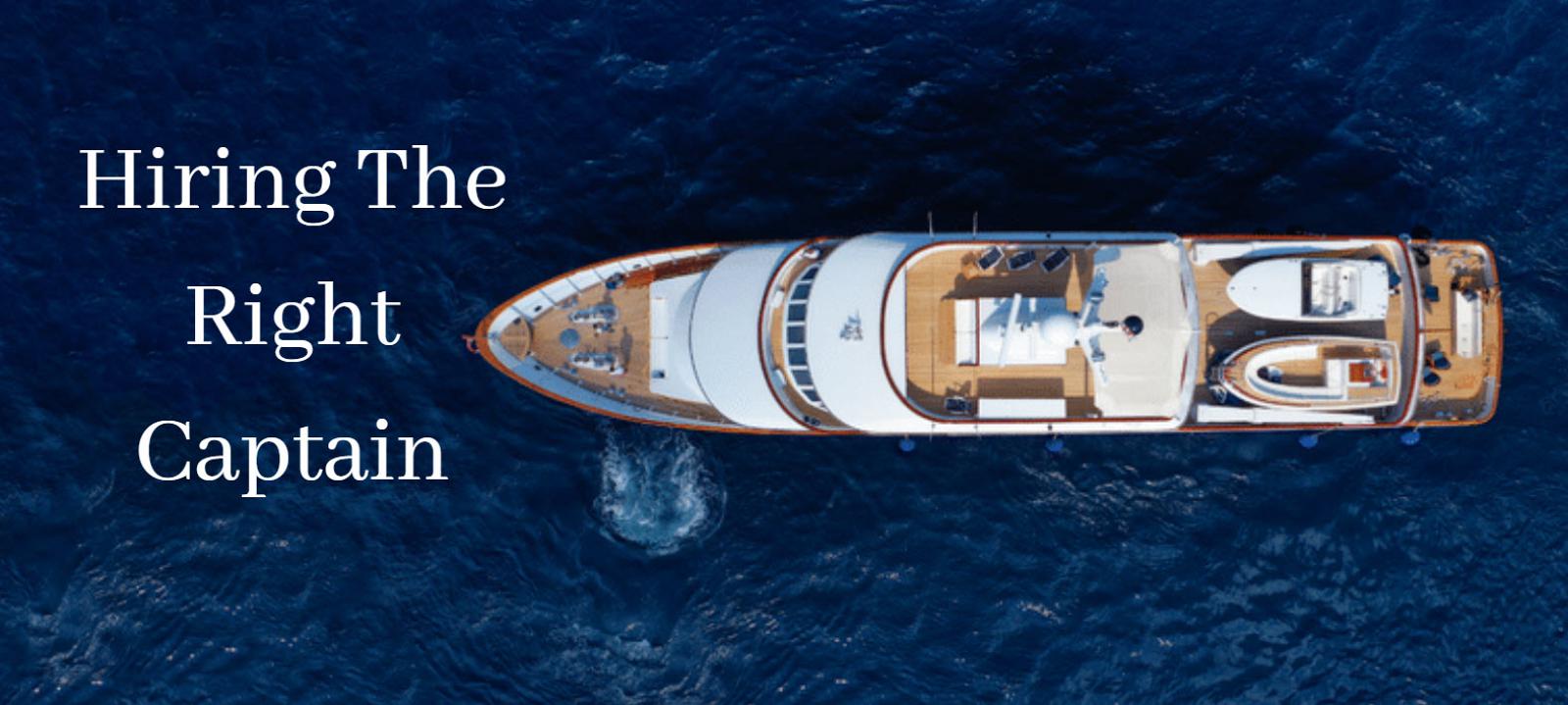
How To Hire The Right Yacht Captain
By Rob Bowman | Posted On Feb 25, 2021 Updated On Apr 16, 2024
"Hiring the right captain and crew for your yacht is the single most important thing you can do when it comes to enjoying your time on board," said Captain Jeff Palmer, longtime motor yacht captain turned professional yacht broker. "Especially for first time yacht buyers, the captain can really make or break the experience."
The reason people purchase a motor yacht is to enjoy their free time, relax in a stress-free environment, and to share this moment with their loved ones. When everything from the perfect weather, to the right destination, and the synergy among your guests is all aligned, the feeling is indescribable. It doesn't take but one mistake from the captain or a difficult crew member to put a damper on your plans. In extreme cases, hiring the wrong captain could even result in damage to your yacht, whether aesthetic or mechanical.
So where does a new yacht owner turn when hiring a captain? United Yacht Sales spoke with 3 longtime motor yacht captains to get their advice on what new buyers should do, as well as longtime owners looking to make a change.
Captain Ken Gibson
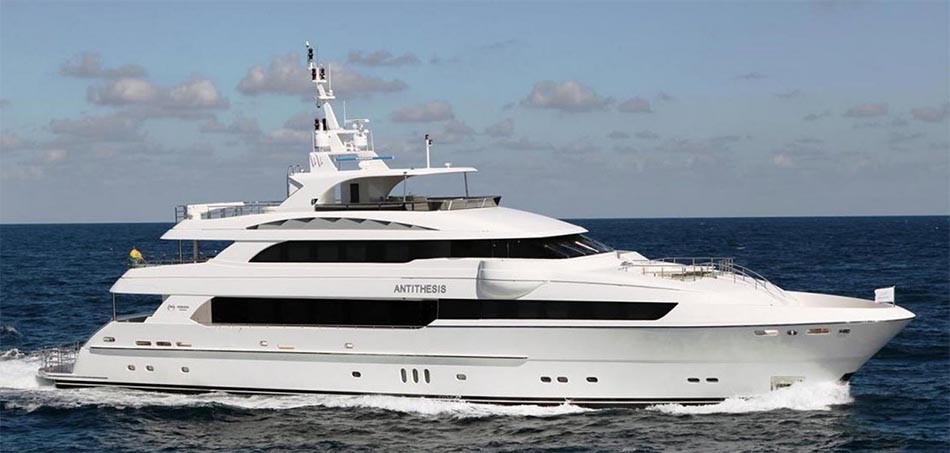
Captain Ken Gibson has seen it all. Since 1981 when he first got his captain's license, Ken has been both a captain for private owners setting out on month-long voyages to tropical destinations and for charter yachts earning income as a business. Ken has over 1 million miles on the water. He is currently in charge of a 136' Horizon Yacht that was sold in 2020 by United Yacht Sales broker Greg Graham . One advantage of working with a professional yacht broker is the referral of a reputable captain that broker knows and trusts.
Known for being very thorough and detail-oriented, Captain Ken spent 24 years in the Coast Guard and retired as a Commanding Officer based at the station in Fire Island, New York. His training has given him the skills needed to properly manage a crew and a yacht simultaneously. "I run the crew on board like a team," said Captain Ken. "Everyone on board has everyone's backs. Everything good and bad that happens on the boat comes through me and I am responsible for being the communication to the owner. A chain of command and a structure is very important when managing a large yacht. Good crew appreciate that structure as well"
He continued on the advantages of hiring the captain first and allowing that captain to hire the right crew members. "I don't take a job unless I am responsible for the hiring and management of the crew," says Ken. "I look for crew members that can do multiple jobs so our team is cross-trained and can be efficient."
So what did Captain Ken have to say about finding the right yacht captain? He says to look for these things:
- When you're reviewing resumes, look for the captain's experience in terms of longevity. How long have they been on their boat? Have they moved around a lot? Longevity is a sign of stability and maybe a glimpse into the owner's overall happiness with the job they're doing.
- Does the captain have leadership and management experience outside of yachting? Being able to motivate and get along with the crew is essential. I would advise new owners to look for some kind of overall management training or experience.
- Good captains are going to work 7 days a week for you and be on call 24 hours a day during the time they manage a yacht.
- Does the captain already have crew that want to work for him? This is an important sign as good captains generally have several crew members they have worked with for years and could be recommended.
Another question that often comes up is, "How much does a yacht captain earn?". Captain Ken says there is an often-repeated misconception that $1,000 per foot is the going rate for a yacht captain, which may have been true 25-30 years ago. "The best advice I can give is to find the right captain for you first and then discuss the compensation. The salary is dependent on a lot of details with that specific job. Especially if the captain will be working 7 days a week, they're essentially giving up months of their life at a time."
Finally, Captain Ken encouraged yacht owners to seek out the Private Facebook Group called (COC) Captains On Call . This is a private group you have to request to join. Only yacht owners and captains are allowed to be members. If you want to know more, Captain Ken can be reached at [email protected] .
Captain Ben Pollon
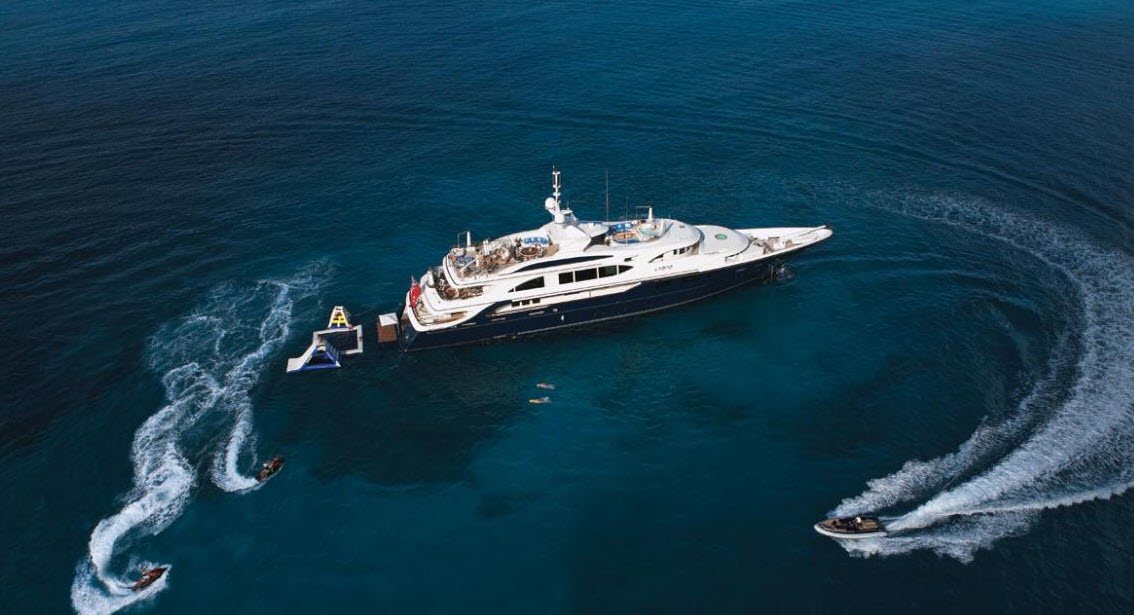
Captain Ben Pollon grew up in the Turks and Caicos Islands in a family of sailors who instilled in him a strong passion for the water. After owning a marine repair business in Fort Lauderdale, Ben became a full time captain, "Mainly on 50 to 60 meter yachts." he says. Ben went on to earn his 3000GT Masters License and spent over 15 years managing multiple high-profile charter yachts. "Some boats had 15-plus crew on board," Ben continued.
Ben knows what it takes to successfully manage a crewed yacht placed into a charter program and the demands it requires. “If you’re a new yacht owner, the best thing you can do is choose a Captain and thoroughly explain your needs and expectations,” Ben elaborated that running a large modern yacht is akin to running a small business with the Captain at the head of it "Giving a captain the tools he needs to run the boat effectively will ultimately result in a better experience for the owner when they step on board."
Captain Ben gave some additional pointers on where to find a captain and what to look for:
- Referrals can be great, but do your homework. If you interview a captain that was a referral from your yacht broker or a friend, make sure you ask to speak with past yacht owners they've worked for.
- Choosing a captain is size dependent. It's important that the captain's experience be relative to the size of the yacht you own.
- There's nothing wrong with going to a crew agency and letting them know you're looking for a captain. Getting the word out in the yachting community is important to getting a good selection of resumes.
- Don't rush your interviews. Ask for a second interview as you narrow down your choices. It's important to find a captain that fits within your program, whatever that may be. Find the right fit!
Captain Ben also agreed that $1,000 per foot for a captain's salary was dated. "Be open minded about the salary you're going to pay your captain," said Ben. "The pay is definitely commensurate on experience and I recommend working on finding the right fit, before discussions on salary even begin."
Captain Jeff Palmer
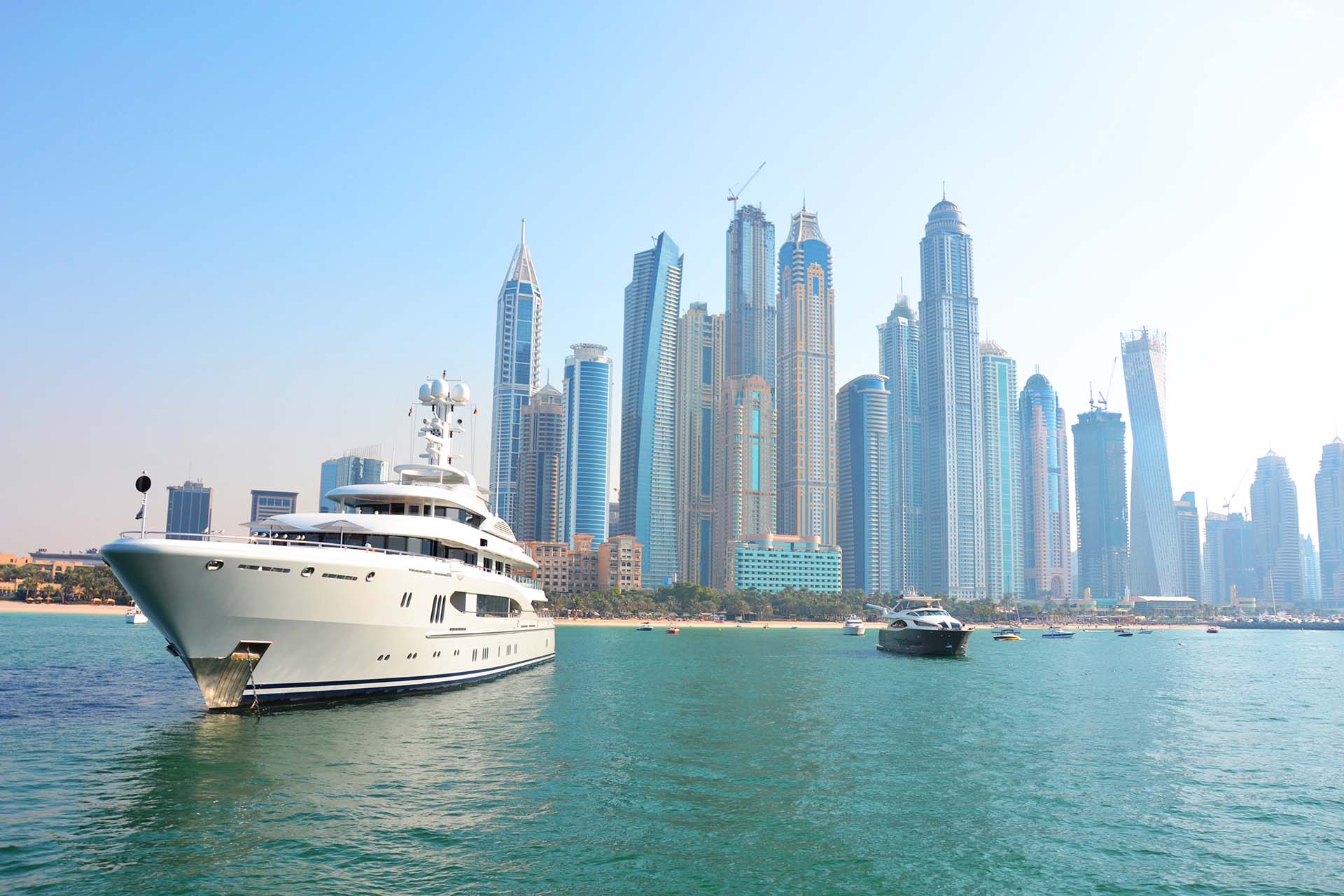
Captain Jeff Palmer has done everything there is to do in the realm of boating. He started as a welder and search rescue team member on the USS Dahlgren in the U.S. Navy, later becoming a deckhand on several yachts throughout the Caribbean. Jeff moved on to becoming a captain in 1992 and has managed everything from sailboats , to Hatteras Yachts , to "GEORGIA", the world's largest sloop at 159'. Mostly Jeff captained 180-foot plus motor yachts. Today, he's not only a professional yacht broker, but he's also part owner of United Yacht Sales.
Jeff has engrained himself in South Florida as the head recruiter for UYS and often speaks with brokers, captains, crew, and owners. "It used to be that boats over 60 feet had a captain and a crew member," said Jeff. "Now with the advancements in technology, that size has grown to over 75-feet on average. People want their privacy."
Still, Jeff is adamant with yacht owners about hiring a captain, "Seriously consider hiring a captain to eliminate the work and worry, while also getting to know your boat," he says. Jeff's top takeaways when it comes to hiring a captain include:
- Word of mouth is a big thing with finding a captain. Your yacht broker should definitely be able to introduce you to a captain or at least put the word of mouth out there. United Yacht Sales has a broker forum where all 200+ of our yacht brokers communicate with each other.
- Good captains don't have a lot of turn over. When you're conducting your interview, look for longevity in both the captain's employment, as well as how often crew changes positions.
- It's a huge benefit if the captain also has a mechanical background. A good captain will be able to guide you with servicing your yacht and be able to negotiate fair prices for repairs.
- References are great from past owners, but also ask for references from past crew as well.
Jeff confirmed what both Captain Ben Pollon and Captain Ken Gibson said about what salary to pay a yacht captain. "1,000 a foot has been around forever and it's archaic," he said. "A lot of what you're going to pay a captain depends on the program. Is it seasonal? Full time? What size boat and how many days on board? Will the captain get charter tips? There are a lot of variables to the discussion."
As a professional yacht brokerage firm in the industry since 2002 and with over 250 yacht brokers on our team, United Yacht Sales has the network of buyers, sellers, and captains to assist you in your yachting plans. Contact us today at 1-772-463-3131 whether you are looking to buy a yacht, sell your existing boat, or just want advice on finding a captain.
Related Articles You Might Also Be Intersted In :
- What Is The Best Time Of Year To Sell A Boat?
- Are Yachts Worth Buying?
- How Much Should I Pay For A Yacht?
- How Much Should You Spend On A Yacht?
- What Does A Yacht Broker Do?
- Why Are Boats So Expensive?
- How Much Does It Cost To Buy A Yacht?
- Can I Sell My Yacht Without A Broker?
- How To Choose The Right Yacht Broker
- What Is The Best Sportfish?
- How Much Is A Sportfishing Yacht?
- How Much Does A Fishing Yacht Cost?
- How Fast Do Sportfishing Yachts Go?
- What To Do To Help Sell Your Boat Faster
- What Are The Most Popular Yacht Brands?
- Key Advice For Buying A Yacht
- How Much Does It Cost To Own A Yacht?
Interesting Boating Links
Worldwide yacht sales.
- Boat Sales Charleston SC
- Yacht Search By Location
- Cape Cod Boat Sales
- Sunreef 60 Electric Hybrid Catamaran Price
- Yachts in Jacksonville Florida
- Used Boats For Sale in Alabama
- Yachts For Sale in Georgia
- 15M Boat For Sale
Luxury Boats & Yachts
- Sailboats For Sale Texas
- Yacht Dealer
- Yachts For Sale by Price
- Used Center Console Boats For Sale
- Used Boats Near Me
- Hinckley Yachts For Sale
- 40 Foot Boat
- Bertram Yachts
- Azimut Yachts Price
- 60 Ft Yacht For Sale
- Prestige Yachts
- Yachts For Sale Near Me
Popular Builders & Models
- 50 Foot Viking Sportfish
- Cabin Boats For Sale Near Me
- 40 Sea Ray Sundancer
- 45 Ft Sea Ray Sundancer For Sale
- Used Contender Boats For Sale in Louisiana
- 36 Albemarle For Sale
- Motor Yachts For Sale
- Used Race Boats For Sale
- Express Cruiser Yachts For Sale
- Used Small Sailboats For Sale
- Back Cove 390
- Grand Banks Yachts For Sale
Trending Brands & Types
- New Yachts For Sale
- Jim Smith Yachts
- Used Ranger Tugs For Sale
- Used Grady White Boats For Sale
- Krogen Yachts
- Selene Trawlers For Sale
- Pershing Boats For Sale
- Beneteau Boats For Sale
- Riviera Boats For Sale in USA
- 32 Yellowfin For Sale
- Egg Harbor For Sale
- Used Hatteras Boats For Sale
- Palm Beach Motor Yachts
- Tartan Sailboats For Sale
SEND UYS A MESSAGE
Recent posts.

Jul 15, 2024
Luxury Yachts For Luxury Buyers

Jul 11, 2024
2nd Quarter Report: Yacht Sales Grow 22 Percent

Jul 01, 2024
The Hot List - July 2024

Jun 28, 2024
10 Fun Flybridge Yachts You Can't Miss
- Share full article
Advertisement
How to Charter a Boat
If you want to sail off into the sunset, at least temporarily, you need to understand how to get aboard first.

By Lauren Sloss
This time of year, it’s an inevitable thought: Life would be that much better out on the water. Specifically, on a boat.
Even if you have neither a boat nor boating experience, it’s never been easier to make your nautical dreams come true — whether you want a day trip on your local lake or a fully staffed multiday voyage in a far-flung locale. Here are the initial questions that will help you plan an adventure on the water.
Whom are you traveling with?
Thinking about the size and dynamic of your group is an important first step, even if you are simply going on a day trip. Will children be on board? How old? What about elderly parents?
Dan Lockyer, the chief commercial officer of Dream Yacht Worldwide , strongly encourages travelers to determine group size — and, ideally, get people committed — before booking.
“The location that you want to go to, the time of year that you want to go, the type of boat that you want will entirely depend on the makeup of the group that you’re sailing with,” Mr. Lockyer said.
Do you want to captain, or do you want a captain?
Different charter companies specialize in certain locations, types of boats, itineraries and services. Some companies offer the opportunity for a “bareboat” charter, in which you rent the boat and take on the navigation and provisioning yourself, while others exclusively offer fully staffed options, including a captain and a cook.
If you want to captain the boat yourself, almost all outfits require some kind of proof of sailing or boating experience, often in line with local regulations.
Edward King, 45, an executive at a streaming company based in San Francisco, is experienced in sailing the city’s waterways. But on vacation, he said he would prefer to let a captain and crew take the lead.
Mr. King said he appreciates a captain who is familiar with both the local waters — “they’ll know how to avoid sailing into a certain sandbar,” he said, — as well as the local attractions.
In contrast, Matt Blake, 38, a software engineer based in Oakland, Calif., was eager to grow his sailing experience during a recent trip to La Paz, Mexico, with his fiancée. He hired a captain but made clear that the captain was there to help and teach.
Where do you want to go?
“Do you want something that’s more culturally oriented? Nature oriented? An adventure trip?” asked Mary Curry, the voyage product director of Adventure Life , which offers small group tours and private trips on land and on water around the world.
That answer can determine your destination. Popular cruising grounds include the Caribbean, Croatia, Alaska and French Polynesia, but the sky — or the sea — is really the limit. For help narrowing your focus, travel advisers often have relationships with charter companies or outfits around the world, and sailing publications offer recommendations.
Kyla Malkani, who has had experience with charters working as a destination wedding planner, recommends consulting the concierge of waterfront hotels, particularly for short-term or day rentals.
“A lot of times they will have either their own fleet or they will have some sort of connection at a dock,” said Ms. Malkani, 37, who is based in Washington, D.C., and is currently working as a content creator and freelance event planner.
What kind of boat?
Where you want to travel and for how long will likely determine the kinds of boats that are available to you. Crucial at this point, too, is an understanding of the boat’s layout and amenities.
“You definitely want to choose the right kind of boat,” said Ms. Malkani. “If you want more adventure, a sailboat is nice. If you’re looking for a luxury party environment, a yacht is best. And if you’re looking for something smooth, for older people or with kids, a catamaran is great.”
David Barclay is a luxury travel adviser who has also chartered boats for his own vacations.
“You want to match what the travelers want to what the boat offers,” he said.
Perhaps a group of friends might not mind a catamaran with functional but not luxurious marine bathrooms, but a multigenerational group might prefer more high-touch amenities.
When should I book?
Often, charter trips are once-in-a-lifetime experiences that require a great deal of advanced planning.
“You may have a specific place you want to go, or a specific time of year you want to travel,” said Mr. Barclay. “And some places just aren’t good at certain times of year.”
Naturally, you don’t want to be at sea in the Caribbean during hurricane season, or in the Mediterranean during winter storms. But you also might want to avoid peak cruising seasons, too.
The first three weeks of August are quite popular, said Mr. Lockyer. “If you have some flexibility and can travel in early July, you’ll get the same sort of great weather, a greater selection of boats and the anchorages won’t be as crowded.”
How much does it cost?
Charter costs are incredibly variable, dependent on all of the factors coming into play: your boat type and size, your destination, your group size, the amount of crew you’d like and the amenities on board. That said, costs could range anywhere from $2,000 for a day on a sailboat to hundreds of thousands of dollars for a multiday mega-yacht charter. Have a budget in mind when beginning your research process.
What if I didn’t plan far in advance?
While advanced planning is encouraged, and often necessary for bigger boat trips, it’s possible to book a boat last-minute.
Boatsetter , an Airbnb-like platform for boats, is a good resource for last-minute bookings, especially for day trips, and even has an Instant Book option for down-to-the-wire bookings.
“If it’s for a special event, or around major holidays, you may want to book a month or two in advance. But for general bookings, you can find options within a week or two,” said Kim Koditek, Boatsetter’s head of brand strategy and communications, of the company’s overnight offerings, which appear on their platform under the luxury yacht charters category .
Ms. Malkani has used Boatsetter for some of her charters, most of which have been booked with a specific goal in mind.
“I’m a sunset chaser,” she said. “My husband and I just really love being on the water, and we always try to squeeze in some sort of boat day activity when we’re traveling.”
For more travel advice, visit our collection of Travel 101 tips and hacks.
Come Sail Away
Love them or hate them, cruises can provide a unique perspective on travel..
Cruise Ship Surprises: Here are five unexpected features on ships , some of which you hopefully won’t discover on your own.
Icon of the Seas: Our reporter joined thousands of passengers on the inaugural sailing of Royal Caribbean’s Icon of the Seas . The most surprising thing she found? Some actual peace and quiet .
Th ree-Year Cruise, Unraveled: The Life at Sea cruise was supposed to be the ultimate bucket-list experience : 382 port calls over 1,095 days. Here’s why those who signed up are seeking fraud charges instead.
TikTok’s Favorite New ‘Reality Show’: People on social media have turned the unwitting passengers of a nine-month world cruise into “cast members” overnight.
Dipping Their Toes: Younger generations of travelers are venturing onto ships for the first time . Many are saving money.
Cult Cruisers: These devoted cruise fanatics, most of them retirees, have one main goal: to almost never touch dry land .
- svg]:fill-accent-900 [&>svg]:stroke-accent-900"> 735K
- svg]:fill-accent-900 [&>svg]:stroke-accent-900"> 133K
- svg]:fill-accent-900 [&>svg]:stroke-accent-900"> 54.1K
Charter Captains Say Sharks Are Out of Control and They’re Losing More Fish to the ‘Taxman’
By Bob McNally
Posted on Jul 16, 2024 2:59 PM EDT
7 minute read
Anyone who is more than just an occasional saltwater fisherman has almost assuredly met the “taxman.” This nickname is meant to describe any shark that steals a hooked fish (or part of it) off an angler’s line. And with shark populations on the rise in many areas , it seems like more and more saltwater anglers across the East Coast are getting taxed.
Although sharks exist on all major coastlines, they’ve become especially problematic in the Atlantic and Gulf Coast, where many charter captains say they’re losing more fish than ever before. More than a few striped bass have fallen victim to sharks in Chesapeake Bay and the greater New England area, while anglers in the Gulf are often pushed out of their best spots by the sharp-toothed predators.
The warm waters of the South seem to be a particularly troublesome region for fish-stealing sharks, and I’ve experienced this myself on at least a few occasions over the years. I can remember one recent trip on the Mississippi coast, which is a great wade fishing area but one of the most shark-infested places I’ve ever fished. Six of us were in chest deep water, catching one speckled trout after another. Soon a school of sharks showed up, their fins cutting through the surface and sending trout fleeing in every direction.
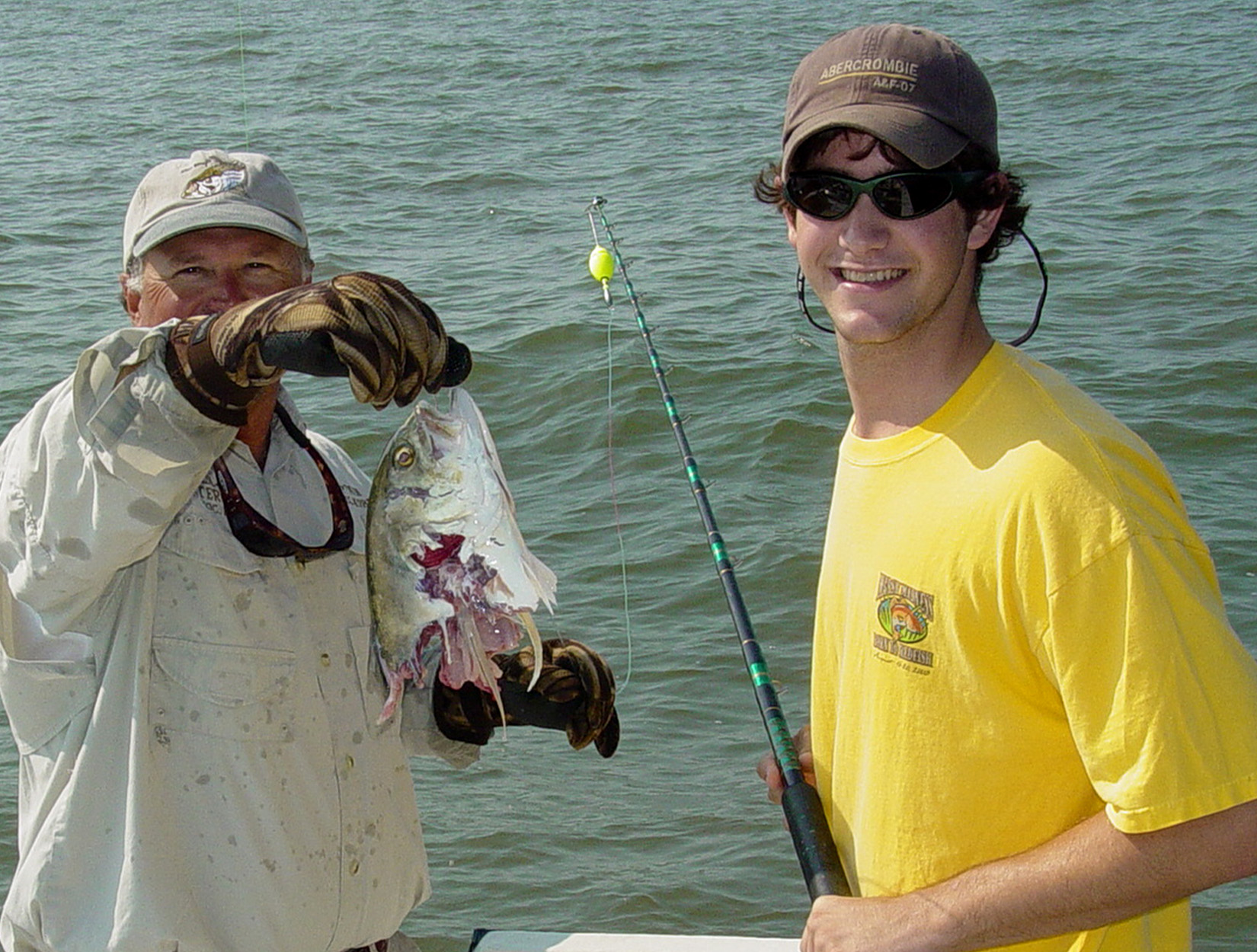
Photo by Bob McNally
The gang worked closer and, when the 4- to 6-foot-long sharks started slamming our hooked trout mere feet from our rod tips, we finally gave up and retreated to a beach. That’s when we looked down at the stringers attached to our wade belts and saw that only the trouts’ heads were left. Those fish were devoured within arm’s reach and we never even felt it.
Prowling the Shallows, Patrolling the Depths
Nearly every charter captain working in the Gulf of Mexico has a story like mine. Captain Mike Frenette fishes around Venice, Louisiana, where the rich waters at the mouth of the Mississippi river draw tremendous schools of shrimp and baitfish, along with a wide assortment of gamefish, including cobia, tuna, dolphin, wahoo, and marlin. This also brings a staggering number of sharks to the area, and Frenette says he’s seeing more of them now than ever before.
“Over the past 10 years I’ve seen a tremendous increase in many shark species,” Frenette tells Outdoor Life . “They’re not only in deep water at the mouth of the Mississippi River, but throughout the shallow waters of the Delta.”
Frenette says he’s seen bull sharks ravaging redfish in water as shallow as two feet. And when he’s fishing for bigger bull reds and tuna in deeper water, encounters with sharks are almost a given.
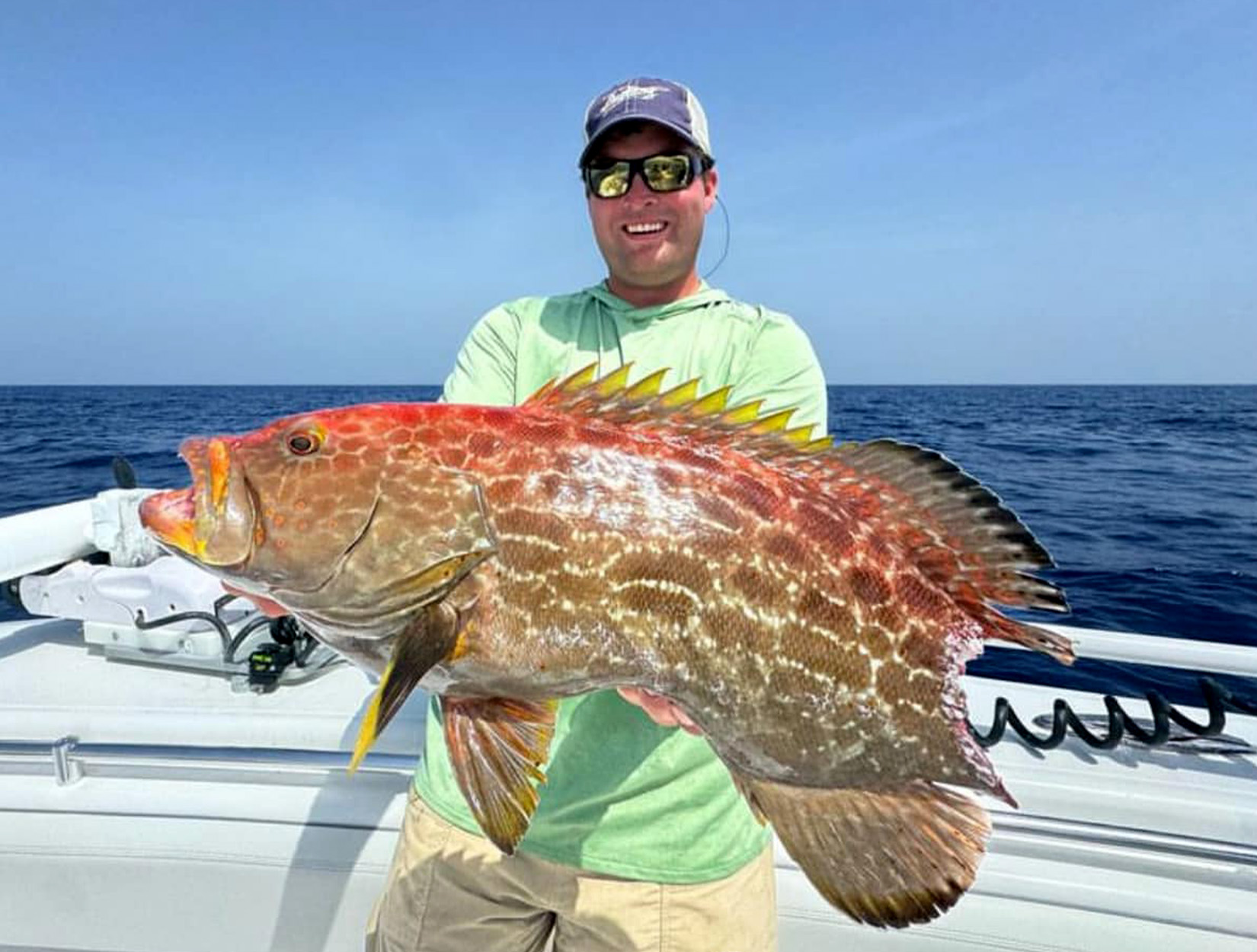
Photo via Facebook
“There are places at the mouth of the Mississippi where giant dusky, bull, and silky sharks attack maybe 80 percent of the yellowfin [tuna] we hook,” Frenette says. “I’ve never seen the number of sharks that we now have in coastal and offshore waters around Louisiana.”
Captains in other states throughout the coastal South will tell you the same. Offshore crews encounter taxmen on a daily basis, and the Florida Keys have about as many sharks as anywhere else in the country. Sharks there see plenty of anglers, so it doesn’t take them long to associate fishing boats with free meals.
“The sharks roaming ledges and reefs are trained to come to fishing boats and hang there waiting for an easy meal,” says Capt. Joel Brandenburg, who runs Ana Banana Charter Fishing in Marathon, Florida. “Feeding sharks with the fish we hook is an everyday occurrence for me and just about every other charter captain I know in the Florida Keys.”
Spoiling Tournaments and Eating World Records
Sharks eating hooked gamefish is bad news whenever it occurs, but there are times when it’s especially problematic — both for anglers and the resource itself. On Friday, for example, Florida held a one-day season for Atlantic snapper, with a NOAA-dictated limit of one fish per angler due to the Fed’s concerns over fish populations.
Legions of sport anglers loaded their boats with fuel, ice, tackle, and friends, and then headed offshore in the hopes of landing a single large snapper per person. Fishing was exceptional by most accounts, but sharks took a murderous toll, according to many local anglers.
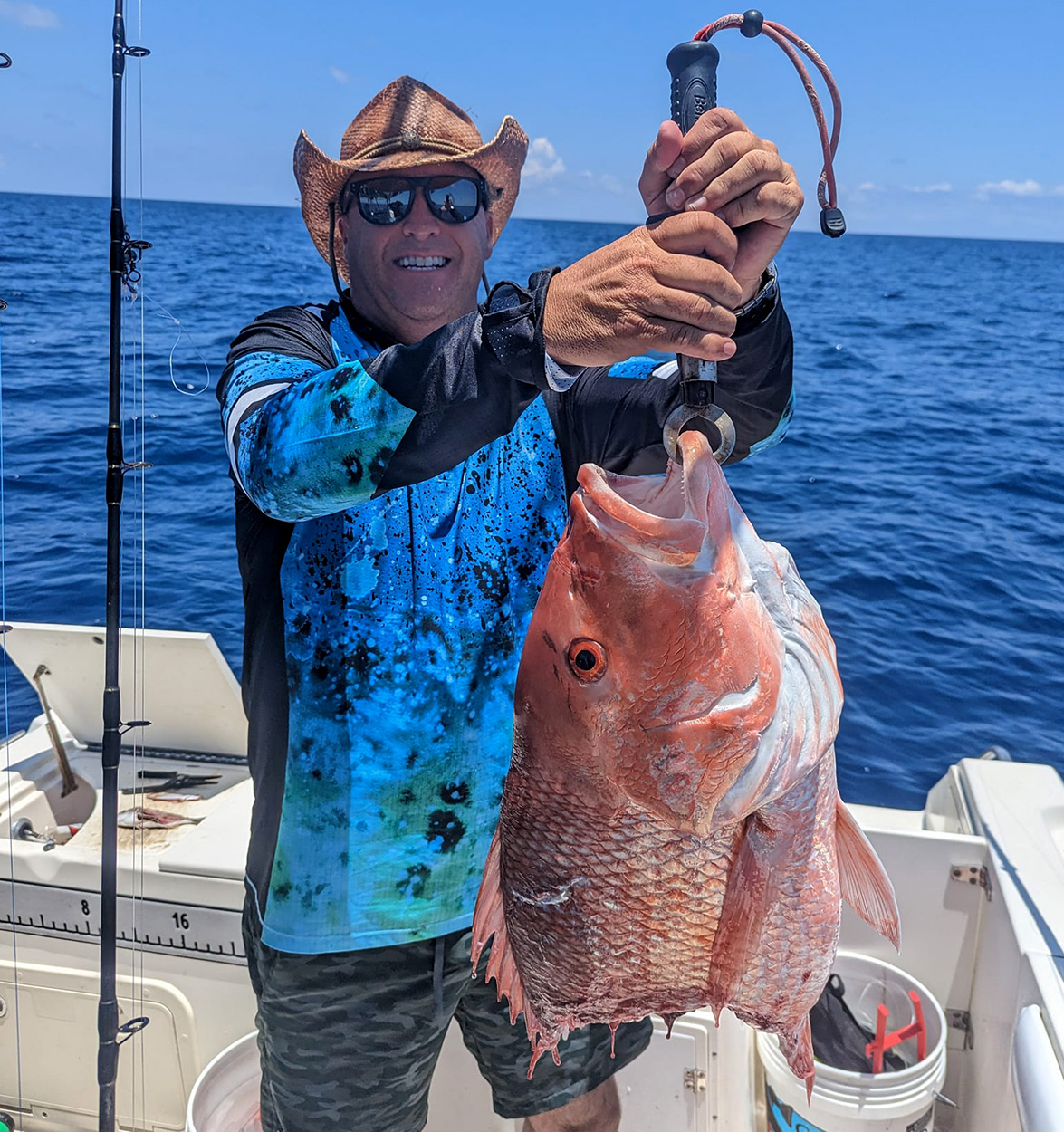
“I’d bet my last dollar that everyone who fished off northeast Florida during that one-day snapper season had big trouble boating their hooked snapper, triggerfish, or grouper,” says Capt. Danny Patrick, a longtime offshore angler who fishes out of Jacksonville.
It’s doubtful whether any of those stolen fish would have broken records, but that exact scenario played out in July 2023, when Florida charter captain Daniel Delph watched a client lose what could have been a world-record snapper to sharks . They were fishing near the Dry Tortugas, 75 miles off Key West, when the angler hooked a heavy fish some 300 feet down. Sharks got to the snapper immediately, and by the time the angler reeled in the fish, the only thing left was a massive red head.
Read Next: Shark Eats What Could Have Been the New World-Record Red Snapper
“Our best guess was that fish whole and intact was about 55 pounds,” Delph says. “It likely would have been an IGFA all-tackle record for red snapper, which is just over 50 pounds.”
Delph says he remembers having troubles with sharks back in the 80s, 90s, and early aughts. But he explains that today, the problem is twice as bad as it was back then, and he’ll often have to move areas or target a different species when the taxmen move in.
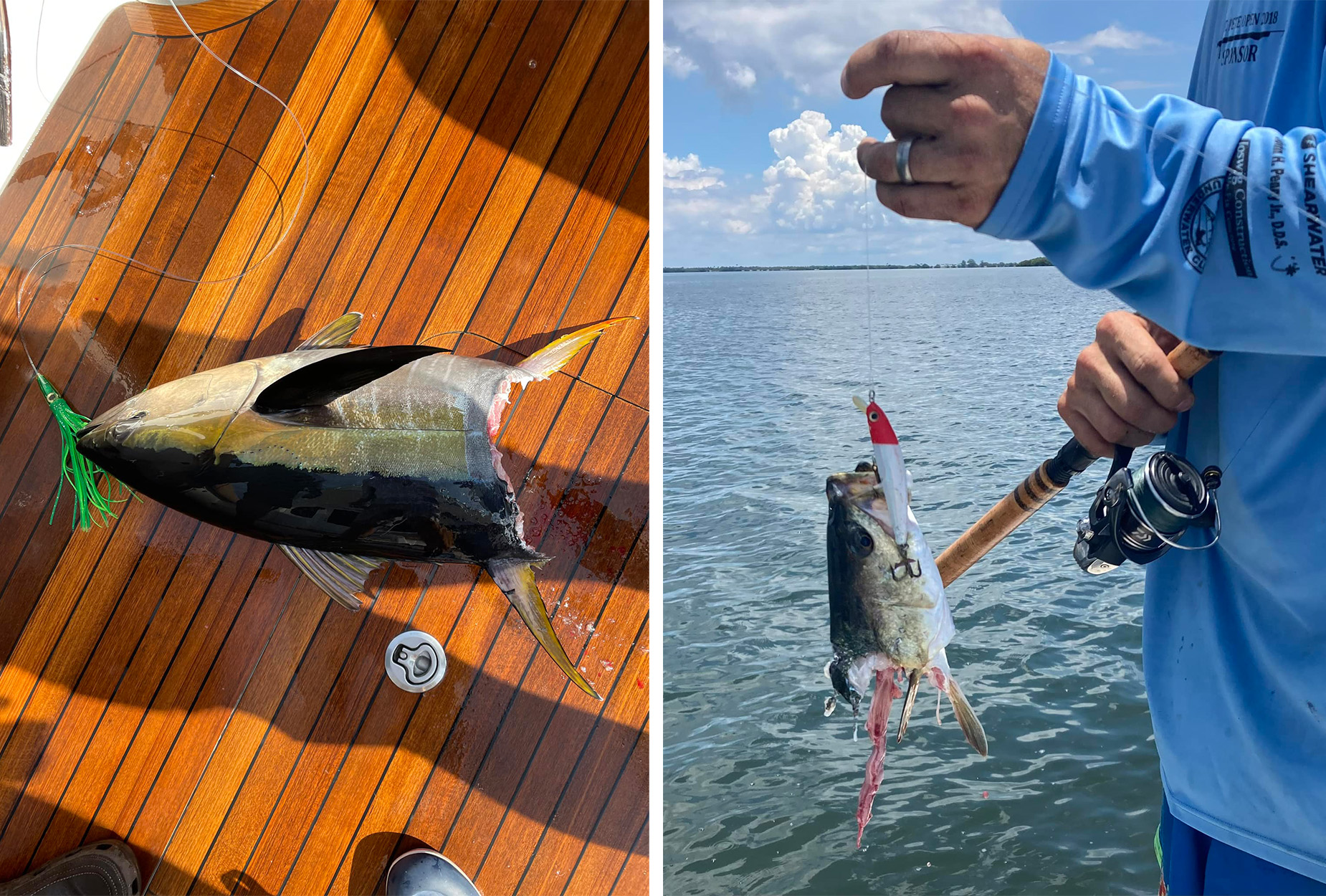
Photos via Facebook
“We work hard to avoid sharks,” he says. “We never anchor, and we never fish more than 10 or 15 minutes in one spot. We have to constantly move around to avoid them.”
Some anglers have even lost money to the pesky predators. Sharks are a constant presence at most fishing tournaments, and the 65 th annual Big Rock Blue Marlin tournament out of Morehead City, North Carolina, was no exception. In June 2023, a team of anglers competing in the tourney got the disappointment of their fishing lives when they weighed what would have been the largest marlin caught at the event.
That 619.4-pound blue marlin would have brought them a $3.5 million payout. But tournament officials noticed a shark bite near the fish’s head, which automatically disqualified it .
Is It Time to Change Shark Management?
Sharks have inhabited the oceans for much longer than we’ve been fishing with rods and reels, and fishermen have always had to pay the taxman on occasion. But many of those anglers will tell you that the problem has gotten particularly bad in recent decades as several laws protecting sharks from harvest have been enacted.
These regulations were made, in part, to balance out the negative perceptions that people held about sharks, and to stem the demand for shark fins abroad. Now, some anglers believe the restrictions have gone too far by replacing scientific management with protectionist ideologies. They say that shark populations have gotten out of control in the absence of pressure, and they’d like to see increased of harvest of certain species — especially bull sharks, which are one of the three shark species most likely to attack a human, though attacks remain statistically rare.
“It doesn’t matter where you are, sharks are everywhere,” Delph says. “So many people think [all] sharks are endangered, but that’s not the case. It’s just so frustrating because it’s devastating to our marine fisheries.”
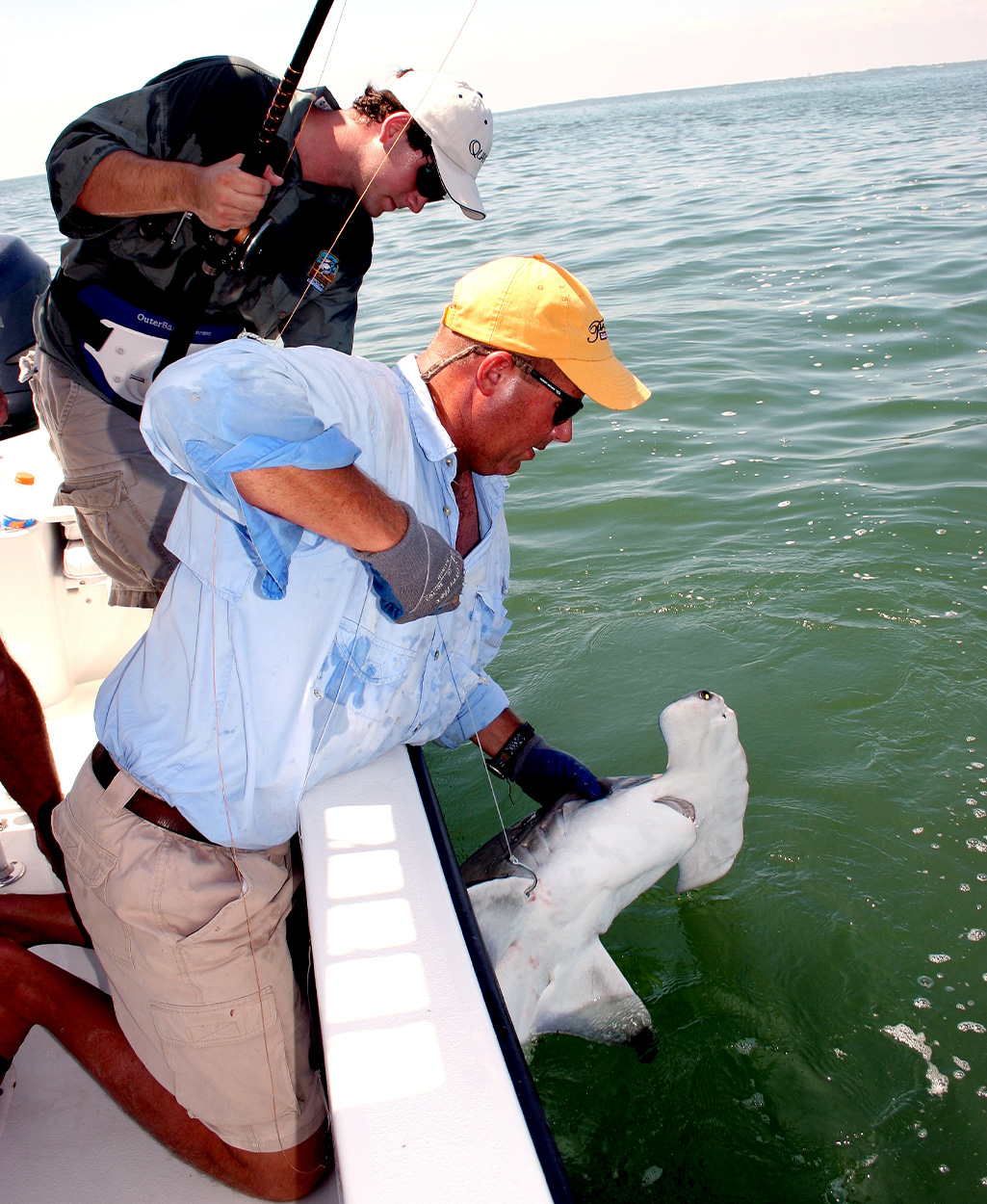
Sharks are notorious for eating hooked tarpon, another world-renowned game fish that’s a conservation priority in many states. As a result, these fish are almost always released, but that doesn’t mean they always swim way.
Read Next: Great White Shark Tales from Cape Cod’s Charter Boat Captains
“The biggest threat to my charter fishing is when sharks attack tarpon [caught] my clients,” says Capt. Ray Markham, who fishes out of St. Petersburg and has a background in marine biology. “Every year sharks follow the northward tarpon migration. I see guys in waist deep water holding their tarpon for a photo. You won’t catch me in there because I’ve seen 15-foot sharks — hammerheads, bulls, and others — that’ll take a tarpon out of your hand when you’re trying to unhook and release the fish.”
Another longtime and respected Florida guide, Capt. Lenny Moffo remembers holding an estimated 100-pound tarpon boat side one time so his client could get a photo. Moffo pulled the tarpon’s head up as the picture was snapped, but as soon as he released the fish there was an explosion of water, blood, and scales as a shark devoured the trophy fish.
I can remember one outing near the mouth of Charlotte Harbor, when two friends and I experienced some of the best tarpon fishing of our lives, catching 13 tarpon that weighed between 50 to 150 pounds. After losing four of those huge tarpon to taxmen, we quit fishing for the day, not wanting to feed any more quality gamefish to the big hammerheads and bull sharks that were lying in wait.
Latest in Saltwater Fishing
How to catch saltwater ‘panfish’ on your family vacation how to catch saltwater ‘panfish’ on your family vacation.
By Joe Cermele
I Fought an 11-Foot Swordfish Solo from My 17-Foot Boat I Fought an 11-Foot Swordfish Solo from My 17-Foot Boat
By Larry Litvinoff as told to Earl Gustkey
Dave Portnoy rescued by Coast Guard after drifting out to sea: 'Almost lost Captain Dave'
"captain dave may never go on the boat again," said portnoy..

Barstool Sports' owner and founder Dave Portnoy was rescued by the U.S. Coast Guard after losing control of his boat off the Massachusetts' coast.
"You boys almost lost Captain Dave today," said Portnoy in a TikTok video he posted explaining what happened. "Captain Dave almost was lost to the ocean."
On Monday, Portnoy took his mother out on a boat ride off the coast of Nantucket, he said. Portnoy did not try to turn on the boat before unhooking it from the from the buoys. He drifted out and attempted to turn on the boat only to find that the boat had no power.
Content warning: Video below contains language that is not suitable for all audiences .
The boat had no power, radio or anchor and there were heavy winds which caused him to drift out to sea, Portnoy explained.
"Next thing you know, Captain Dave is lost at sea," said Portnoy.
The Barstool founder began screaming for help as he sailed, and shot a distress signal from a flare gun he kept onboard the boat.
Coast Guard rescues Portnoy
According to Portnoy, a woman "in what looks like a rowboat," boarded his boat and asked if they can make a TikTok together, said Portnoy. He declined her request and then used her radio to contact the Coast Guard.
The Coast Guard made it to Portnoy's location where they tied up his boat and towed it back.
This was Portnoy's third, and possibly last time captaining a boat.
"Captain Dave may never go on the boat again," he said.
USA TODAY reached out to the Coast Guard for comment.
Julia is a trending reporter for USA TODAY. She has covered various topics, from local businesses and government in her hometown, Miami, to tech and pop culture. You can reach her at [email protected], connect with her on LinkedIn or follow her on X, formerly Twitter , Instagram and TikTok : @juliamariegz
- Search Please fill out this field.
- Manage Your Subscription
- Give a Gift Subscription
- Newsletters
- Sweepstakes
:max_bytes(150000):strip_icc():format(webp)/Kamala-Harris-tout-052723-f15b6b5971554b31bdc49b98182f9ff8.jpg)
- Human Interest
- Human Interest News
Dave Portnoy Recalls Dramatic U.S. Coast Guard Boat Rescue: I Was 'Tom Hanks in Castaway '
The Barstool Sports founder shared new details about his recent ordeal on the water, which took place off the coast of Nantucket, Mass.
:max_bytes(150000):strip_icc():format(webp)/marinawattsslackpic-8014169009b44b87b414b8639a6845f3.jpeg)
Gotham/GC Images; BFFs: Dave Portnoy, Josh Richards & Bri Chickenfry/Youtube
Dave Portnoy 's experience adrift at sea was more harrowing than he first let on.
In the July 17 episode of BFFs: Dave Portnoy, Josh Richards and Bri Chickenfry , Portnoy, 47, recounted his misadventure on the water , fittingly seated in front of a sign that says "don't give up the ship," and wearing a captain's hat.
As the story goes, his parents were visiting and his mom wanted to see his boat.
“Captain Dave unhooked himself to the buoy before he turned the boat on to make sure the boat wasn’t dead. Well no power, no radio, no anchor, no nothing. Heavy heavy winds," Portnoy shared in a video on X (formerly Twitter) following the incident. He elaborated on the situation more during the BFFs episode, recalling that he hadn't brought his cell phone with him since he figured he would be right back.
Portnoy said the boat, a 24-foot Boston Whaler, likely "broke free" from the buoy, resulting in the aforementioned heavy winds drifting the vessel into the middle of Nantucket Harbor and leaving him pushing off of other boats on the water to avoid collisions.
BFFs: Dave Portnoy, Josh Richards & Bri Chickenfry/Youtube
After setting off his flare gun to signal distress, a girl in a dinghy approached his vessel and climbed aboard. When she realized who he was, she apparently said that she wished she had her phone to make a TikTok, but Portnoy mentioned he was thrilled she didn't.
At that point, the media personality said he felt like "Tom Hanks in Castaway ." Luckily, the girl on the dinghy had a radio and called the Coast Guard.
"The Coast Guard showed up and wheeled me in" he recounted. Meanwhile, his parents were waving at him from the shore, unsure of what was happening.
Portnoy also gave some context about his boating experience. "It's my third time on this boat. I'm not like, this crazy boat-savvy guy," he explained. As the Barstool Sports founder and the boat drifted out further from the harbor, he claimed the water got rocky and he didn't know how to "do the anchor" to stop the boat from moving.
Never miss a story — sign up for PEOPLE's free daily newsletter to stay up-to-date on the best of what PEOPLE has to offer, from celebrity news to compelling human interest stories.
Dave Portnoy/Instagram
"Literally in my head, I'm like, if this thing makes it out of the harbor," he recalled. "Which, it looked like it was gonna... I may have to abandon ship."
"It was f------ crazy," he concluded, adding that he sent a "strongly-worded" text to the people who sold him the boat.
He also thanked the Coast Guard once more for their rescue. "Thank you to the Coast Guard who served the country bravely and performed that rescue. It was a harrowing day on the high seas for me."
Related Articles
latest in US News

Democrats raise $46.7 million hours after Biden drops out, backs...

Teen shot by homeowner after targeting house in ding-dong-ditch...

NY Dems are already lining up behind Kamala Harris to replace...

Travis Barker runs 5k alongside fans ahead of Blink 182's Sunday...

Sen. Joe Manchin mulls rejoining Dems to run against Harris after...

Top congressional Dems praise Biden for stepping aside -- but...

Ex-FDNY boss during 9/11 says Commissioner Laura Kavanagh was...

Liberal media goes into meltdown mode after Biden drops out: Van...
Live updates, dave portnoy rescued by coast guard after boat goes adrift off nantucket: ‘we almost lost captain dave’.
- View Author Archive
- Get author RSS feed
Thanks for contacting us. We've received your submission.
Barstool Sports founder Dave Portnoy and his mom had to be rescued by the US Coast Guard Monday after his boat suddenly lost power and went adrift off Nantucket.
“Your boys almost lost Captain Dave today,” the 47-year-old revealed in a video posted on social media.
The sea saga unfolded after Portnoy said he unhooked his 28-foot boat from a dock in one of the exclusive Massachusetts vacation island’s harbors — only to realize the vessel’s engine and breakers were dead.

“No power, no radio, no anchor, no nothing; heavy, heavy winds,” he recalled in the two-minute clip. “Next thing you know, Captain Dave is lost at sea.”
After trying to navigate his boat through the crowded harbor, Portnoy — who last year shelled out a staggering $42 million for a waterfront property on the island — said he screamed for help and eventually fired a flare gun to attract attention.
Eventually, a female who was sailing nearby noticed him and boarded his boat.
“She boards Captain Dave’s vessel. She said, ‘Can I make a TikTok of you?’ I said, ‘No time for TikToks,'” he said.

The woman then radioed the Coast Guard for help, Portnoy revealed.
Coast Guard members who were conducting a training exercise nearby helped tow his boat back to land.
“Captain Dave lives to tell another tale,” Portnoy said as he thanked the agency.
The Boston-based First Coast Guard District later responded to Portnoy’s video, tweeting : “You’re welcome, Dave.”
“Tell Miss Peaches we said hi and remember to boat safe!” the agency added, referring to Portnoy’s 6-year-old American pit bull rescue.
Meanwhile, Portnoy claimed he may have second thoughts about going back out on his boat again.
“It’s a dangerous game, the sea’s angry, my friends,” he said. “Captain Dave may never go in the boat again.”

Advertisement
'Beyond frustrated': Families of Conception boat fire victims await justice
A federal judge is expected to rule july 29 on whether jerry boylan can remain free during his appeal and on how much he will pay in restitution..

The captain of the dive boat that caught fire near Santa Cruz Island in 2019 could begin serving a prison sentence soon for his role in the deaths of 34 people on board.
Jerry Boylan, now 70, was convicted last year of one count of an offense known under maritime law as “seaman’s manslaughter” and sentenced in May to four years in federal prison . He had originally been charged with 34 such counts , but prosecutors reduced the charges to one count after Boylan’s lawyers argued that the case should be treated as just one incident.
Boylan has yet to serve any of his sentence, and he was free on bail throughout his trial. He has already filed an appeal of his conviction, and his lawyers have asked U.S. District Court Judge George Wu to allow Boylan to remain out of prison during the appeal. Wu plans to issue a ruling on that matter on July 29.
Wu also plans to rule on July 29 on how much restitution Boylan will have to pay to the families of people who died on board the Conception.
The Conception was a dive boat owned by a Santa Barbara company called Truth Aquatics. On a Labor Day weekend trip to the Channel Islands in 2019, the boat caught fire in the middle of the night.
According to an investigation by the National Transportation Safety Board , Boylan and his crew neglected basic safety procedures, such as keeping someone on night watch. All six crew members were asleep when the fire started. Boylan and four others escaped by jumping overboard, while one crew member and all 33 passengers died.
One of the passengers was Kendra Chan, 26, an Oxnard resident and a wildlife biologist in Ventura with the U.S. Fish and Wildlife Service. She was on a diving trip with her father, Raymond "Scott" Chan, who also died on board the Conception.
Kendra Chan’s mother, Vicki Moore of Los Altos, said the pace of the legal process has been "beyond frustrating."
It's been nearly five years since the fire, and attorneys have said Boylan's appeal could take another two years. Moore and others who lost loved ones in the fire would like to see Boylan behind bars during the appeal.
"That would make it seven years of him living his life, while we have to live with this loss every single day of our lives," Moore said. "The mental and emotional anguish that continues on, as this case appears never to end ... it's excruciating. It seems there is no regard whatsoever for the impact this type of prolonged process has on the families."
Moore said she feels the four-year sentence wasn't enough. Under the law, Wu could have sentenced Boylan to as much as 10 years.
"I want justice to be served, justice and deterrence, and I felt the sentence needed to be strong enough to act as a deterrent," Moore said.
The federal public defenders who represent Boylan did not reply to a request for comment. In a motion asking him to remain free during the appeal, they said his appeal will revolve around questions about the instructions given to the jury, and their options to choose a lesser crime rather than felony seaman's manslaughter.
Boylan's attorneys argued that he should be eligible for bail during the appeal because he is not likely to flee, and because his appeal, if it succeeds, is likely to result in a reversal of the conviction or a new trial. The appeal process might go on so long that Boylan could serve his entire prison sentence before it ends, his attorneys stated in their motion.
Federal prosecutors in their own motion said that Boylan should go to prison while he appeals, saying he has not proved that he isn't a flight risk now that he's been convicted, and his appeal appears to have been filed "for the purpose of delay" and is not likely to result in an overturned conviction or sentence.
If Wu decides on July 29 that Boylan should start serving his sentence, he would have to report to the Federal Bureau of Prisons by Aug. 8.
On the restitution to families, Moore said she did not file any requests for restitution and doesn't expect any payments from Boylan to amount to much, as he doesn't appear to have much in the way of assets. The victims' families are also pursuing civil lawsuits against the owners of Truth Aquatics, Glen and Dana Fritzler.
Tony Biasotti is an investigative and watchdog reporter for the Ventura County Star. Reach him at [email protected] . This story was made possible by a grant from the Ventura County Community Foundation's Fund to Support Local Journalism.

IMAGES
VIDEO
COMMENTS
The captain must hold a license that is commensurate with the gross tonnage of the vessel and approved by the flag state. In addition, the yacht's insurance company needs to be comfortable with the candidate's experience and license and approve the hire. This is understandable when you consider that the underwriter is the biggest financial ...
The Basics of a Captain's License. A first time applicant will need to decide while type of license to pursue. There are two types available to one applying for a new license. You may apply for a license to be an Operator of Uninspected Passenger Vessel (OUPV) or the more familiar "Six Pack" license.
Roles and Responsibilities of a Yacht Captain. The job of a Yacht Captain can be compared to that of a CEO, CFO, and COO of a large corporation. The responsibilities are huge. On a smaller vessel of 35m or less, the captain will need to be more hands-on, and they will likely also be the engineer of the vessel.
2. Spend additional time training on a boat. Even though you only need 360 days of sea-time to get your license, if you want an actual job as a captain, you will usually need at least three to four years of professional experience. This experience should be directly related to the operations and management of a ship.
The salary of a yacht captain depends on several factors, including the years of experience, the size of the vessel, and the duration of the contract. Generally speaking, the low end of the salary is approximately $5000 per month and the high end exceeds $18.000 per month. For more information, check this resource.
As a rule, the smaller the yacht, the more hands-on the Captain must be. The larger the yacht, the more administrative duties the Captain will hold. A superyacht Captain specialises in commanding and managing luxury yachts over 24 metres in length. Every crew member falls under the ultimate command of the Captain and will answer to him/her.
The skills of a successful yacht Captain include: Excellent leadership, management and diplomacy skills. Excellent yacht handling and navigation. Ability to stay calm in difficult situations. Good grasp of finance and legislation. Excellent communication and interpersonal skills. Organisation and administration skills.
Day Skipper. This skipper's license will qualify you to captain a sailboat at sea in local waters from sunrise to sunset. Local waters are defined as 15 nautical miles, or 25 miles, from your home port, given that they are no more than 15 nautical miles from an approved safe haven. Local Waters Skipper.
The tips depend on the size of the Yacht and the guests, but a good estimate is 10 - 20% of the total weekly price of a Yacht. If you imagine a 50m (165 foot) Yacht with 9 crew, it typically charters for $150,000 - $250,000 per week. For simplicity, let's add a 15% tip for $200,000/wk.
Yacht Captain Job Description. The Yacht Captain is responsible for the total operation of the yacht. The position ranges from being in charge of a full-time staff of one to being the CEO of a large operation with many departments, personnel, and a large budget. The Yacht Captain is the navigator, and as such is responsible for the safety of ...
About the Captain The captain onboard a yacht has a record of longevity, excellent owner references and strong crew management skills. This individual should possess working knowledge of yacht management and safety in addition to financial administration. The captain will excel in planning and communicating various itineraries to the owners and ...
The captain works directly with the owner and owner's representative, if the captain is not also acting as the representative. On an organization chart, the Captain is usually placed in the deck division, but the Captain is always the senior-most crew on the yacht and all division heads report to the Captain. Responsibilities include:
Being a yacht captain requires strong communication, leadership, and problem-solving skills due to the nature of the role: Communication: The captain must effectively communicate with the crew, guests, and other stakeholders. Clear communication ensures smooth operations, fosters teamwork, and promotes safety on board.
The full process takes about three months in order to do all the paperwork, and then you have your license for five years. A registered day on the water is a day of four hours or more on the water in a position that requires you to actually be using the boat. And the person who owns the boat or the captain of the boat has to sign off on that day.
This allows you to operate a vessel of 100 tons or less with as many as 6 paying passengers on board. For that reasons, it's often referred to as the "6-pack license.". To get your license, you need two things: time and knowledge. "Time" means logging experience on the water. This means you need to have a record of your time spent on ...
A yacht captain should possess a series of soft and hard skills to be successful in the role. These are some of the most important skills a yacht captain will require: Great leadership skills. Managerial skills. Navigational and yacht handling skills. Organisational and administration skills.
The captain must have at least 360 days of service on any vessel. A separate exam can be taken to qualify for a tow boat assistance license. Job opportunities for charter boat captains include: Join a boat sharing company, such as Boatsetter, and captain fishing charters and sightseeing tours
Captain. 100 ft - 170 ft. $84,000 - $180,000. Junior Captain. 60 ft - 100 ft. $48,000 - $98,000. Additional parts of the salary package include bonuses, health insurance, flight expenses, paid vacation, training and certification cost reimbursement, and uniforms.
Sailing, navigation, weather, dealing with law and crew are just part of the requirements of being a captain. Being able to work on boat systems is a VERY attractive quality in hiring anyone from a deck hand to a delivery captain. There's a really comprehensive cool book called How to Make Money From a Boat: 50 Businesses Run From A Yacht ...
A captain's license is necessary to safely and legally operate a yacht of any size. It is important to note that the captain's license is not the same as a recreational boating license, and it is important to understand the difference between the two. In conclusion, the minimum size of a yacht requiring a captain's license is 25 gross tons.
The question of how to be a yacht captain cannot be answered without consideration for the mountain of courses for yacht crew, which must be taken in order t...
The next consideration is experience. "You'll probably want a professional who's familiar with the type of boat you own as well as the area you'll be cruising in," says Connor. "If you plan to run the boat in the Med, you'll want a captain who knows those waters. If your yacht has Arneson drives, you'll want an engineer whose ...
Captain Ken Gibson. Captain Ken Gibson has seen it all. Since 1981 when he first got his captain's license, Ken has been both a captain for private owners setting out on month-long voyages to tropical destinations and for charter yachts earning income as a business. Ken has over 1 million miles on the water. He is currently in charge of a 136 ...
🔥Live Podcast Alert 🔥Scott Kidd has over 25 years of maritime experience, including new builds, refits, project management and yacht management.He is a lic...
If you want to captain the boat yourself, almost all outfits require some kind of proof of sailing or boating experience, often in line with local regulations. Edward King, 45, an executive at a ...
Read Next: Great White Shark Tales from Cape Cod's Charter Boat Captains "The biggest threat to my charter fishing is when sharks attack tarpon [caught] my clients," says Capt. Ray Markham, who fishes out of St. Petersburg and has a background in marine biology. "Every year sharks follow the northward tarpon migration.
The boat had no power, radio or anchor and there were heavy winds which caused him to drift out to sea, Portnoy explained. "Next thing you know, Captain Dave is lost at sea," said Portnoy.
"Captain Dave unhooked himself to the buoy before he turned the boat on to make sure the boat wasn't dead. Well no power, no radio, no anchor, no nothing.
Portnoy said he unhooked his 28-foot boat from a dock in one of the exclusive Massachusetts vacation island's harbors — only to realize the vessel's engine and breakers were dead.
The captain of the dive boat that caught fire near Santa Cruz Island in 2019 could begin serving a prison sentence soon for his role in the deaths of 34 people on board. Jerry Boylan, now 70, was ...